INSTITUTE FOR EUROPEAN STUDIES
ANNUAL REPORT 2023
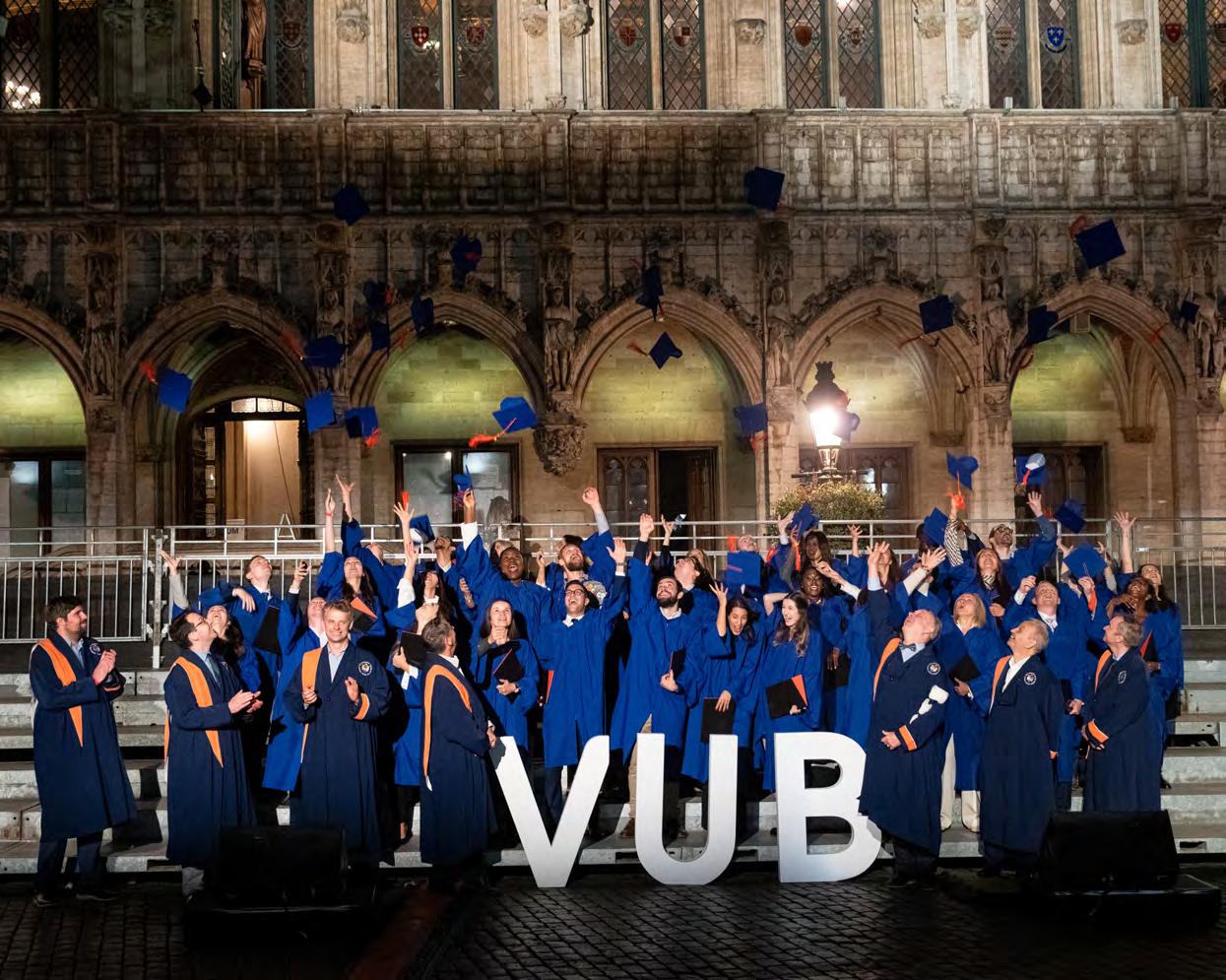


MISSION STATEMENT*
Situated in the heart of Europe, we strive to be a hub for interdisciplinary teaching and cuttingedge research. Our purpose is to understand and help tackle key societal dynamics and challenges. We focus on migration and diversity, the digital transformation of society, climate change and green transitions in the economy, as well as diplomacy, strategy and geopolitical competition. We educate open-minded students and connect to policymakers and societal actors interested in a research-informed understanding of Europe in a changing world.
* Since February 2021, the Institute for European Studies (IES) is part of the Brussels School of Governance (BSoG) alliance. Hence, in this publication, the Institute for European Studies is sometimes referred to as Brussels School of Governance or BSoG.
Institute for European Studies Annual Report 2023 3
Introduction 4 Executive Summary 6 Highlights 10 Research Portfolio 16 • Research - Strategic goals 17 • List of PhD bursary projects 19 • List of externally funded projects 22 • Centre for Environment, 40 Economy and Energy • Centre for Digitalisation, 42 Democracy and Innovation • Centre for Security, Diplomacy 44 and Strategy • Centre for Migration, Diversity 46 and Justice Teaching Portfolio 48 • Strategic goals 49 • LLM in International and 51 European Law • MSc in European Integration 56 (Euromaster) • Postgraduate Certificate in EU 60 Policy-Making • Summer School on EU 62 Policy-Making • Winter School on EU 64 Policy-Making • Office for Teaching and 66 Learning Innovation • Completed PhD projects 67 Publications 72 • Policy Briefs 74 IES in the Media 79 • Media Appearances in 2023 80 Academic Services 83 • IES Public Events in 2023 84 • IES Research Colloquia in 2023 87 Management 88 • Structure and Management 89 Outreach 92 Collaboration 94 • Academic Collaboration 95 Personnel 105 • Personnel Management 106 Quality Assurance 110 Financial Report 114 Annex: List of publications 117
CONTENTS
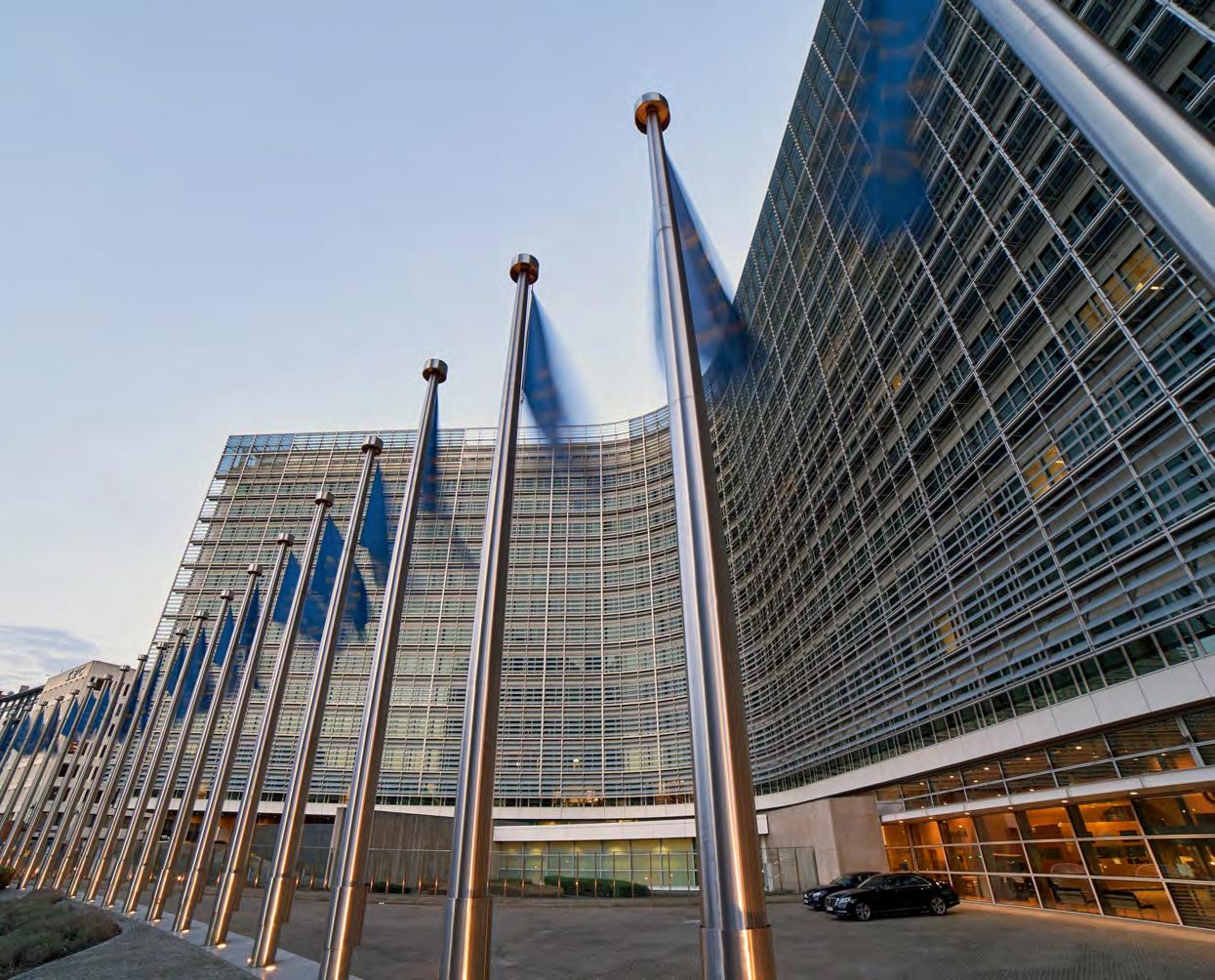
INTRODUCTION
MESSAGE FROM THE PRESIDENT
Relevance. The Institute for European Studies of the VUB does not strive to be bigger, more performant or qualitatively better; it strives to be relevant. Relevant in the current European and international debates that define our future: climate change, migration, digitalisation and security. Relevant for our students, our researchers, but also for the broader policy community and the general interest. In a world that is increasingly consumed by polarisation, it is necessary more than ever to provide clarity and perspective, to provide a broader scope in matters where the balance seems lost, and to give factbased evidence in fields that seem overwhelmed by blind beliefs or ‘alternative truths’. In this case, the adagio by the famous French enlightenment scientist and philosopher Poincaré that inspires our university remains at the core of our activities: “Thinking must never be subjugate, neither to a dogma, nor to a party, nor to a passion, nor to an interest, nor to a prejudice, nor to anything, but only to the facts themselves, for making it subjugate means the end of all thinking”. As the world today may benefit from some enlightenment, we humbly strive to add a little bit of light by providing research and teaching that can be relevant in times that are seemingly getting darker.
And this we did. With more than 60 public events in the past year, a flagship international EUIA conference that has become the reference in its field, more than 180 top publications in national and international journals, countless media appearances, and over 80 projects (of which two ERCs), the IES is relevant, and its many scholars and collaborators excelled by producing output that matters.
The past year, the IES has nonetheless also become bigger, more performant and qualitatively better. It now hosts more than 125 staff members and is home to over 100 postgraduate and more than 25 PhD students. Via a thorough modernisation of our educational portfolio, started in 2023, we aim to double the former number over time.
That is not to say that we haven’t had any challenges over the past year. We were happy to welcome new scholars but were also sad to see some of them go to retire or to further their career elsewhere. In this respect, I want to pay tribute to Luc Soete, who steered our Institute as Dean over the past four years, and who announced his retirement from this office at the end of 2023. With Florian Trauner as a new dynamic Dean in place, we are confident that the future of the Institute is in good hands. We will nevertheless always remember the charismatic leadership of Luc who, I am sure, will continue to play an inspirational role in the IES and the university at large.
With a renewed Board and a strengthened team, I am glad and honoured to preside over an IES that stands strong to continue to be relevant in the future.
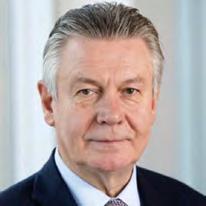 Karel De Gucht President
Karel De Gucht President
Institute for European Studies Annual Report 2023 5

EXECUTIVE SUMMARY
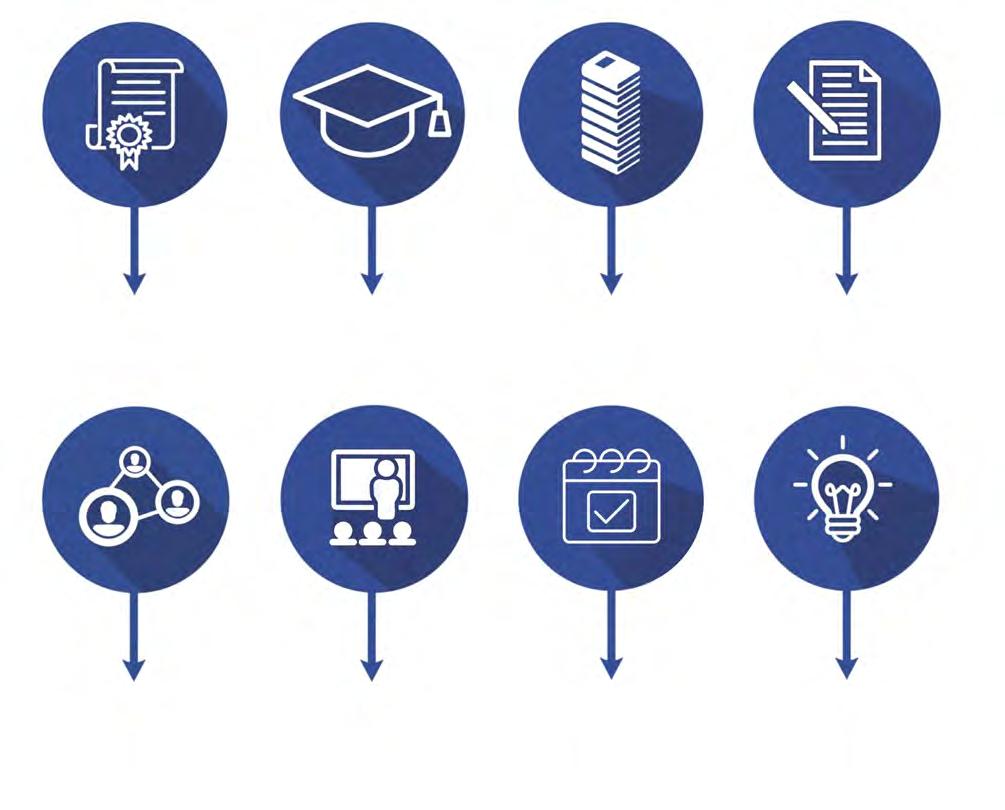
Institute for European Studies Annual Report 2023 7 EXECUTIVE SUMMARY 5 PhD Diplomas 35 Master Graduates 186 Publications 37 Policy Briefs 125 Staff Members 13 Research Colloquia 64 Public Events 27 Own Projects 57 External Projects
EXECUTIVE SUMMARY
For the Institute for European Studies, 2023 has been a year of milestones. Not only did we award our first ever Doctor Honoris Causa (to the Korean Ambassador Yoon), started a second ERC (with a third one obtained and scheduled to start in 2024), took part in more than 60 externally funded projects and hosted our 8th EUIA (the EU in International Affairs) conference, we also elected a new (vice)Dean and changed half of our Board. Milestones, thus, on both the academic as well as on the operational side.
ACADEMIC MILESTONES
In comparison with 2022, the IES took part in less externally funded research projects, yet these projects became bigger and generated more income. Notably a second ERC project started (worth more than 1 million EUR over 4 years) and a third one was acquired to start in 2024. Overall, 57 externally funded projects (for an aggregated income of more than 3 million EUR) and 27 self-subsidised projects were carried out in 2023. The IES was proud to count 9 Horizon Europe projects, 7 Jean Monnet projects, and more than 10 other EU-funded projects in its portfolio, making the IES one of the most successful European grantees at the VUB. In addition, it continued to work on three special academic “Chairs”: the Korea Chair, the Japan Chair, and the Microsoft Chair on Digital Sovereignty.
Less projects, on the one hand, mean less personnel. Larger projects, on the other hand, mean more personnel. That is why the total number of people involved at the Institute remained stable at 58.43 FTE (as opposed to 58.50 FTE the year before). A “headcount” reveals 125 employees. An additional 51 people were associated with the Institute (39 as an associate fellow and 12 as visiting fellow). 10 different job students helped with basic research and administrative tasks and we welcomed 14 interns.
Our scholars published 186 book chapters, policy briefs and journal articles and were visible to the public at large during a wide range of public debates in Brussels and abroad, not in the least during our successful biannual EUIA conference. IES researchers were also called upon for a high number of recorded national and international media appearances. This is proof that our Institute continues to be of high relevance in the policy and research community and a much sought-after public source for scientific and policy- oriented information.
Our educational portfolio also underwent a very thorough curriculum and organisational change. Starting from the next academic year, our LL.M. programme will shift to an evening programme, allowing for young professionals to join – a request that many voiced in the past years. It will also be better integrated into our overall programme portfolio, allowing for more synergies between research and teaching on the one hand, and between the different programmes on the other hand. The changes were needed to increase the MaNaMa student intake, which was still somewhat at the low side in 2022/23, resulting in a total of 36 advanced master graduates. On the other hand, our postgraduate programme did very well, as did our summer and winter schools.
Institute for European Studies Annual Report 2023 8
EXECUTIVE SUMMARY
Another very positive result is the number of graduated PhD students. In 2023, no less than 5 PhD students successfully defended their thesis. We are proud to welcome Tudor Petru Fabian, Philipp Stutz, Maximilian Ernst, Asma Akbar and Jana Gheuens as new ‘doctors’ in the academic community.
OPERATIONAL MILESTONES
On the operational side, the IES underwent a number of changes. Four Board members retired from their position, and consequently four new Board members took office. Karel De Gucht, who started his third term as President of the IES, will continue to preside over the Board, while the academic head of the Institute, Luc Soete, announced his departure at the end of 2023. Meanwhile, Vice-Dean for Research Alexander Mattelaer refrained from running for a second term, and was replaced by Florian Trauner, who was elected alongside Sven Van Kerckhoven (who starts his second term as Vice-Dean for Education). 2023 marked the first time that these offices were elected in a census that involved all staff members.
We are glad to report that the relations with VUB and Vesalius College continued to flourish. Specific agreements with the university were concluded in the past year, resulting in better support and better integration – a development that was welcomed by both sides. The integration with Vesalius College into the Brussels School of Governance alliance is also improving and proves to be beneficial for both staff and students. However, system differences (VUB-operated systems vs Vesalius-operated systems) and legal constraints form a challenge to optimise the synergies. Yet a shared board, shared management and a shared secretariat optimise efforts, service and costs to a large extent. Relations with our other main partners continued: with UNU-CRIS, discussions led to a new call for projects to be carried out in Bruges; with the Diplomatic Academy in Vienna, we organised our 20th joint summer school, with Warwick University, Egmont and IEE-ULB we organised our 8th EUIA conference, with USC we organised our annual summer programme and with our Japanese and Korean partners we continued the flourishing Japan and Korea Chairs. As part of VUB, the IES also continued its involvement in the European university network EUTOPIA.
Financially, the IES is doing very well. The Institute will close the year with a surplus of more than 460K EUR, another welcome milestone (after a few years of losses) which it will re-invest in new projects. As the profit was primarily the result of profits in research, it will be distributed as reserves for the four research centres. With the reforms carried out in the education field, we are convinced that future results will be equally positive in that department as well.
Institute for European Studies Annual Report 2023 9
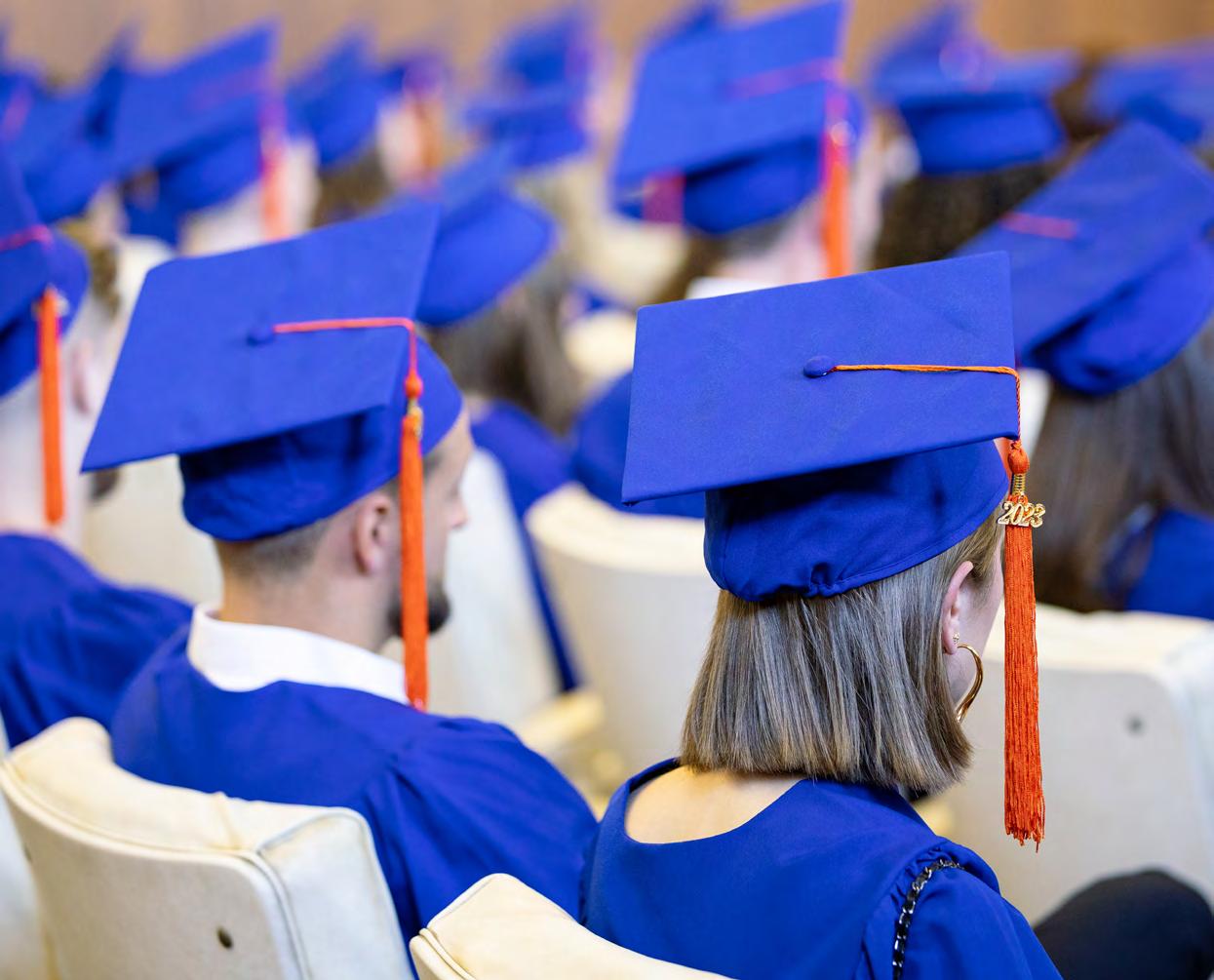
HIGHLIGHTS
HIGHLIGHTS
BSoG CO-ORGANISES MAJOR EU CONFERENCE IN INTERNATIONAL AFFAIRS
From 3 to 5 May 2023, the "European Union in International Affairs" (#EUIA23) conference was a major get-together of academics and officials to discuss the EU’s international role. It featured roughly 400 participants from more than 40 countries for a programme of over 50 academic panels. #EUIA23 also included a keynote lecture by the Chairman of the EU Military Committee; a range of policy-link panels on EU-Africa relations as well as defence cooperation in Europe; and a debate of the editors of leading academic journals in the field of EU foreign policy-making. The Brussels School of Governance is one of the organising partners of the EUIA conference cycle.
EU COMMISSION VICE-PRESIDENT TIMMERMANS’ INTERACTIVE LECTURE
On 30 May 2023, EU Commission First Vice-President Frans Timmermans gave an interactive lecture on VUB campus, organised by the VUB Brussels School of Governance. The lecture was moderated by our LLM student Sarah Jacobs. The introduction to his lecture was provided by BSoG President Karel De Gucht and the concluding remarks by our Dean Luc Soete. The topic of Mr Timmermans’ exposé was 'The external dimension of the “Green Deal”: navigating a changing world'. During his talk, he highlighted the main points and challenges relating to the European Green Deal. This lecture was part of the SUSTAEN lecture series, a Jean Monnet Module focusing on the European narrative about sustainability and trade, managed by Prof. Sven Van Kerckhoven.
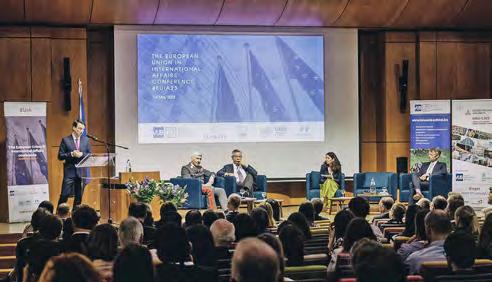

Institute for European Studies Annual Report 2023 11
HIGHLIGHTS
FIVE NEW PHD GRADUATES PROMOTED
2023 was a very fruitful year at the IES-BSoG regarding new PhD degrees. Tudor Petru Fabian, Philipp Stutz, Maximilian Ernst, Asma Akbar and Jana Gheuens all successfully submitted and defended their doctoral thesis. On 24 January 2023, Tudor Petru Fabian was the first in the year to defend his PhD thesis entitled “Networks of Knowledge & Hybrid Interferences: Can the European Union defend its interests in the new era of acute international competition without effective information sharing, collation & analysis capabilities?”. On 27 January 2023, Philipp Stutz successfully defended his PhD thesis entitled: “Unpacking EU Return Migration Policy”. On 27 April 2023, Maximilian Ernst successfully defended his PhD thesis entitled “Why China Coerces AsiaPacific Secondary States: Chinese Balancing Strategies in the Context of the Sino-American Competition”. On Friday 7 July 2023, Asma Akbar successfully defended her PhD thesis on Pakistan’s national security paradigm: a human security analysis. Her defence took place online. And finally, on 20 December 2023, Jana Gheuens successfully defended her PhD thesis entitled “Policymaking for the Future: Evidence from EU Climate Governance”.

TWO BSoG PROFESSORS LISTED IN TOP 20 OF MOST CITED VUB SCHOLARS
Lists and rankings, they come in all shapes and forms. They take into account a multitude of variables so that their outcomes are not always transparent. However, in the forest of rankings that universities find themselves listed in, there is one ‘ranking’ that focuses merely on the impact scientists and universities have in the overall academic community by counting the citations of their professors. In other words, if an article or book is quoted by others, it is seen as an impact factor. Hence the famous AD World Scientist and University Ranking, which released its 2023 outcome in June 2023, one that is particularly positive for our School. Two BSoG professors can count themselves amongst the top 20 VUB professors in this citation index, which encompasses the citations of the past six years: Luk Van Langenhove (ranked 9th in VUB and 399th nation-wide) and Sebastian Oberthür (ranked 14th in VUB and 769th nation-wide). In the field of Social Sciences, they even form the top 2 at university.
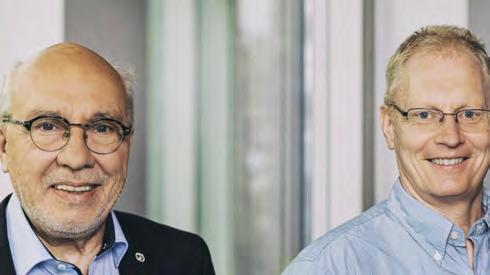
Institute for European Studies Annual Report 2023 12
HIGHLIGHTS
VUB-BSoG AWARDS HONORARY DOCTORATE TO SOONGU YOON
Following the initiative of the Brussels School of Governance, on 26 October 2023, the Vrije Universiteit Brussel awarded an honorary doctorate to Soongu Yoon, Ambassador of the Republic of Korea. He receives this recognition for acting as a pivotal bridge between the European Union and Korea on societal issues such as climate, green energy transition, science, digitisation, health, peace, and security. Furthermore, the ambassador is deeply involved in research on the relationship between the EU and Korea and supports the KF-VUB Korea Chair. The accolade is a fitting tribute within the context of the 60th anniversary of bilateral relations between the EU and Korea, in which Ambassador Soongu Yoon played a vital role.
JONAS LEFEVERE PLAYS KEY ROLE IN DE STEMMING 2023
Following prior editions in 2020, 2021, and 2022, professor Jonas Lefevere of our Centre for Digitalisation, Democracy and Innovation once again collaborated with Stefaan Walgrave (University of Antwerp) to conduct a large scale public opinion survey for VRT NWS and De Standaard. 2092 people filled in the online survey between 13 and 23 March. The survey consists of an annual investigation of Flemish people’s political views, including their voting behaviour, evaluation of government performance, and views on political issues. It also addresses several contemporary issues, which this year included household finances in the light of recent inflation peaks.
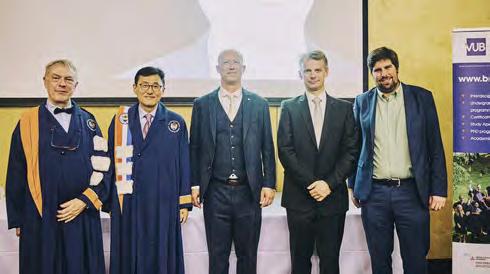

Institute for European Studies Annual Report 2023 13
HIGHLIGHTS
CD2I CENTRE LAUNCHES NEW EU DIGITALISATION SPECIALISATION IN EUROMASTER
As the BSoG celebrated 20 years of excellence in its Advanced Master in European Integration programme (‘EuroMaster’), we introduced in 2023 a new 'Digitalisation and Europe' specialisation, focusing on EU digitalisation policy. This specialisation is a fifth one that students can choose from. The new and innovative specialisation is a Jean Monnet Module that was offered for the first time in academic year 2023-2024. It offers students the opportunity to delve into European Digital Sovereignty in a rapidly evolving geopolitical landscape. In line with the BSoG’s close connection between its research and education activities, the specialisation is linked to BSoG’s Centre for Digitalisation, Democracy and Innovation (CD2I) and was launched during a dedicated event at the Microsoft Innovation Centre in Brussels.
3E CENTRE’S GREENDEAL-NET LAUNCHES PODCAST SERIES
Ever since the von der Leyen Commission launched the European Green Deal, European climate policy went into overdrive, and it seems like every week there is a new initiative. To help our stakeholders navigate, understand and unpack these complexities, the team of the GreenDeal-NET project, hosted in our Centre for Environment, Economy and Energy created a podcast in which researcher Jana Gheuens talks with leading climate experts about their work and insights. Topics range from the objectives of the Green Deal to climate adaptation and environmental movements.
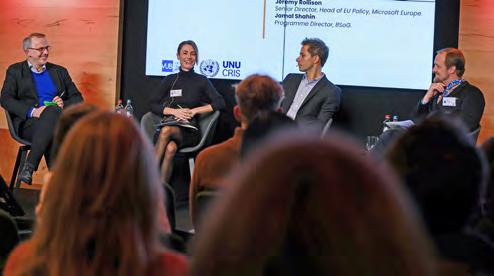
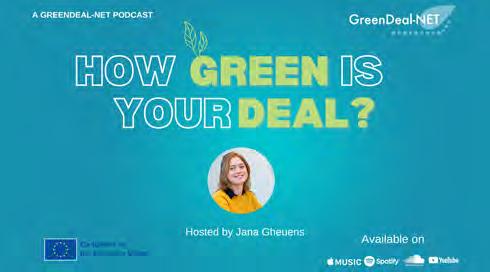
Institute for European Studies Annual Report 2023 14
HIGHLIGHTS
CMDJ CENTRE ORGANISES IMISCOE PHD SCHOOL
The BSoG’s Centre for Migration, Diversity and Justice, proudly organised the IMISCOE PhD school on “Critical reflections on migration studies, racism and discrimination” in April 2023. IMISCOE is the world's largest network of research centres and academics on migration and diversity. The PhD school was coorganised with three other Belgian universities CEDEM (ULiège), CESSMIR (Ghent University) and CEMIS (Antwerp University), but hosted at VUB. The PhD school proposed a multi-stakeholder approach consisting of keynote lectures, intensive feedback sessions, interactive panels with scholars, artists, activists and practitioners, an outreach event and reflections on policy advice and media discourse
CSDS CENTRE PRODUCES RANGE OF HIGH-LEVEL POLICY REPORTS
In 2023, the BSoG’s Centre for Security, Diplomacy and Strategy produced more than 35 individual pieces of research and analysis were produced with prestigious academics and policy-relevant outlets. In particular, CSDS was commissioned to write two major reports for the European Parliament on Qualified Majority Voting and the Versailles Summit on defence. The Marathon Initiative commissioned a major study from CSDS researchers in the context of its Bridging Allies initiative, and a report to mark 60 years of diplomatic relations between Canada and South Korea was produced by the KF-VUB Korea Chair.


Institute for European Studies Annual Report 2023 15
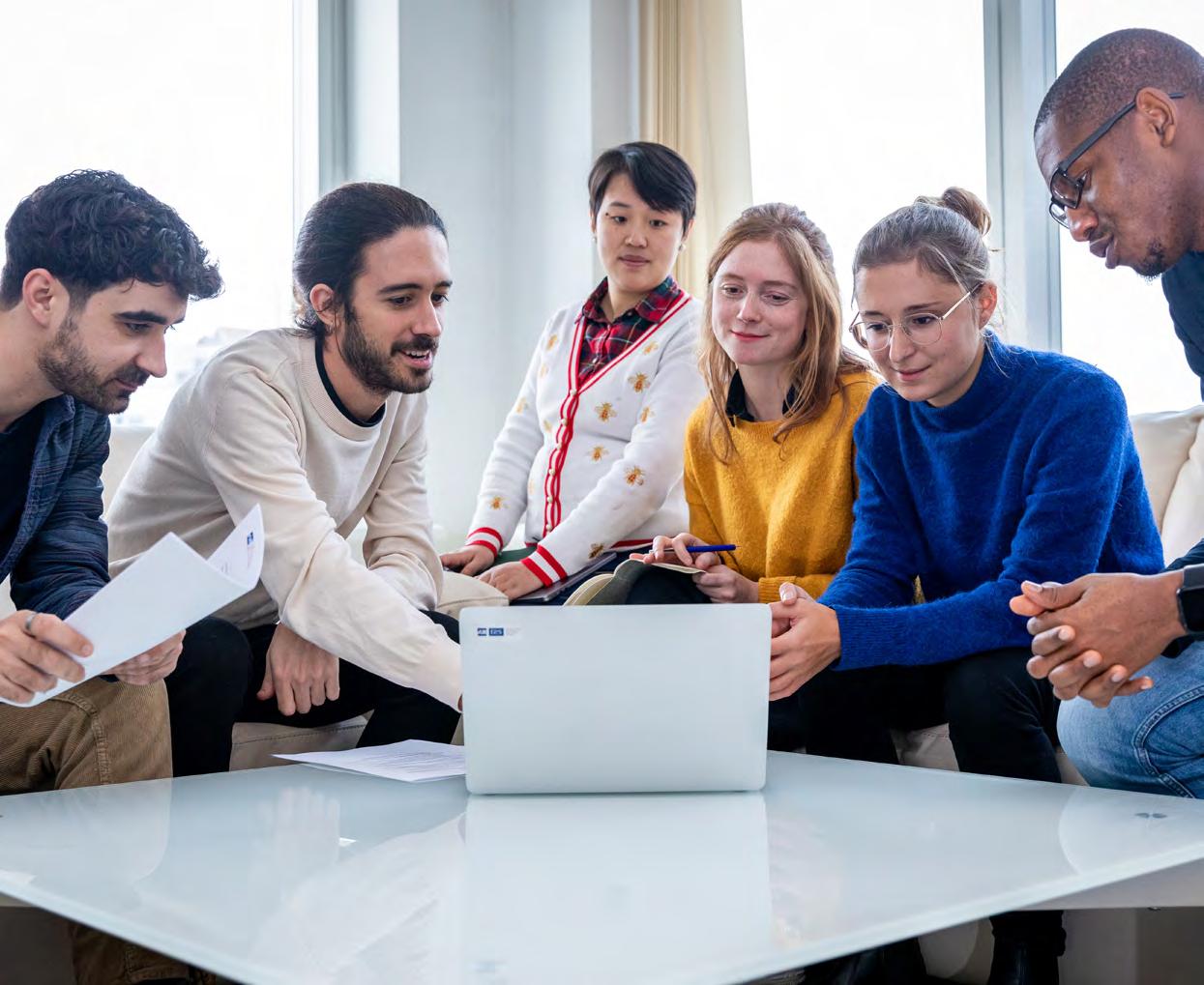
RESEARCH PORTFOLIO
RESEARCH - STRATEGIC GOALS
THE STRATEGIC PLAN 2021-2025 OUTLINED SEVERAL RESEARCH OBJECTIVES:
• Updating the IES research agenda around four new research centres: a Centre on Digitalisation, Democracy and Innovation; a Centre on Environment, Economy and Energy; a Centre on Migration, Diversity and Justice; and a Centre on Security, Diplomacy and Strategy.
The preparations for the creation of these four research centres, and the update of the IES research agenda around them, were started in late 2020. The four new centres became operational shortly afterwards. Their public launch towards their wide range of stakeholders coincided with the launch of the Brussels School of Governance (BSoG) on 9 February 2021, which is the alliance between the Institute for European Studies and Vesalius College.
Since then, each of these centers has developed its own sub-brand, under the umbrella of the BSoG, with accompanying publication and project acquisition strategies. This has resulted in a significant expansion of the project portfolio.
• Maximising the intrinsic synergies between the educational offers of the IES and the VUB’s ES and RC faculties, Vesalius College, and the partners in the European university alliance, EUTOPIA.
The creation of the Brussels School of Governance in February 2021 has significantly increased the synergies between the educational offering of IES and Vesalius College. Various elements of both institutions’ programmes were aligned. Since then, both faculty and support staff across IES and Vesalius work as one integrated team. As regards the VUB’s ES and RC faculties, a process of streamlining the complementarity in MA-level programmes was initiated.
In 2023, we performed a review of the IES LLM curriculum, a new version of which will be implemented in the Fall 2024 semester. Also, we have decided in 2023 to reform the EuroMaster programme (new curriculum will be rolled out as of Fall 2025). The aim is to bring it even closer in line with the IES research centres. Another objective is to create more synergies with the ES-led MSc in European and International Governance (in which IES staff act as service providers). 2023 saw frequent collaboration with the EUtopia network, e.g. with the joint IES-Eutopia simulation exercise during the third edition of the IES’ Winter School in February 2023, two PhD bursaries (one in our Centre for Digitalisation, Democracy and Innovation and one in our Centre for Security, Diplomacy and Strategy) financed by EUTOPIA, and EUTOPIA member Warwick University acting as an important partner in our EUIA conference cycle.
Institute for European Studies Annual Report 2023 17
RESEARCH - STRATEGIC GOALS
• Within each research centre, the aim is to deliver one doctorate per year, and therefore to start a total of at least 20 doctoral projects over the full management period (at least 10 of which are to be launched using Flemish government funding).
In 2023, the IES delivered a total of five doctorates, one of which was delivered by the Centre for Migration, Diversity and Justice, one by the Centre for Environment, Economy and Energy, and three by the Centre for Security, Diplomacy and Strategy.
• Achieving at least one large-scale research project (e.g. ERC, Horizon Europe or Chair) per centre.
In 2023, each of the four research centres was involved in at least one, and in most cases several, large-scale research projects. Examples include an ERC-funded project on US-China rivalry and its implications for Europe, led by professor Luis Simón (CSDS); the NATO financed Bridging Allies project (CSDS); the ERC-funded Curiae Virides project that conceptualises the transformation of human rights litigation into ecocentric litigation, led by professor Liliana Lizarazo Rodriguez (C3E); the GreenDeal-NET project, a Jean Monnet Network about the EU’s Transition towards climate neutrality and sustainability (C3E), the Chair in Digital Sovereignty funded by Microsoft (CD2I), the Horizon Europe funded TITAN project aimed at intelligent coaching of citizens against disinformation (CD2I), the H2020-funded BRIDGES project aimed at assessing the production and impact of migration narratives (CMDJ), and the Whole-COMM project, exploring the integration of post-2014 migrants in small and medium-sized towns and rural areas in 8 EU and 2 non-EU countries from a whole of community perspective. In addition to the two ERC projects mentioned above, we welcomed Antonio Calcara on 1 January 2024. He brings a third ERC project to our institution.
• Annually: publication of an average of 50 scientific publications with peer review, one to two books and 20 policy papers.
IES-affiliated scholars collectively published a total of 13 books, 91 academic journal articles and 44 book chapters - amounting to 148 peer-reviewed publications, and 37 policy reports. For a detailed overview, see our list of 2023 publications in the annex. Full and multiannual bibliographical data is stored in the researchportal.vub.be – thus permanently accessible – and automatically synced with ORCID and the FRIS Onderzoeksportaal. With our own policy report outlets (Centre-led) Policy Briefs as well as In-Depth long read formats) we ensure that our cuttingedge research findings are made available in open-acccess formats and tailored to a diverse audience including policymakers and media as well as academics.
Institute for European Studies Annual Report 2023 18
PHD BURSARY PROJECTS
PHD BURSARIES FINANCED BY IES
CENTRE FOR ENVIRONMENT, ECONOMY AND ENERGY
• On the outside looking in: Goal achievement of EU Arctic policies”, Aslak Veierud Busch, October 2019 –September 2023
CENTRE FOR MIGRATION, DIVERSITY AND JUSTICE
• Cooperation beyond borders: explaining EU migration cooperation with third countries, Philipp Stutz, October 2017-January 2023
• Governmental Responsiveness to Black Lives Matter in Europe, Fọláṣadé Ajayi, February 2020 – March 2024
• "Safe" third countries - the heterogeneous application of a controversial concept, Gaia Romeo, October 2021-September 2025
CENTRE FOR SECURITY, DIPLOMACY AND STRATEGY
• Explaining military innovation in military applications of artificial intelligence, Maaike Verbruggen, November 2017 – April 2022 (project temporarily suspended)
• Great Power Competition in the Indo-Pacific: the Mekong Region, Fabio Figiaconi, October 2020 – September 2024
• The protégé rearmament dilemma: balancing between autonomy and alliance cohesion, Lotje Boswinkel, October 2022 - September 2026
CENTRE FOR DIGITALISATION, DEMOCRACY AND INNOVATION
• Competition and co-operation in digital policymaking - The EU as a global actor, Orsolya Gulyás, November 2018-September 2024
Institute for European Studies Annual Report 2023 19
PHD BURSARY PROJECTS
PHD BURSARIES FINANCED BY PROJECT
CENTRE FOR ENVIRONMENT, ECONOMY AND ENERGY
• Access to Remedy in Environmental Matters: Do Victims of GVC-Related Environmental Damage Have Access to Effective Remedies? An Empirical and Comparative Analysis of the Effectiveness of Remedy Obtained through Transnational Litigation. Ludmila Cieszkowsky Elias, November 2022 - October 2026
• Theoretical and Empirical Foundations of Value Chain Due Diligence in Transnational Ecological Conflicts, Joao Teixeira de Freitas, March 2021 – February 2025
• The integration of climate and energy security objectives in the EU's external energy policy, Marco Giuli, September 2019 – August 2023
• EU Policy Instruments on Sustainable Trade, Simon Happersberger, FWO PhD bursary, November 2022 –October 2026
• Analysis of stakeholder’s role in ecocentric litigation using Social Network Analysis (SNA) and Qualitative Comparative Analysis (QCA) Daniel Leguizamon Alejo (ERC Str. Grant 949690 Curiae Virides) , December 2022 - November 2026
• Product-Service Systems for the Circular Economy: Policy Implications under the WTO Law, Eleanor Mateo, December 2017 – November 2024
CENTRE FOR MIGRATION, DIVERSITY AND JUSTICE
• The politics of (return) migration in the Gambia, , Omar N. Cham (H2020 project BRIDGES on migration narratives), October 2018 – August 2024
• Governing religious diversity at the local level in Europe: moving beyond the nationalist and localist theories, Louise Hantson, FWO bursary, November 2023 - October 2027
Institute for European Studies Annual Report 2023 20
PHD BURSARY PROJECTS
CENTRE FOR SECURITY, DIPLOMACY AND STRATEGY
• Historical narratives in Russian governmental discourse on domestic and foreign policy decisions, 1991-2018, Laura Vansina, October 2019 - September 2023
• The role of the changing character of war for the US-led alliance system, Octavian Manea, October 2021September 2025
• What does China want? Technology and great power competition in Europe, Ludovica Meacci, October 2022September 2026
• Industrial Policy in the Age of Complexity: Emerging Technologies and the International Competition in Commercial and Defence Markets, Ivan Zaccagnini, October 2022 - September 2026 (joint PhD with Luiss Guido Carli University, Rome)
CENTRE FOR DIGITALISATION, DEMOCRACY AND INNOVATION
• Meaningful participation in global and regional multistakeholder institutions: the case of the Internet Governance Forum, Nadia Tjahja, September 2020 - August 2024
• Prevention of securitization of contentious content through architectural interventions on online platforms, Nathalie Van Raemdonck, September 2020 - June 2025
• The relation between privacy, data protection and identity, Ana Fernandez, November 2019 - October 2023
• How do social media platforms afford content curation? Understanding user agency over their media diets. Carlos Entrena, June 2022 - May 2026
• Human personhood in the age of automation, Samuel Johns, June 2022 - May 2026
• Digital Democracies in peril: a post-structuralist lens on disinformation and individual agency online, Samuel Cipers, October 2022 - September 2026 (Financed by EUTOPIA)
• Digital Sovereignty: symbolic interactionist role theory and norms of (digital)-sovereignty, Sophie Hoogenboom, March 2023 - February 2027
Institute for European Studies Annual Report 2023 21
EXTERNALLY-FUNDED PROJECTS
CENTRE FOR DIGITALISATION, DEMOCRACY AND INNOVATION
INTERNATIONAL ORGANISATIONS AND FOREIGN GOVERNMENTS
Collaborative Doctoral Partnership – Digital Governance
October 2021 – October 2026
Funding organisation: Joint Research Centre | European Commission
The importance of science-based evidence for policy making is increasingly recognised by decision makers and finds resonance in research and academia. In order to enhance the science-policy link, the Joint Research Centre (JRC) of the European Commission concludes collaborative doctoral partnership (CDP) schemes with higher education institutions. Vrije Universiteit Brussel replied to the call for expressions of interest in the fields of ‘digital governance' and ‘secure and sustainable supply of raw materials for strategic value chains’ and was selected by the JRC. Within this project, the Centre for Digitalisation, Democracy and Innovation (CD2I) at the Brussels School of Governance, the Centre for Studies in Media, Innovation and Technology (SMIT) and the HUMAINT project of the Digital Economy Unit, Joint Research Centre site in Sevilla co-supervise a doctoral student (Carlos Entrena) in the field of digital governance, on the topic of trustworthy artificial intelligence. The collaborative doctoral partnership is co-funded by JRC and VUB and runs for a period of five years (20212026). The doctoral student entered the second year of his PhD in June 2023. Carlos has completed his theoretical framework and first journal article and started his secondment at the European Commission Joint Research Centre in Sevilla in September 2023.
EDMO: Belgium-Luxembourg Research Hub on Digital Media and Disinformation
October 2021 – March 2024
Funding organisation: European Health and Digital Executive Agency | European Commission
This project sets up a Belgian and Luxembourgish hub for research on digital media and disinformation (EDMO BELUX). It brings together an experienced and extensive network of fact-checkers, media, disinformation analysts, media literacy organisations and academics to detect, analyse and expose emerging harmful disinformation campaigns. Through rapid alerts in the network, fact checks, and investigative reporting, we will reach first responders to disinformation (media, civil society, government) in order to minimize the impact of disinformation campaigns. In addition, through media literacy campaigns, EDMO BELUX will raise awareness and build resilience among citizens and media to combat disinformation. Finally, the hub will embed its disinformation monitoring, analysis, and awareness into a multidisciplinary research framework on the impact of disinformation and platform responses on democratic processes. In 2023, the project completed its envisaged milestones and deliverables. A grant proposal was prepared and submitted to extend the project through a second round of funding. In January 2024, funding for EDMO BELUX 2.0 was approved, effectively extending the project for another 30 months. The envisaged starting date for EDMO BELUX 2.0 is May 2024.
Europe Explained: Analysing Digital and Civil Rights in Today’s EU
November 2022 – October 2025
Funding organisation: European Commission | Jean Monnet Module, Funding also provided by The Flemish Department of Education and Training
The Summer and Winter Schools on European Union Policy-Making are intensive two-week study programmes
Institute for European Studies Annual Report 2023 22
EXTERNALLY-FUNDED PROJECTS
with a strong multidisciplinary character, developed and delivered by the Brussels School of Governance at the Vrije Universiteit Brussel, in close cooperation with the Vienna School of International Studies and the University of Vienna. The chair holder is the convener and academic coordinator of the summer and winter schools, whose passion for teaching finds a perfect outlet in these handson intensive study programmes and whose research on digital governance and participation intersects closely with the teaching on current challenges in today's EU. The programmes provide a ‘crash course’ in European Union Policy-Making, with a unique topical focus. The focus area of the summer course is civil rights in today's EU, while the winter school explores digital rights. The summer school is an in-person course, in which students spend one week in Brussels and one week in Vienna. This winter programme is an online study experience with special attention to social interaction. The Jean Monnet Chair organised its Summer and Winter Schools as expected in 2023. More details can be found in the education section of the annual report.
DESTINY: Debating Europe Digital Sovereignty
March 2022 – February 2025
Funding organisation: European Commission | Jean Monnet Module
The Jean Monnet Module DESTINY focuses on advanced level university education in the sphere of Digital European Sovereignty. It brings together theoretical discussions on the changing digital world order and practical examples of how the EU addresses this transformation through the development of a stronger digital ambition, through engagement exercises and in-depth policy research. In 2023, this module received official approval from the university’s Education Council, and has been slated to become a course on the MSc in European Integration in academic year 2023-2024. In the second semester of that academic year, we will bring this field of research and
policy to the classroom in ways that will help students specialising in European policymaking become aware of the specific challenges of Digital sovereignty for the EU, with its diversity of opinions.
ProPA: Pro-Democracy Platform Advocacy: Fostering Social Media's Accountability to Dissident Voices under Authoritarianism
September 2023 – August 2025
Funding organisation: European Commission | Jean Monnet Module HORIZON MSCA Postdoctoral Fellowships
Digital platforms, such as Facebook and Twitter, have long touted themselves as defenders of freedom of expression, yet their content moderation rules have faced global criticism, amongst others for failing to tackle authoritarian repression of dissident voices. Government trolls successfully run malicious reporting campaigns that result in the platforms’ removal of activists’ posts and accounts. Meanwhile, civil society under authoritarianism lacks means of legal recourse and can only engage in international advocacy to urge social media companies to implement safeguards. The research has two main objectives. First, the project will build and test a theoretical model of pro-democracy platform advocacy, based on original evidence from Asian pro- democracy movements and their advocacy toward social media platforms. Second, the findings will be turned into two open-access academic articles and three applied innovations, including a best practice guide for pro-democracy activists, a set of policy recommendations for social media companies, and a digital advocacy resource for social media users. MSCA postdoctoral fellow, Mai Van Tran, joined the BSoG in September 2023. In the first months of the project, she developed her preliminary theoretical model and started conducting qualitative interviews on platform advocacy with pro-democracy activists from Myanmar.
Institute for European Studies Annual Report 2023 23
EXTERNALLY-FUNDED PROJECTS
ReMeD: Resilient Media for Democracy in the Digital Age
March 2023 - February 2028
Funding organisation: European Commission | European Research Executive Agency (Horizon Europe)
With an interdisciplinary approach and an innovative methodology that combines qualitative and quantitative methods, ReMeD will gather, analyse, compare and contrast data on professional journalists, alternative media content producers and citizens operating in technologically mediated configurations, and on the media organisations, market structures and national and international regulations that underpin media production, circulation and consumption in the contemporary media landscape. ReMeD will work closely with all parties involved in order to co-produce high-impact knowledge and solutions that will contribute to the creation of resilient democratic media that reinvigorate, strengthen and uphold democracy, the rule of law and fundamental human rights. In 2023, the mapping of the initiatives against disinformation in Belgium were completed, as well as the mapping of alternative/peripheral media. The first advisory board and stakeholders meeting will take place on February 2024.
S.HI.E.L.D vs Disinfo: Students’ of Higher Education critical digital Literacy Development against Disinformation
October 2022 - September 2025
Funding organisation: European Commission | ERASMUS+ The rapid recent changes in communication modes worldwide with the broad use of social media and new technologies, and the development of new strategies, means, or techniques for creating fake news, click baiting content, deep web videos, etc. have resulted in the wide spreading of disinformation by shaping it to a contemporary global phenomenon with serious and multiple consequences.
Therefore, the proposed project derives from the social need for empowerment of HE students, who are already citizens and future professionals, to resist disinformation. In 2023, the kick off meeting in Paris as well as the first progress meeting in Tartu took place. The mapping of trainings against disinformation was also completed.
SoMe4Dem: Social Media for Democracy –Understanding the Causal Mechanisms of Digital Citizenship
March 2023 - February 2026
Funding organisation: European Commission | European Research Executive Agency (Horizon Europe)
Current diagnoses that democracy is in crisis at the beginning of the 21st century share a common argumentative reference point: the (implicit) reference to the dysfunctional constitution of the political public sphere which is currently undergoing structural change. The rise of social media platforms is considered as one of its main constituents. While social media make the public arena more open and thus more responsive, these platforms also lead to new mechanisms of fragmentation and exclusion, an erosion of norms in public debate and a loss of trust in traditional institutions. The project reconsiders the diagnoses of this crisis by (1) providing better empirical evidence for the impact of social media on society with respect to political debates, (2) understanding the main causal mechanisms of this impact and (3) developing tools that improve the capacity of social media to contribute to the functioning of the public arena in a liberal democracy, i.e., deliberation, legitimation and the self-perception of the democratic subject. In 2023, the project was initiated and the first deliverables to be submitted in February 2024 were prepared. Exploring the relation between social media and democracy, research activities in 2023 focused on the development of a conceptual framework for platform affordances in relation to the functions of the public sphere.
Institute for European Studies Annual Report 2023 24
The Sport Transparency Index
January 2023 - June 2025
EXTERNALLY-FUNDED PROJECTS
Funding organisation: European Commission | European Education and Culture Executive Agency (Erasmus Mundus, Sport)
Integrity is the most fundamental value to sport. Integrity threats are broad, diverse and hugely significant, they can relate directly to sports competition, such as doping, or indirectly to sport competition, such as child protection within the broader sporting environment, in addition to others such as corruption, match fixing and bribery, it is clear that sport faces a very real and tangible threat to credibility. The Sport Transparency Index has been devised to help support integrity interventions at the most fundamental level. It will help by benchmarking sport stakeholders including clubs, leagues, national associations and international governing bodies using universally applicable and appropriate criteria to evaluate, compare and contrast them against basic integrityrelated transparency indicators. In 2023, the project was initiated and the BSoG completed its main deliverable researching and designing a matrix of transparency indicators suitable for independently assessing the integrity of sport stakeholders across multiple sectors and geographies.
TITAN: AI for Citizen Intelligent Coaching against Disinformation
September 2022 – August 2025
Funding organisation: European Commission | Horizon Europe
TITAN delivers an open, distributed and citizen engaging ecosystem that empowers citizens to conduct effective and efficient investigations for understanding whether statements at hand are true. AI-driven, intuitive and personalised ‘question-and-response’ interaction set the attention of the investigating citizen on the logical interpretation and critical assessment of the implied reasoning and arguments in the statement at hand while directing the citizen in the appropriate use of suitable fact-
checking and media literacy tools and services. Intelligent coaching conversational schemes are personalised according to the investigating citizen’s profile, digital skills, media literacy skills, possible difficulties in thinking critically as well as the linguistic characteristics of the statement under investigation. At the end of such an ‘question-and-response’ interaction cycle, the citizen will have his/her critical thinking and media literacy skills advanced so as to better detect disinformation he/ she may encounter in the future at scale. In 2023, the BSoG coordinated and completed the project’s research deliverable that forms the socio-technical foundation of the TITAN ecosystem. A first iteration of the data protection and trustworthy AI impact assessment was designed, conducted and completed, as well as regular contact with the external ethics advisory board maintained.
Other Organisations
Chair in Digital Sovereignty
May 2021 – May 2023
Funding organisation: Microsoft
The Chair is a joint venture between the Brussels School of Governance, Vrije Universiteit Brussel (BSoG-VUB) and the United Nations University – Institute on Comparative Regional Integration Studies (UNU-CRIS). The primary goal of the Chair is to reflect on the emergent and divergent meanings of sovereignty in the 21st Century. It will specifically focus on the role of technology (in the widest meaning of the word) in affecting and effecting change in political institutions. In 2023, the project drew to an end with a conference held on Microsoft premises in Brussels to launch the “digitalisation specialisation of the EuroMaster programme, and also provided a moment to reflect on the research being done within CD2I on digital sovereignty. As a result of the collaboration with Microsoft, through the establishment of an independent VUB Foundation Chair in Digital Sovereignty, Sophie Hoogenboom has launched her PhD project in this space.
Institute for European Studies Annual Report 2023 25
EXTERNALLY-FUNDED PROJECTS
PROJECTS FUNDED BY VUB
GREMLIN: The Contribution of ‘regional’ multistakeholders mechanisms in improving global governance
March 2022 – March 2024
Funding organisation: VUB | OZR Grant
The GREMLIN project (October 2017 - September 2024) aimed to investigate multistakeholderism in regional and global governance. It examined two different policy areas where multistakeholderism had become a defining norm: Internet and trade governance. Questions of legitimacy and effectiveness are key to debates on multistakeholderism and thus were also central to the theoretical framework of the project. GREMLIN 2 is the continuation of Project GREMLIN, and is designed to raise the levels of expertise in UNU-CRIS in the field of Digital Governance. Over the two years of the project, it will support PhD researchers and visiting researchers in the context of UNU-CRIS activities in Digital Governance and Non-Traditional Diplomacy. In 2023, Sophie Hoogenboom who is also attached to the Chair on Digital Sovereignty, joined GREMLIN as a doctoral student in March 2023, while Nadia Tjahja entered the last year of her doctoral studies. Both are making good progress in their research. As part of the gremlin project, the team has also participated in a number of international conferences, notably the Internet Governance Forum and the Giganet Academic Annual Symposium, both held in Japan this year.
Postdoctoral project – Negotiating Internet standards
October 2023 – September 2024
Funding organisation: VUB | OZR Grant
As part of a one-year back-up mandate from OZR, Clément Perarnaud submitted a senior FWO postdoctoral application in December 2023, and launched his research fieldwork focused on power plays in Internet standardisation processes (IETF).
CENTRE FOR MIGRATION, DIVERSITY AND JUSTICE
INTERNATIONAL ORGANISATIONS AND FOREIGN GOVERNMENTS
BRIDGES: Assessing the production and impact of migration
March 2021 – February 2024
Funding organisation: European Commission | H2020
The project aims to understand the causes and consequences of migration narratives in a context of increasing politicisation and polarisation by focusing on six European countries: France, Germany, Hungary, Italy, Spain, and the United Kingdom. To do so, BRIDGES adopts an interdisciplinary and co-productive approach and is implemented by a diverse consortium of 12 institutions formed by universities, think tanks and research centres, cultural associations, and civil society organisations from all over Europe.
The VUB was responsible for the Work package analysing the impact of EU-funded information campaigns on the decisions of (potential) migrants. The fieldwork took place with young people in the Gambia and Afghan refugees and migrants in Turkey. In 2023, the project results were published in BRIDGES reports and discussed in a targeted policy forum with policymakers in Brussels in mid-2023. The VUB team was also involved in the Work package assessing the influence of media narratives on policymaking in the EU.
INDEED: Strengthening a comprehensive approach to preventing and counteracting radicalisation based on a universal evIdeNce-based MoDEl for Evaluation of raDIcalisation prevention and mitigation
September 2021 – August 2024
Funding organisation: European Commission | H2020
Institute for European Studies Annual Report 2023 26
EXTERNALLY-FUNDED PROJECTS
INDEED aims to strengthen the knowledge, capabilities and skills of preventing violent extremism (PVE) / countering violent extremism (CVE) and deradicalisation within first-line practitioners and policymakers in designing, planning, implementing and evaluating initiatives in the field through an evidence-based approach. INDEED builds from the state-of-the-art, utilising the scientific and practical strengths of recent activities –enhancing them with complementary features to drive advancements and curb a growing rise of radical views and violent behaviour threatening security. Throughout 2023, the VUB contributed to different project objectives including the establishment of a toolkit which aims at being a practical and interactive instrument able to integrate key results in one place. This will allow practitioners and policy makers to use it easily.
EXPAND: Explaining Resilience in EU Justice and Home Affairs
September 2020 – September 2023
Funding organisation: European Commission | Jean Monnet Chair
The EXPAND Jean Monnet Chair worked towards advancing research-led teaching and the public debate on the resilience of the EU in general and in the Area of Freedom, Security and Justice in particular. The objective of EXPAND was to engage students, academics and policy-makers/practitioners in a dialogue on: (1) the ways in which the European integration project has – or has not – become more resilient; (2) the ways in which the EU and its member states have incorporated lessons from previous crisis and seek to reform their JHA policies in formal and informal ways; (3) the international channels of influence that the EU has fostered in the JHA field to develop a more comprehensive approach, notably in the migration field. The project implemented the desired objectives and was positively evaluated after project completion at the end of 2023.
Whole-COMM: Exploring the integration of post-2014 migrants in small and medium-sized towns and rural areas from a whole of community perspective
January 2021 – March 2024
Funding organisation: European Commission | H2020
After 2014, the number of migrants in barely prepared small and medium-size towns and rural areas has grown, affecting local social cohesion and challenging Europe’s future integration. The EU-funded Whole-COMM project will contribute to the scientific knowledge and theorisation on the dynamics and causal mechanisms that impact the relationship between immigrant integration policy and community cohesion. The research method used by this project perceives migrant integration as a communitymaking process. Whole-COMM uses a cross-country and cross-locality comparative methodology comprising 8 EU and 2 non-EU countries and 40 localities, mixed methods matching qualitative and quasi-experimental approaches, and quantitative analysis on the impact of policies on social cohesion and immigrants’ integration directions.
In 2023, the VUB Whole-COMM team finalised and published the WP5 report on, they organizeda large policy workshop on immigrant integration in small and medium-sized towns, together with VVSG, the Hannah Arendt Instituut, Levl and the University of Antwerp. They participated in 2 workshops with International and local policymakers from abroad in Florence and Brussels, they wrote 2 policy briefs, presented their findings at e.g. the IMISCOE conference in Warsaw and drafted one academic article. The funding for the personnel members hired on the project ended in April 2023.
Institute for European Studies Annual Report 2023 27
EXTERNALLY-FUNDED PROJECTS
OTHER ORGANISATIONS
BIRMM PhD School 2023
April 2023
Funding organisations: IMISCOE (largest academic network on migration studies world-wide), VUB Doctoral School, VUB Global Minds Programme, University of Antwerp (Doctoral School), University of Ghent (Doctoral School), FNRS (by University of Liège -CEDEM) Migration studies has, for long, largely ignored the study of racism. Recent calls for the decolonisation of the university and Black Lives Matter 2020 led to the gradual entry of the study of race, racism and colonialism into the migration studies field. Whilst developed apart in the past, mainstream migration studies and race critical studies (from postcolonial, to decolonial, to critical race studies, Black studies and more) are slowly starting to dialogue. This IMISCOE PhD school aimed at bringing together PhD researchers with experienced scholars, activists, practitioners, and artists to explore how the more mainstream social sciences on migration, racism and discrimination and race critical studies can learn from each other and (im)possibly integrate, and how we can contribute to more racial justice. The PhD school offered a platform for a fruitful interdisciplinary exchange which allowed PhD researchers to develop creative approaches to the study of racism and migration and to develop new insights. The programme consisted of keynote lectures, discussions, interactive panels with scholars, artists, activists and practitioners and intensive feedback sessions. Each participant presented their work and was assigned a keynote speaker or local expert for one-on-one feedback.
The creation of a dataset on coercive EU mobility rules
April 2021 – March 2025
Funding organisation: Fonds Wetenschappelijk Onderzoek – Vlaanderen (FWO)
The EU is interested in regulating as to where and how long migrants may remain in its territory. If deemed necessary, the EU rules regulating the mobility of migrants can be enforced by coercive means e.g. through a forcibly return procedure or a Dublin transfer of asylum seekers back to their point of entry in Europe. The ERC runnerup-project will be ground-breaking by analysing and critically reflecting upon the application of these rules. It will create a unique dataset featuring country-to-country cooperation patterns on coercive mobility within Europe (on Dublin transfers) and from Europe to the rest of the world (on return cooperation) over a period of twenty-one years (1999-2020). Different statistical methods, first and foremost regression analyses, will allow to explain the patterns of cooperation (and non-cooperation) over time and across all regions in the world. This will determine the impact of factors such as a third country’s democratic standards or administrative capabilities. The dataset on coercive EU mobility rules will also assess the extent to which incomplete or unreliable data distorts our knowledge and understanding on migration governance in Europe. No one has yet systematically compared and complemented European and national data on migration, regardless of the fact that complaints about the quality of the data are frequent. Making the dataset open access, the ERC runner-up-project will have a high public impact by strengthening the capabilities of policymakers and academics.
Les Pionnier.e.s de L’antiracisme en Belgique
October 2022 – September 2024
Funding organisation: Belgian Federal Government –Federal Public Service of Justice
The history of anti-racism in Belgium is not yet written or documented, especially by individuals with immigrant backgrounds. This project consists in documenting this history, with those who we designate as being the "pioneers of anti-racism". These are those who worked, from the 1970s to the 1990s, in a context marked by
Institute for European Studies Annual Report 2023 28
EXTERNALLY-FUNDED PROJECTS
the rise of the far right. To better understand anti-racism today, from an intersectional perspective, it is important to know the history of these struggles. For a better understanding of current structural racism, it is important to document the beginnings of the engagement of these anti-racist pioneers and to see how they prepared the ground for the mobilisations of civil society today. By duty of memory and transmission, it is crucial that the younger generations grasp the fact that anti-racism in Belgium did not start with Black Lives Matter.
By associating these pioneers at the heart of this approach, the project consists of making a documentary, writing a collective work and organising a public meeting to give voice to these anti-racist activists from the shadows, and to make them known to younger generations.
In 2023, we continued the historical research by means of analysing archival material, secondary sources and (collective) interviews. We also applied for further funding for the documentary via the Docville call for scientific documentaries, had talks with the public broadcasting channel Canvas and finally decided, with filmmakers, to rather build an interactive website that can host several testimony films instead of a short documentary. The project got prolonged by the funding authority, until September 2024, for doing so.
Governing religious diversity at the local level in Europe: moving beyond the nationalist and localist theories
November 2023 - October 2027
Funding organisation: FWO
In this project, we will study how and why different cities accommodate minority religious practices, and we will focus on the most prominent minority religion in Europe, namely Islam. Some research has been conducted into this sub-area of research, yet it mainly focussed on states, not on cities. Moreover, the research on state accommodation of minority religious practices is relatively outdated. For this Ph.D. project, we will conduct
a comparative study in four carefully selected cities with an important but varying presence of Muslim minorities: Antwerp (Belgium), Bologna (Italy), Lyon (France) and Barcelona (Spain).
In 2023, the project application was written and submitted to FWO. After the selection of the project, the candidate, a former project researcher at C-MDJ BSoG started working on the FWO project in November 2023.
PROJECTS FUNDED BY VUB
BIRMM-VUB: Brussels Interdisciplinary Research Centre on Migration and Minorities, Vrije Universiteit Brussel
January 2018 – October 2024
Funding organisation: Vrije Universiteit Brussel
Vrije Universiteit Brussel (VUB) conducts a wide variety of research on migration and diversity, spread over many disciplines, departments and research institutes. This interdisciplinary group was created in January 2018 to foster interdisciplinary knowledge building among VUB researchers working on migration and minorities, valorise its research towards the local society and in international academic networks. It joins over 100 VUB researchers from 11 disciplines (including political science, law, sociology, criminology, geography, medical sciences, communication sciences, linguistics, psychology and educational sciences, philosophy, and history) working on migration and diversity related topics and organizes research days and many outreach activities (events, a podcast series, newsletter, social media, etc.). BIRMM also actively coordinates with civil society partners. BIRMM is coordinated by Prof. Ilke Adam and Prof. Florian Trauner (both IES-VUB) and a board of delegates with one representative per research centre or department. BIRMM-VUB was accepted as an institutional member of the network in early July 2018. Our expertise on migration and diversity will contribute to IMISCOE's success.
Institute for European Studies Annual Report 2023 29
EXTERNALLY-FUNDED PROJECTS
In 2023, BIRMM started its fourth year of activities, continuing as before to stimulate interdisciplinary knowledge building and networking within VUB, and valorising VUB research on migration and minorities towards the local society and in international academic networks through several types of outreach activities.
EDGE: Enhancing Democratic Governance in Europe
November 2022 - October 2027
Funding organisation: Vrije Universiteit Brussel | OZR Grant
EDGE responds to the imperative to identify innovative solutions that deliver new ways of political decisionmaking that help both effectively tackle real-world challenges to democracy and strengthen European democracies. EDGE brings together researchers from various research groups and disciplines: POLI (the VUB Political Science Department), BSoG (the VUB Brussels School of Governance), RHEA (Research Center on Gender, Diversity, Intersectionality), BRIO (Centre for Information, Documentation and Research on Brussels) and BIRMM (Brussels Interdisciplinary Research centre on Migration and Minorities). EDGE researchers collaborate in three complementary research areas: Climate, Sustainability, and Democratic Innovations; Enhancing Representative Relationships; and Intersectional Inequalities and Democratic Innovations.
The new EDGE programme really kickstarted in 2023. One new postdoctoral researcher joining BSoG C-MDJ was hired in 2023, Dr Iva Dodevska. She researchers and submits project applications on EU, national and local immigrant integration policies, their effects on equality and their inclusion in decision-making.
CENTRE FOR ENVIRONMENT, ECONOMY AND ENERGY
INTERNATIONAL ORGANISATIONS AND FOREIGN GOVERNMENTS
4I-TRACTION: Innovation, Investment, Infrastructure and sector Integration: TRAnsformative policies for a ClimaTe-neutral European UnION
June 2021 – May 2024
Funding organisation: European Commission | H2020
The overall goal of 4I-TRACTION is to develop and assess transformative policy avenues for the 2020s, and an effective governance framework to implement them, aligned with the EU’s long-term objective of climate-neutrality by 2050 as the EU’s contribution to achieving the objectives of the Paris Agreement and the implementation of the Sustainable Development Goals. 3E Centre work on the project in 2023 focused on the expost assessment of EU climate policy (WP 2), the analysis of avenues for future EU climate and energy policies (WP 4) and the procedural governance for a climate-neutral EU (WP 5).
CURIAE VIRIDES: How the third wave of global judicial (and social) activism is filling ecological governance
January 2021 – December 2025
Funding organisation: European Research Council
This project conceptualises the worldwide progressive transformation of human rights litigation into ecocentric litigation that, by triggering activist courts, aims at filling ecological governance gaps with the expectation to provide effective remedy to victims of transnational ecological harm. In concrete, the project investigates how do transnational ecological conflicts (TEC) transform into lawsuits, which actors appear, and which alternative options for litigation (grievance mechanisms (GM)) exist. It also assesses how ecocentric networks operate and
Institute for European Studies Annual Report 2023 30
EXTERNALLY-FUNDED PROJECTS
what is the scope of case law with respect to the remedies claimed and obtained by victims. The project combines legal research methods with empirical quantitative and qualitative methods to develop the research questions. So far, the team is finalising a dataset that captures the dynamics and magnitude of the transformation of TEC into lawsuits. The team has screened 65 sites, of which 10 datasets and resource centres and 17 regional and international court repositories, arbitration and GM were exhausted. 2700 cases, out of >10.000, were included in the dataset. The scientific report was submitted in August 2023 and approved by the ERCEA.
ECOvalence: Governing the environment-economy nexus in the European Green Deal
September 2022 – August 2025
Funding organisation: European Commission | FP7 The objective of the Jean Monnet Chair ECOvalence is to provide research led teaching and raise public awareness on the governance of the two central building blocks of sustainable future: the economy and the environment. The angle of observation is the European Green Deal, which sets out the EU’s objective to build a society that is economically competitive, yet also resource efficient and without greenhouse gas emissions. Project ECOvalence creates and disseminates knowledge about the complicated environment-economy nexus, which lies at the heart of the Green Deal. ECOvalence will do so through a comprehensive combination of four researchbased post-graduate courses, a doctoral research seminar in EU law and policy, as well as scientific and policy publications.
GreenDeal-NET: The European Green Deal: Governing the EU's transaction towards Climate Neutrality and Sustainability
September 2022 – August 2025
Funding organisation: European Commission | Jean Monnet Network
The network on “The European Green Deal: Governing the EU’s Transition towards Climate Neutrality and Sustainability” (GreenDeal-NET) focuses on one of the key European and global challenges. Its overarching objective is to provide a platform for collaboration and exchange on European climate and sustainability governance so as to (a) collect, share, discuss and advance relevant academic research/ teaching and (b) actively foster engagement and debate with policymakers and the broader public. GreenDeal-NET is run by a highly motivated, highly qualified, multidisciplinary and diverse team from 12 leading universities across 11 European countries. This consortium forms the nucleus of a much wider network and community with broad reach across Europe and beyond. 2023 saw the full development and consolidation of the network with a variety of research, teaching and debate activities and outputs, including academic and other publications; lectures, podcasts, a PhD school and a MOOC; various events, and more (see www.greendealnet.eu)
NDC ASPECTS: Assessing Sectoral Perspectives on Climate Transitions to support the Global Stocktake and subsequent NDCs
May 2021 – September 2024
Funding organisation: European Commission | H2020
The Paris Agreement on climate change includes a fiveyearly global stocktake (GST). Ending in 2023, the global situation was analysed, and the GST outcome is to inform countries in preparing new nationally determined contributions (NDCs) due in 2025. The EU-funded NDC ASPECTS project has provided inputs to the GST and supports the development of NDCs, including new NDCs for the post 2030 period. The project focuses on four key sectors: transport, energy intensive industries, buildings, and agriculture (including forestry, land-use, and interaction with the energy conversion sector). For each sector, the project formulates evidence-based narratives that can be translated into global and national pathways.
Institute for European Studies Annual Report 2023 31
EXTERNALLY-FUNDED PROJECTS
In 2023, 3E Centre work on the project continued to focus on the decarbonisation of energy intensive industries by advancing related transnational sectoral conversations under WP 1, analysing challenges and policy options across different countries under WP 4, and investigating related global governance under WP 6. WP 6 also advanced the analysis of the GST and its major outputs in 2023.
SOLVIT Trainings 2023 - 2024
October 2023 – February 2025
Funding organisation: European Commission DG GROW and the Executive Agency for Small and Medium-sized Enterprises | Cecoforma
SOLVIT Project contributes to the functioning of the heart of the European Union: the Single Market. The objective of the Project is to provide training to enhance the capacity of experts of national SOLVIT centres in the EU Member States to support businesses and professionals operating in the Single Market. 3E Team trains national public authorities about solving disputes that arise in the context of the free movement of goods, professional qualifications and free movement of services when attempting to operate across-national borders.
SUSTAEN: Sustainability and Trade: A European Narrative
March 2022 – February 2025
Funding organisation: European Commission | H2020
The aim of this project is to facilitate an increased awareness of trade and investment agreements’ increasing focus on environmental, sustainable and societal challenges. SUSTAEN focuses strongly on the European angle, studying how the EU has approached sustainability concerns in its trade and investment agreements. SUSTAEN aims to do so by providing a specialized course targeted to advanced MA students, many of whom are international students and might
not yet be experts in EU policies. The teaching approach combines conceptual modules delivered by academics with engagement with experts through modules where high-level practitioners share their ideas and approaches. The latter's contributions will also be accessible to scholars interested in these topics through the publication of an open access edited volume.
OTHER ORGANISATIONS
Coherence of EU Trade Policy and WTO law with the Green Deal
June 2023 - December 2023
Funding organisation: European Climate Foundation
The objective of the project was to provide a legal and policy analysis on the trade-environment nexus. The Report was commissioned by BEUC - the European Consumer Organisation to assess specifically the coherence of the EU’s bilateral trade agreements and key WTO Agreements with the European Green Deal (EGD).
Focusing on three less researched issue areas within the EGD - sustainable use of natural resources, public health and animal welfare -- the Report concluded that while both EU trade agreements and WTO law are in many respects coherent with the Green Deal, the coherence is mostly weak, and there are multiple areas of incoherence. The report recommends ways how the EU may improve, for example, the impact assessments and the design of the trade agreements, as well as points to areas where WTO law could be further developed, such as a better inclusion of consumer perspectives.
Due diligence and corporate accountability in the arms value chain
February 2023 – February 2024
Funding organisation: International Peace Information Center (IPIS), Antwerp-Belgium
Institute for European Studies Annual Report 2023 32
EXTERNALLY-FUNDED PROJECTS
This project sought to provide a broad and comprehensive overview of the discussions surrounding the possibility and necessity of establishing corporate responsibility of companies active in the arms value chain, in terms of the possible negative impacts that their activities and/ or the use of their products may have on human rights, particularly in countries in situations of armed conflict.
Final report will be released in February 2024.
Public procurement of basic materials in the EU and the potential for green materials lead markets
March 2023 - April 2024
Funding organisation: Climate Works Foundation
This project consists of research to develop methodologies and acquire the necessary data to properly ascertain the scale of public procurement for steel and concrete in the European Union, so as to better understand the potential of these sectors in attaining the EU’s climate policy objectives. The research to obtain information on the public procurement of basic materials in the EU proceeded in two phases, a top-down macro-economic literature review and a bottom-up analysis using various tender databases and models on construction materials. In 2023, a new model was developed to estimate the public procurement of cement and steel for construction in the EU. The results of the analysis will be published in spring 2024 but are tentatively pointing to confirming the procurement sector’s role in combatting climate change.
Selected aspects of the European Union’s procedural climate governance
May 2023 – March 2024
Funding organisation: European Climate Foundation
This project aims to develop and disseminate policy-relevant insights, grounded in academia, on a comprehensive reform of the EU climate neutrality procedural governance framework and on the potential of new forms of activism to enhance public participation in
shaping this. It complements the GreenDeal-NET project and network. In 2023, a policy paper on contemporary climate activism and EU climate policy was discussed at a workshop and subsequently published.
Deloitte Framework Contract
July 2022 – July 2027
Funding organisation: Deloitte
In function of client requests or public tendering specifications, Deloitte and the Centre will discuss and define together on the precise services which can be delivered. Below listing gives a non- exhaustive overview of potential services:
• Analysis of the status of the technology (e.g. TRL, examples of pilot, demo, commercial applications) and a description of the technology and applicable areas;
• Analysis of the most important material- and energy flows;
• Analysis of the impact of greenhouse emissions compared to the current best practices;
• Analysis/calculation of economic potential (i.e. can this technology be commercially viable and if not, which additional conditions are necessary); and
• Ad hoc and/or more general techno-economic briefings with regards to industrial/energy technology that can possibly be used for reaching climate neutrality.
In 2023, there were no requests by Deloitte for research by the Centre.
Global Stocktake: An Opportunity for Ambition Project (2023-2024)
April 2023 – March 2024
Funding organisation: Center for Climate and Energy Solutions
Institute for European Studies Annual Report 2023 33
EXTERNALLY-FUNDED PROJECTS
In the first and second year of the global stocktake, the project focused largely on preparatory work to ensure an outcome where the GST process sends clear and specific signals as to what Parties and non-Party stakeholders (NPS) should do next in order to achieve the goals of the Paris Agreement. Work in 2023 built on that work, refining ideas landed in the COP28 outcome in November-December 2023 and setting the scene for what the UNFCCC Executive Secretary is calling a ‘response’ in 2024 and 2025 to the outcomes of the GST from COP28. A number of submissions to the UNFCCC were elaborated and one major working paper on reinvigorating the UNFCCC climate regime in the wider landscape of climate governance published.
Industrial strategy for a competitive European nonferrous industry toward a 2050 carbon-neutral Europe
April 2023 - October 2023
Funding organisation: Eurometaux
Eurometaux has commissioned a report from the 3E Centre addressing the following questions:
• Does the current (energy) crisis undermine strategic metals value chains in the EU (with perspective on the green transition and EU's climate change ambitions) and how?
• What are the policy options to reverse structural damage to strategic metals value chains?
This report builds upon the 2019 Eurometaux-VUB report 'Metals for a Climate Neutral Europe' and the 2022 KU Leuven study 'Metals for clean energy’.
In 2023 the state of the non-ferrous sector in the EU was analysed using interviews with sector federations and a survey form as a selection of major non-ferrous metals producers in the EU.
PROCURA:
Power to X and Carbon Capture & Utilization Roadmap for Belgium
March 2020 – February 2025
Funding organisation: Belgian Directorate-General for Energy, Federal Energy Transition
Scenario studies worldwide show that Power-to-x (gas such as H2 or Methane, chemicals, liquid fuels) and Carbon Capture and Utilisation (CCU) can become crucial technologies in achieving decarbonisation of our energy system by 2050 and increasing security of supply. This project will deliver a roadmap for these novel technologies for all sectors in Belgium, giving a clear view of what steps are needed by 2030 to reach carbon neutrality by 2050. Solar fuel technology and a demonstrator for CO2 co-reduction will be explored.
In 2023, the carbon management model developed by BSoG was further refined. Further research took place on the state of hydrogen policies in the world and the end consumer costs of climate friendly materials.
PROJECTS FUNDED BY VUB
EcoTrilemma
July 2023 – June 2027
Funding organisation: Vrije Universiteit Brussel | OZR4152
Consolidation of the research line: EcoTrilemma: Avenues to address the trilemma of earth preservation, globally fair energy transition, and poverty eradication in sourcing regions. EcoTrilemma seeks to consolidate a research line at VUB. The main question is how to deal with the trilemma of preserving ecosystems, promoting fair energy transitions, and fighting poverty in sourcing regions that rely on extractive and/or agricultural sectors? The project adopts an interdisciplinary approach, whose methodology will depend on the profile of the candidate(s), but it will involve legal methods in combination with empirical quantitative and qualitative data collection and processing.
EDGE: Enhancing Democratic Governance in Europe
November 2022 - October 2027
Funding organisation: Vrije Universiteit Brussel | OZR Grant (See p. 30 for the description of this project.)
Institute for European Studies Annual Report 2023 34
EXTERNALLY-FUNDED PROJECTS
StepChem
January 2020 – December 2024
Funding organisation: Vrije Universiteit Brussel
In the transition towards a climate neutral society, the chemical industry is facing huge challenges. In order to limit consequences of global climate change, it is paramount to develop new and intensified technologies that allow reduction of greenhouse gas (GHG) emissions, lower energy intensity, contribute to carbon neutrality and allow replacement of traditional fossil-based feedstocks by renewable production pathways. Therefore, the project GreenChem aims at the valorisation of VUB’s innovative generic research in the field of sustainable chemistry and intensified separation technology through collaboration with the chemical industry. The project combines the expertise of VUB’s department of Chemical Engineering and Industrial Chemistry (CHIS) with the know-how of the 3E Centre’s team to achieve an integrated approach, which not only considers technological challenges but also the economic and legislative framework, so that feasible solutions can be proposed to meet the demands of our society and industry.
CENTRE FOR SECURITY, DIPLOMACY AND STRATEGY
INTERNATIONAL ORGANISATIONS AND FOREIGN GOVERNMENTS
SINo-American competition and European sTRAtegic autonomy (SINATRA)
January 2023 - December 2027
Funding organisation: European Research Council
The intensifying great power competition between the United States and China has arguably become the structuring vector in international politics. This project examines to what extent the European Union (EU) is able
to autonomously make decisions regarding its relations with the United States and China. The key innovation is to present a comprehensive theory to explain to what extent and under what circumstances external or internal actors have the upper hand in informing European policy choices in Sino-American competition. SINATRA pushes back against the conventional wisdom that the EU is either poised to become an autonomous subject or condemned to the status of mere object or battleground in Sino-American competition, by arguing that the EU will be subject and object at the same time, and unpacking the mechanics of that tension. The project draws on mixed methods research, combining quantitative analysis of European, American and Chinese voting patterns and public discourse (i.e. through the use of content analysis software and manual coding) in a variety of international organisations and debates.
In 2023 the SINATRA project hired two postdoctoral researchers and one PhD researcher to contribute to the different deliverables and work packages. Moreover, it held its first physical event in October 2023, at the Brussels School of Governance, in a two-day experts’ seminar with participants from European, Asian and American research centres.
Japan Chair
October 2022 - December 2025
Funding organisation: Japanese Ministry of Foreign Affairs
The Japan Chair serves as an independent platform to advance academically rigorous discussions on geostrategic developments in Asia and the Indo-Pacific region, enhance awareness of Tokyo’s foreign and security policy, inform and shape the policy agenda confronting the Japanese and European leadership and promote political and security cooperation between Japan and Europe, focusing specifically on the EU and NATO.
In 2023 the Japan Chair held several lectures together with public and private events in Brussels and beyond. This year, the Japan Chair initiated the series ‘Japan Chair Cluster Meetings’, which are closed-door sessions where
Institute for European Studies Annual Report 2023 35
EXTERNALLY-FUNDED PROJECTS
scholars discuss geopolitical and economic security issues impacting Japan and Europe in a private setting with representatives from EU institutions, NATO, regional embassies and think tank experts.
EU Policy and Outreach Partnership (EUPOP) in the Republic of Korea
December 2019 – January 2024
Funding Organisation: European Commission
The project supports the European Union in carrying out public diplomacy activities in the Republic of Korea with a specific focus on youth and civil society organisations. The project consists of two activities, i.e. a Model EU simulation targeting students and academics, and engagement with civil society organisations and professionals in South Korea. The Model European Union is a simulation on the decision-making processes within the European Parliament/Council of the European Union and aims at increasing understanding of the EU's institutions and processes. The Delegation of the European Union (EU) to the Republic of Korea (ROK) hosted the Model European Union (MEU) in 2022 and in 2023, a simulation of the Council of the European Union. During the MEU 2022 simulation, 35 talented students from 17 universities across South Korea debated about cybersecurity and the need to build collective capabilities and work with partners around the world to ensure international security and stability in the cyberspace. In 2023 on the occasion of the 60th anniversary of EURoK diplomatic relations, two parallel simulations were organised, one on Climate Action in English and one on Digital Cooperation in Korean. The simulation of the Council of the European Union saw the participation of 48 students from 12 universities across South Korea.
EU Policy and Outreach Partnership in India
December 2022 - January 2024
Funding organisation: EU Delegation to India and Bhutan This project, funded by the EU Delegation to India and
Bhutan, focused on public diplomacy activities that heightened the EU's visibility and comprehension among target Indian audiences. CSDS focused on engaging Indian and European experts in a series of activities that involved research publications, events, and virtual exchanges. This project helped to bolster the EU-India Strategic Partnership by establishing robust connections between think tanks, research centres, and young leaders throughout Europe and India during the whole duration of the project.
ROK-EU-US Next Generation Leaders’ Indo-Pacific Trilateralism
October – December 2023
Funding organisation: Embassy of the Republic of Korea to the European Union
The Indo Pacific Program of the German Marshall Fund of the United States, with the support of the Korea Foundation, launched the inaugural Korea Trilateral Forum (October 2023), a Track 1.5 dialogue bringing together policymakers and experts from the United States, Europe, and South Korea to discuss the strengthening of trilateral cooperation in the Indo-Pacific. The KF-VUB Korea Chair, with the support of the Embassy of the Republic of Korea to the European Union, organised a one-week programme for European Union officials to meet with their counterparts in Seoul and participate in the Korea Trilateral Forum.
The role of small states in the Indo-Pacific and Europe’s strategic role
March 2023 – June 2024
Funding organisation: European Parliament
CSDS published a podcast on US-China rivalry and perspectives from Southeast Asia in July 2023. The expert speakers were drawn from the Institute for Strategic Research of the Ecole Militaire and the University of the Philippines Diliman.
Institute for European Studies Annual Report 2023 36
EXTERNALLY-FUNDED PROJECTS
EU-Republic of Korea Policy Dialogue Support Facility
January 2021 - January 2025
Funding organisation: European Commission
The Action strengthens EU-Republic of Korea (ROK) relations by supporting the bilateral and multilateral dialogues and partnerships in key priority areas of EU and mutual interest, with a focus on security; human rights and social issues; trade and economy; climate change and energy; and connectivity. It contributes to advancing the existing dialogues, committees, sectoral working groups and consultations and possibly open avenues to expand bilateral relations to new areas and domains under the EU-ROK strategic agreements. Through the project, the Korea Chair provides support for EU-ROK policy dialogues, including on technology- and traderelated matters.
ESIWA: Enhancing Security Cooperation in and with Asia
February 2022 - March 2024
Funding organisation: European Commission
Launched on 1 April 2020, the four-year Action is jointly co-financed by the European Union, the German Federal Foreign Office and the French Ministry for Europe and Foreign Affairs. It is implemented by Expertise France and GIZ. CSDS is implementing two pillars of the overall project: (a) cyber security and maritime security activities for pilot country Republic of Korea and (b) an assessment of the EU’s capacity, effectiveness, and image as a maritime security actor in the Indo-Pacific and how that role can be enhanced. CSDS participated in the inaugural Hongneung Defense Forum organised by the Korea Institute for Defense Analyses (KIDA) (December 2022) and organised the inaugural meeting of an EU Experts Working Group on Maritime Security on Intra-EU Cooperation and Best Practices in Paris (October 2022). In 2023, two policy briefs on EU’s maritime security engagement in the Indo-Pacific were produced.
Qualified Majority Voting in EU Foreign Policy: A cost of non-Europe report
August 2022 - June 2023
Funding organisation: European Parliament
In 2018, the Commission proposed to expand the use of qualified majority voting (QMV) to improve the efficiency of decision-making in some policy fields within the Common Foreign and Security Policy (CFSP). The discussion to extend QMV to CFSP reappears on a regular basis. This usually refers to cases where EU was seen unable to respond quickly and efficiently in case of crisis or challenges. The European Parliament has commissioned a study to CSDS on this topic which was published in May 2023.
EUIP: What role for Europe in the Indo-Pacific?
Identifying regional policy responses towards the EU’s Indo-Pacific Strategy 2022-25
November 2022 - November 2025
Funding organisation: European Commission | Jean Monnet Network
In 2021, the EU released its Indo-Pacific strategy. However, the EU’s decision to attempt to solidify and consolidate its Indo-Pacific presence is occurring at a time of significant regional unrest and uncertainty caused by an ongoing deterioration in Sino-American relations. This Network assesses the EU’s effectiveness in the region and has created a unique grouping of EU and Indo-Pacific partners to conduct interviews, engage in Delphi-style policy debates, and “policy sandpits” in eight Indo-Pacific countries: Australia, China, Indonesia, Japan, New Zealand, South Korea, Taiwan, and Thailand. Following the kick-off meeting in Bangkok (February 2023), a number of book chapters and policy papers have been published on EU cyber diplomacy, Japan’s Indo-Pacific leadership aspirations, and regional trade agreements in the Indo-Pacific, among other.
Institute for European Studies Annual Report 2023 37
EXTERNALLY-FUNDED PROJECTS
Brussels Indo-Pacific Dialogue 2024
Dates: November 2023 - March 2024
Funding organisation: Embassy of Japan in Belgium, NATO, Taipei Office
The Brussels Indo-Pacific Dialogue provides a unique platform for high-level experts and policymakers to discuss Europe’s role in the Indo-Pacific and bring the Indo-Pacific security debate to the European capital. After a successful inaugural conference in November 2022, inaugurated by HRVP Josep Borrell, the second edition will take stock of and build up on the recent developments, comparing perspectives from across the Transatlantic, East, South and Southeast Asia and look at prospects for Europe’s most effective contribution to regional security. In this edition the keynote address was delivered by the Belgian Prime Minister, Alexander de Croo.
Bridging Allies - Indo-Pacific Futures NATO
January 2023 - January 2025
Funding organisation: NATO
The Centre for Security, Diplomacy and Strategy at the BSoG has partnered with the National Institute for Defense Studies in Japan, the Australian Strategic Policy Institute, and the Center for International Studies at Sciences Po Paris with the purpose of setting a track 1.5 platform to bring together key stakeholders from Europe, North America, Japan, Australia, the Republic of Korea and New Zealand for a common strategic reflection on how security challenges in the Indo-Pacific may impinge on Euro-Atlantic security.
The kick-off meeting of this project was held at NATO HQ in January 2023. In May, a second operational meeting was held in Australia and in November in Japan. One policy paper has been published in the prestigious platform War on the Rocks.
Bridging Allies - Australia
December 2022 - June 2024
Funding organisation: Australian Department of Defence
This activity proposes to launch an expert dialogue to explore ways to strengthen practical cooperation between the “core” alliances of the Euro-Atlantic and the Indo-Pacific, namely NATO, the US-Australia Alliance, and the US-Japan Alliance. CSDS partners with the United States Studies Centre (USSC) at the University of Sydney. The project kicked off with a closed-door meeting in Brussels with a preliminary discussion on the project objectives by identifying concrete areas of cooperation between the different actors. In May, project members and external experts met in Australia where they expanded the conversation by signalling cooperation in the industrial and technological domain as one of the closest entry points for collaboration.
TIDE - Transatlantic Defence in an Era and Strategic Competition
March 2023 - December 2023
Funding organisation: NATO
From March to December 2023, the Centre for Security, Diplomacy and Strategy (CSDS) and the Center for Strategic and International Studies (CSIS) organised two public events – in Brussels (June 2023) and in Washington DC (October 2023) – to reflect on the implementation of the NATO Strategic Concept. The two public events addressed the thematic focus on “NATO Unites” and explored the specific issue of defence investments and innovation and defence burden-sharing in the Alliance. The partners published several policy papers based on TIDE including on Europe’s rearmament on year after Russia’s war on Ukraine (March 2023); the financing of the NATO alliance and Western power (April 2023); defence production efforts in Europe (September 2023); and resilience and deterrence in Europe (November 2023).
Institute for European Studies Annual Report 2023 38
EXTERNALLY-FUNDED PROJECTS
3rd CSDS-CSIS Transatlantic Dialogue on the IndoPacific
May 2023 - March 2024
Funding organisation: Embassy of Japan in Belgium
Co-organized by the Centre for Security, Diplomacy and Strategy (CSDS) of the VUB’s School of Governance and the Center for Strategic and International Studies (CSIS), the Transatlantic Dialogue on the Indo-Pacific brings together experts and practitioners from across the Atlantic, as well as Japan, for a two-day intensive exchange in a closed-door and public setting, to discuss opportunities and challenges to greater transatlantic coordination on China and the Indo-Pacific. The third round of the Transatlantic Dialogue took stock of and built up on the recent developments in the Indo-Pacific, driven chiefly by the growing assertiveness of and rapprochement between Russia and China and its impact on global security and transatlantic affairs. It explored the prospects for cooperation in trade and technology, as well security and defence – both at the bilateral level, as well as with their key regional partner: Japan.
OTHER ORGANISATIONS
KF-VUB Korea Chair
September 2017 – August 2024
Funding organisation: Korea Foundation
KF-VUB Korea Chair is the primary contact point in Europe on policy issues related to the Korean Peninsula. The Chair conducts research on European Union-South Korea relations and cooperation in a various areas including the Indo-Pacific and global security on the Korean Peninsula, and South Korean foreign policy. Its output consists mainly of publishing academic and policy relevant output, the organisation of public conferences and expert workshops, and the dissemination of research findings. On the occasion of the 60th anniversary of EUROK diplomatic relations in 2023, the Chair organised the Brussels Korea Forum with the support of the Korea
Foundation. The Forum organised a public conference and closed-door roundtable, on 19-20 October, discussing EU-South Korea cooperation in the Indo-Pacific and global security; global economy security and governance; and climate change and energy security. The Chair published six explainers, a policy brief on the US-South Korea alliance and the deterrence of China’s aggression against Taiwan, a podcast episode on Korea’s cultural wave, and an event in Brussels discussing the May 2023 EU-South Korea Summit with experts.
EDUCATIONAL PROJECTS
Brussels Programme on European Foreign Policy
30 May 2023 - 7 July 2023
The 2023 Brussels Programme on European Foreign Policy kicked off with an Orientation Day on May 30th for students from the University of Southern California (USC). Spanning five weeks, the programme concluded on July 7th. It featured an extensive combination of academic lectures covering EU foreign and external policies, complemented by part-time internships for practical experience. As part of the 2023's curriculum, we organized field trips to key institutions such as the European Parliament, NATO headquarters, and the European External Action Service. The programme culminated in an in-class examination and a Closing Lunch. Under the leadership of Prof. Caterina Carta, the programme was delivered by a dedicated team of CSDS and IES-BSoG professors, along with external lecturers. This educational initiative provides an understanding of the role of the EU as a global player in the domains of foreign, security, and defence policy. It is designed to equip students with a comprehensive understanding of modern security challenges and the capacity of European states and institutions to confront these issues.
Institute for European Studies Annual Report 2023 39
CENTRE FOR ENVIRONMENT, ECONOMY AND ENERGY
The Centre for Environment, Economy and Energy (3E) focuses on the international and European governance of the environmental, economic and energy transitions and their interactions. It analyses and develops innovative legal and policy instruments and approaches to govern the transitions in the EU and beyond.
TEAM
Professors Harri Kalimo and Sebastian Oberthür continued to co-direct the Centre, which also included Liliana Lizarazo-Rodriguez and Sven Van Kerckhoven as professors. Ingmar von Homeyer, Brendan Moore, Max Eriksson and Stijn Van der Perre served as postdoctoral researchers. Project researchers and staff included Jess Callebaut, Gauri Khandekar, Tereza Maarova, Simon Otto, Ólöf Söebech, and Tomas Wyns. The Centre also had eleven doctoral researchers, including Daniel Alejo (actors in ecocentric litigations), Matilda Axelson (industrial decarbonisation), Aslak Veierud Busch (EU in Arctic governance), Ludmila Cieszkowsky (access to justice in ecological litigation), Joao De Freitas (value chain due diligence), François Gardin (green investment), Jana Gheuens (‘democratic myopia’ in EU climate and energy governance), Marco Giuli (EU external energy policy), Simon Happersberger (sustainable trade agreements), Antti Jukka (Extended Producer Responsibility in Circular Economy) and Eleanor Mateo (sustainable product policy and trade law).
Oda Grude Flekkoy and Hazal Yilmaz helped as interns. 3E (senior) associates and visitors included: Dave Anderson, Claire Dupont, Amy Gomez, Lisanne Groen, Tuula Honkonen, Laura Iozzelli, Vilja Johansson, Kati Kulovesi, Alice Lopes Fabris, Andrea Mairate, Klaudia Majcher, Paolo Pasimeni, Joost Pauwelyn, Marc Ringel, Michael Ristaniemi, Michael Rupp, Ólöf Söebech, Hannes Sonnsjö and Carlos Soria Rodríguez.
Major achievements: Jana Gheuens successfully defended her PhD on “Policymaking for the Future: Evidence from EU Climate Governance”.
EVENTS
The 3E Centre organised approximatelty 25 public events, including the fifth Trade Defense Instruments (TDI) Yearly conference, a Policy Forum series on Biodiversity in EU Economic policies (Jean Monnet Chair ECOvalence); a series by Curiae Virides on datasets, transnational ecological conflicts, planetary boundaries and due diligence; on climate activism and EU climate governance (4i-TRACTION project); as well as Panels at the Earth System Governance conference (NDC ASPECTS project) and UACES Belfast conference. Six lectures took place under the SUSTAEN project. The Green Trade Lab series continued actively, as did the Virtuosi series on legal and political theory (ECOvalence).
Institute for European Studies Annual Report 2023 40
CENTRE FOR ENVIRONMENT, ECONOMY AND ENERGY
TEACHING
3E staff gave courses in the IES-BSoG’s LLM (‘PILC’) and EuroMaster programmes on environmental law; sustainable development and global governance; public international and EU law; climate and energy governance; the greening of the European economy and the EU internal market and competition policy. The Centre further contributed to the Vesalius College-BSoG Bachelor courses in Business Studies and International and European Law on sustainable development law, geopolitics as well as thesis writing. 3E researchers lectured in the IES-BSoG Summer and Winter Schools and the University of Eastern Finland, and trained officials in DG GROW’s SOLVIT network in EU internal market law. 3E Professors also served as the Vice Dean for Education and the Director of the LLM programme.
VISIBILITY
The above 3E events and the flagship Jean Monnet Network GreenDeal-NET hosted renowned speakers, such as the former European Commission EVP Timmermans and Trade Commissioner Malmström as well as Vice-President Costeira of the General Court.
• The centre members made over 100 public appearances as keynote speakers, presenters, panellists and conference participants and appeared in Flemish, national and international media, such as:
• The European Law Students’ Association (ELSA) Benelux Conference Brussels on ‘Climate Justice & Litigation’, ‘The Law of a Circular Economy’ and ‘Sustainable Trade Agreements’ (Brussels, December 2023)
• Inaugural lecture for GreenDeal-NET on ‘Delivering on the European Green Deal: Governing the climate transition beyond emission reductions’ (Brussels, March 2023).
• Risk Frontiers Benelux conference on ‘Corporate Sustainability Due Diligence Directive’ (Antwerp, November 2023)
PROJECTS
For a list of the projects that this Centre was involved in in 2023, we refer to the Projects section of this Annual Report.
Institute for European Studies Annual Report 2023 41
41
CENTRE FOR DIGITALISATION, DEMOCRACY AND INNOVATION
The Centre for Digitalisation, Democracy and Innovation (CD2I) conducts cutting-edge academic and policy-relevant research on the ongoing digital transformation of society. We critically examine the evolution of new (digital) modes of governance from an interdisciplinary perspective, whilst paying attention to issues of power and participation. In this context, CD2I pursues four research priorities:
• Sovereignty in a Digital Age. We question how sovereignty is performed and determined across digital policy in Europe and beyond.
• Agency in Algorithmic Governance. We research how agency is negotiated in and through algorithms. We view online technologies as actors and spaces whom we shape and through whom we are shaped.
• Information Distrust and Disorder. We view disinformation as a manifestation of distrust and disorder in democracy. We analyse the topic from multiple complimentary angles, including how digital tools are abused to spread illegal and harmful content, and how disinformation interacts with political trust, journalism and regulation of tech platforms. We also investigate the potential and pitfalls of artificial intelligence in this context.
• Innovation in Digital Research. We research conceptual and methodological innovations in the field of digital methods. Our focus is on methods that repurpose the affordances of social media for the study of antagonistic discourses and narratives. This research line extends the centre's expertise in web scraping, (social) network analysis, text and data mining, and data visualisation.
TEAM
CD2I has grown in staff size to 12.5 fulltime equivalent (FTE). Prof. Trisha Meyer leads the research centre. Prof. Jamal Shahin, Prof. Georgios Terzis, Prof. Munira Aminova, Dr. Tom Willaert, Dr. Mai Van Tran and Dr. Clément Perarnaud are senior/postdoctoral researchers. The centre includes eight doctoral candidates: Orsolya Gulyás, Ana Fernandez Inguanzo, Samuel Johns, Nathalie Van Raemdonck, Carlos Entrena (joint VUB-European Commission JRC), Nadia Tjahja (joint VUB-UNU-CRIS), Sophie Hoogenboom (joint VUB-UNUCRIS) and Samuel Cipers (joint VUB-University of Warwick). Tereza Maarova reinforces the team with her project management expertise.
In 2023, Stephanie Arnold extended her time as a visiting doctoral fellow and we welcomed Simona Stockreiter for several months as well. CD2I benefits from the disciplinary, professional and policy expertise of nine (senior) associate researchers: Dr. Filipa Figuiera, Samuel Johns, Dr. Mihalis Kritikos, Prof. Maja Micevska, Tom Moylan, Dr. Julia Pohle, Dr. Diana Potjomkina, Prof. Gianluca Sgueo and Dr. Sevgi Temizisler.
2023 brought change to the team composition. Dr. Mai Van Tran and Dr. Clément Perarnaud reinforced CD2I as postdoctoral researchers, and Sophie Hoogenboom started her joint PhD with UNU-CRIS. Prof. Jonas Lefevere accepted a new position at University of Antwerp, Isaïa Jennart and Ambroos Verwee completed their visiting doctoral fellowship, and Prof. Luc Soete retired as Dean of Brussels School of Governance at the end of 2023.
Institute for European Studies Annual Report 2023 42
CENTRE FOR DIGITALISATION, DEMOCRACY AND INNOVATION
TEACHING
CD2I provides substantial contributions to BSoG’s educational programmes in management and teaching functions: Jamal Shahin is Programme Director of the Advanced MSc in European Integration and teaches two courses in the programme. Trisha Meyer chairs the Jean Monnet Summer and Winter Schools on EU Policy-Making. Postdoctoral and doctoral researchers contribute through guest lectures, teaching assistance and thesis supervision. Centre members also hold teaching positions in the VUB Communication Studies programmes, Vesalius College Bachelor and Master Programmes, University of Amsterdam and UCLouvain Saint-Louis Bruxelles.
EVENTS
A highlight for our centre was the launch event of the Specialisation in Digitalisation as part of BSoG’s Advanced MSc in European Integration at the Microsoft Innovation Centre in Brussels. The specialisation comprises two 6ECTS courses on Digital Sovereignty, and Platform and Algorithmic Governance. In 2023 CD2I also organised six dialogues on digital sovereignty as part of the Digital Sovereignty Chair and in collaboration with the Digital Governance cluster at UNU-CRIS. In the context of the EDMO BELUX project, seven lunch seminars provided opportunity to discuss disinformation and distrust with the research community in Belgium and Luxembourg.
PROJECTS AND PUBLICATIONS
In 2023 CD2I coordinated and contributed to thirteen externally funded projects: three Horizon Europe projects, one Connected Europe Facility project, four Erasmus+ projects, four individual mandates (MSCA Postdoctoral Fellowship, VUB-OZR postdoctoral fellowship, EUTOPIA Co-Tutelle Doctoral Fellowship, European Commission JRC Collaborative Doctoral Fellowship) and one VUB-UNU-CRIS project. For a list of the projects that this Centre was involved in in 2023, we refer to the Projects section of this Annual Report. We published sixteen journal articles, one book, four book chapters (plus three translations), six working papers, policy briefs, blog posts, and edited two journal special issues and one book (plus one translation).
VISIBILITY
Members of the CD2I continue to be invited to provide commentary for the media, expert lectures, speak at and moderate policy panels, advise policy makers, act as evaluators for research proposals and are engaged with the wider academic community. To provide examples, Trisha Meyer is member of Credera’s AI Global Council. Jamal Shahin, Nadia Tjahja and Clément Perarnaud serve on the Steering Committee of the Global Internet Governance Academic Network (GIGANET). CD2I doctoral researchers Ana Fernández Inguanzo and Nadia Tjahja were included on the Santander–CIDOB 35 under 35 Future Leaders list.
Institute for European Studies Annual Report 2023 43
CENTRE FOR SECURITY, DIPLOMACY AND STRATEGY
2023 marks another productive year for the Centre for Security, Diplomacy and Strategy (CSDS). We have continued to meet our objective of contributing to a better understanding of the key contemporary security and diplomatic challenges of the 21st century and their impact on Europe
TEAM
During the year, CSDS expanded its research base with new post-doctoral and doctoral students including Andreea Budeanu, Gabriel Heyl, Hongcheng Hsiao and Marianna Lovato. We continued to bolster our research offering with a new in-house format of research meetings where junior and senior academic staff can exchange views on new research.
REPORTS
Over 36 individual pieces of research and analysis were produced by CSDS researchers during 2023 with prestigious academics and policy-relevant outlets. In particular, CSDS was commissioned to write 2 major reports for the European Parliament on Qualified Majority Voting and the Versailles Summit on defence. The Marathon Initiative commissioned a major study from CSDS researchers in the context of our Bridging Allies initiative, and a report to mark 60 years of diplomatic relations between Canada and South Korea was produced by the KF-VUB Korea Chair
EVENTS
Our events have stimulated further reflection among the policy, academic and think tank communities. In June, we held our third “Transatlantic Dialogue on the Indo-Pacific” in Washington with our partners the Center for Strategic and International Studies. The first workshop under the Sino-American Competition and European Strategic Autonomy (SINATRA) project was held over two days in October, bringing together leading policymakers and experts from across Europe, the United States (US), Japan and China. A CSDS delegation visited Japan and Australia in the context of our Bridging Allies initiative. CSDS researchers were also in Japan in November as part of a NATO Science for Peace and Security Programme (SPS) project looking at futures in the Indo-Pacific. While in Japan, CSDS co-organised an event on economic security with the Keio Center for Strategy. Another major CSDS event was held in January, when we invited Australia’s Foreign Minister for a discussion alongside the Secretary General of the EEAS in Brussels. The Japan Chair has held a number of events during the year including roundtables and expert lectures in partnership with the Embassy of Japan to Belgium, the Konrad Adenauer Stiftung and the Sasakawa Peace Foundation.
Institute for European Studies Annual Report 2023 44
CENTRE FOR SECURITY, DIPLOMACY AND STRATEGY
The KF-VUB Korea Chair also organised events in cooperation with the Korean Cultural Center in Brussels, the Korean Institute for International Economic Policy (KIEP) and the Korea Economic Institute of America (KEI). In May, the Chair organised a major event to mark the 60th Anniversary of EU-Korea relations and the annual Brussels Korea Forum was organised in October. In October, the KF-VUB Korea Chair also co-organised the Korea Trilateral Forum in Seoul with GMFUS and the Asan Institute for Policy Studies.
Under our Defence & Statecraft programme we organised 7 major events. The programme’s flagship annual Defence & Statecraft Forum was held at the end of April, and events on the military balance in Europe and NATO’s new force model were organised during the year in cooperation with the Egmont Institute and the International Institute for Strategic Studies. In February, CSDS worked with the US Military Academy on a major international seminar and in November CSDS worked with the US Mission to the EU and Taiwan on an event on countering foreign interference. Finally, the Defence & Statecraft programme successfully completed two events – Brussels and Washington – in the context of the NATO sponsored “TIDE” project on transatlantic defence.
PROJECTS
CSDS launched the Bridging Allies initiative in January, which is a project being supported by the Australian government and NATO. We also kick-started a two-year NATO SPS project focusing on futures in the Indo-Pacific. CSDS also supported the EU’s public diplomacy efforts. In particular, it contributed to the EUPOP Korea project, funded by the EU Delegation to the Republic of Korea. CSDS also contributed to the initiative launched by the EU Delegation to the USA and Canada on ‘Creating the Next Generation of Transatlanticists’. CSDS also supported the EUPOP India project, which is funded by the EU Delegation to India. Finally, the Japan Chair announced its cooperation under the “INPACE” project, which is funded by the European Union to look at digital partnerships in the Indo-Pacific and Europe. For a list of all the projects that this Centre was involved in in 2023, we refer to the Projects section of this Annual Report.
PUBLICATIONS
In terms of publications, our successful Policy Brief series became even more relevant in 2023. No fewer than 32 Policy Briefs were published during the year. No less than 4 In-Depth Papers were published by CSDS on topics related to geopolitics and multilateralism, Europe’s defence industry, the nuclear dimensions of the AUKUS agreement and the EU’s grand strategy. We published 3 Strategy Debriefs with leading members of the policy and think tank worlds. CSDS researchers continued to engage with the media and spoke at several events during 2023. They have also delivered a number of guest lectures.
Institute for European Studies Annual Report 2023 45
CENTRE FOR MIGRATION, DIVERSITY AND JUSTICE
The Centre for Migration, Diversity and Justice (CMDJ) focuses on migration, immigrant integration, justice and home affairs as well as diversity policies. In 2023, we concentrated on the following sub-themes: EU-West African migration cooperation; refugee integration; EU migration and border control policies; diversity, equality and inclusion policy, and anti-racism.
The CMDJ hosts and coordinates the ‘Brussels Interdisciplinary Research Centre on Migration and Minorities’ (BIRMM), which is a recognised VUB Interdisciplinary Centre of Expertise. Bringing together around 100 VUB researchers from 11 disciplines, BIRMM is the central point of reference for VUB research on migration and minorities-related topics.
TEAM
Profs. Ilke Adam and Florian Trauner jointly lead the Centre. Kristin Henrard is a Professor for International Law specialised in human rights (with a focus on minorities). Richard Lewis, who was the originator of this centre, and Alison Woodward (emeritus professor) act as advisers. The BIRMM coordinator is Dr. Hannah Vermaut. Dr. Honghui Pan is a postdoctoral researcher affiliated with BIRMM, focusing on building a BIRMM research project on ethnic inequalities in higher education and research coordination. CMDJ postdoctoral researchers also include Dr. Serena D’Agostino (until August 2023), who has coordinated the VUB’s Programme on ‘Evaluating Democratic Governance in Europe’ (EDGE), Dr. Angela Tacea working until mid-2023 in the field of EU Justice and Home Affairs (FWO), Dr. Stephan Klose who implements EU-funded projects on counter-radicalisation and EU policing and Dr. Philipp Stutz working on EU migration policy and cooperation with third countries (FWO). In 2023, Dr. Iva Dodevska joined as a postdoctoral researcher on the SRP EDGE programme and Louise Hantson joined as an FWO funded doctoral researcher on the governance of religious diversity in cities. The Centre includes 6 doctoral candidates: Fọláṣhadé M. Ajayi and Gaia Romeo (BSoG scholarships), Omar N. Cham (Horizon Europe - Bridges), and Xiu Ling Ye, Zoran Nechev and Hanna Schneider (self-funded), as well as 7 associate researchers: Dr. Christina Bache, Dr. Andrew Crosby, Dr. Sara Silvestre, Prof. Christof Roos, Dr. Mine Yildiz, Dr. Sibel Top and Dr. Lingyu Xu.
TEACHING
Profs. Ilke Adam and Florian Trauner jointly teach the course ‘European Immigration Policy’ for the IES-BSoG's EuroMaster programme. In 2023, Prof. Ilke Adam and Dr. Laura Westerveen jointly teach the course on 'Diversity Policies in the EU'. Prof. Kristin Henrard is the program director of the BA in International and European Law at Vesalius College and teaches several courses there. Dr. Stephan Klose, Dr. Christina Bache and Dr. Laura Westerveen also teach courses at Vesalius College. In 2023, Dr. Angela Tacea taught ‘Democratic theory and practice’ for the BA in Social Sciences. Dr. Sibel Top teaches the course of Justice and Home Affairs. Dr. Honghui Pan and Annelore Wils (VUB equality officer) co-organise the anti-bias training to VUB staff involved in selection committees. Outside VUB, the Centre engaged in teaching and training activities a.o. with the European Defence College, the University of Antwerp, the College of Europe and University of Oslo.
Institute for European Studies Annual Report 2023 46
CENTRE FOR MIGRATION, DIVERSITY AND JUSTICE EVENTS
Hosted at the CMDJ, the BIRMM group has proudly organised the IMISCOE PhD school on “Critical reflections on migration studies, racism and discrimination” in April 2023 at the Vrije Universiteit Brussel. IMISCOE is the world's largest network of research centres and academics on migration and diversity. The PhD school was co-organised with three other Belgian universities CEDEM (ULiège), CESSMIR (Ghent University) and CEMIS (Antwerp University), but hosted at VUB.
The BIRMM group has co-organised a public event on “racism and discrimination in teacher education” with its strategic civil society organisation partner LEVL (former Minderhedenforum). BIRMM also co-organised a dissemination event with the editors of the book ‘Migrant Academics’ Narratives of Precarity and Resilience in Europe’. Several other public dissemination events were organised by BIRMM, in the context of the BRIDGES project to share its reports on migration narratives and the impact of EU-funded information campaigns in the Gambia. Moveover, several BIRMM members organised the event “Samenwerken aan een participatief lokaal integratiebeleid” (collaborating for participative local integration policies), in collaboration with researchers from the University of Antwerp, LEVL and the VVSG (Vereniging van Vlaamse Steden en Gemeenten). Other events by BIRMM include: a (hybrid) conference titled "empowering regions and cities in migrant integration governance" (co-organized with the European Committee of the Regions) with over 200 participants from all over Europe, an outreach event themed “what if cities governed anti-racism”, and a research seminar on the deportation of children. Centre members have also actively participated in different international conferences organised by international academic networks such as IMISCOE (International Migration Research Network), CES (the Council for European Studies) and ECPR (European Consortium for Political Research).
VISIBILITY
CMDJ researchers have appeared in influential media in 2023. Prof. Florian Trauner gave several interviews for newspapers and TV across Europe. Prof. Ilke Adam was interviewed several times for different Belgian newspapers and co-authored opinion pieces for De Standaard. Gaia Romeo was interviewed by Le Monde Diplomatique and by Mondiaal Nieuws. Dr. Serena D’Agostino and Dr. Hannah Vermaut published an op-ed on racism against Roma in the Belgian newspaper De Morgen.
The BIRMM group has released three episodes of its podcast ‘Migration Talks’, discussing different topics such as the importance of transmitting heritage languages and multilingualism, sexism and racism in academia, and the history of Belgian migration politics with VUB researchers.
PROJECTS
For a list of the projects that this Centre was involved in in 2023, we refer to the Projects section of this Annual Report.
Institute for European Studies Annual Report 2023 47

TEACHING PORTFOLIO
Institute for European Studies Annual Report 2023 48
STRATEGIC GOALS
THE STRATEGIC PLAN 2021-2025 DESCRIBED A NUMBER OF EDUCATION OBJECTIVES:
• Maximising synergies between the educational offers of the VUB (ES and RC faculties), Vesalius College, and the IES with regard to European studies;
The creation of the Brussels School of Governance (BSoG) in February 2021 was a significant step in allowing to maximise the synergies between the educational offering of IES and Vesalius College. Since then, both faculty and support staff across IES and Vesalius work as one integrated team. Cooperation has also continued with the faculties at the VUB (in particular ES and RC). In 2023, we performed a review of the IES LLM curriculum, a new version of which will be implemented in the Fall 2024 semester. Also, we decided in 2023 to reform the EuroMaster programme (new curriculum as of Fall 2025) and aim to link it up more closely with the ES-led MSc in European and International Governance (in which IES staff act as service providers), as well as with the other Master programmes of the ES faculty and the MAs of Vesalius College.
• Developing specialised (advanced) Master’s programmes based on the Institute’s research competences to supplement or modernise/replace the current portfolio;
The EuroMaster programme reform that was approved by the VUB Education Council in December 2023, will enter into force in the 2025 academic year. In addition to the EuroMaster Advanced Master programme in its current shape, this reform will create five additional specialised Advanced Master programmes each linked to the core research areas of one of the four research centres of the IES-BSoG. This important change will significantly enhance the research-teaching nexus in our institution.
• Maintaining and modernising the LLM International and European Law programme to ensure that it is attractive and competitive;
Following market feedback and dropping student numbers, we decided in 2023 to perform a significant overhaul of our LLM in International and European Law programme, set to take effect in the 2024-25 academic year. Starting from the next academic year, LLM classes will be conducted in the evenings. The updated curriculum will focus on core European and international law topics, with an added emphasis on contemporary global challenges. It will offer one-year and two-year tracks.
• Developing a flexible learning system that enables face-to-face or online teaching, as necessary. Thorough digitisation of the existing educational package, underpinned by a high quality educational methodology and the widest possible interactivity, will form the basis for this;
The Office for Teaching and Innovation (OTLI) plays a pivotal role in the Institute’s successful efforts to develop a hybrid learning system that enables the flexibility that today’s students need. In 2023, the Institute predominantly
Institute for European Studies Annual Report 2023 49
STRATEGIC GOALS
organised on-campus classes, reducing the immediate need for technical support with regards to Canvas and hybrid teaching. The OTLI committed to designing and implementing new features in our Student Information System and focused on creating modern online reporting to different teams of our institution to increase productivity and better decisions.
• Delivering the number of post-initial degrees each year, as set out in the management contract;
In 2022-2023, 15 students graduated from our LLM programme and 20 from our EuroMaster programme (total: 35). In the academic year 2023-24, 11 students enrolled in our LLM programme and 55 in EuroMaster. With these numbers, it looks like the IES will not reach the target of delivering 50 diplomas per year on average over the entire duration of the contract period of the governmental agreement. As the main reason for this, we see the dramatic decline in international student mobility during (and continuing after) the Covid pandemic. To remedy this situation, we have taken measures in 2023 to reform the LLM programme (applicable as of 2024-25 academic year) as well as the EuroMaster programme (applicable as of 2025-26 academic year).
Another objective set out in the management contract is to have at least 50% of foreign students across our programmes. This objective has been achieved in every year of the contract period, also in 2023 (see individual programme sections for further details).
• Offering Executive Master programmes in IES research fields, individually or in collaboration with other high-quality partners;
The Institute has been active in expanding its executive programme offering. As of the autumn of 2022, the IES started to market a new Postgraduate Certificate on European Public Procurement, in collaboration with Lexxion. The programme kicked off in autumn 2023.
• Ensuring the financial viability of the programmes, with a ‘self-supporting’ principle;
In recent years, the IES has significantly restructured the financial sustainability of its programmes. As of the academic year 2021-22 onwards, they operate according to the ‘self-supporting’ principle: each programme has a number of costs allocated to it (overhead, teaching staff, marketing, etc.) as well as an income from tuition fees. The aim is that as of now, every programme reaches at least a break-even.
• Keeping the courses attractive and up-to-date (through programme reviews, benchmarking with stakeholders, quality control, etc.);
The IES has a strong reputation in keeping programme content in line with the latest developments in the programmes’ focus areas. The LLM and EuroMaster reforms mentioned above are examples of this from 2023. The synergies with Vesalius College, as a long-standing educational institution, have also significantly contributed to the implementation of best practices of quality control in our programmes.
Institute for European Studies Annual Report 2023 50
LLM IN INTERNATIONAL AND EUROPEAN LAW
The LLM in International and European Law is a Law degree at the advanced Master level, organised at the VUB’s Brussels School of Governance (Institute for European Studies). The LLM programme has been running since 1971 and has an alumni network of over 1300 lawyers from 110 countries. International audits and the leading positions in a wide variety of organisations of its graduates are testament to the excellence of the programme.
1 STRATEGIC PLAN (2021-2024)
The strategic plan, drafted with support of the VUB’s Quality Assurance Department was drafted two years ago. It has since served as a roadmap for the programme by setting strategic objectives.
Strategic Plan LLM 2021-2024
• Strategic objective 1: Restructuring of the LLM curriculum
• Strategic objective 2: Increase the diversity in the teaching staff.
• Strategic Objective 3: Coordination and collaboration with central services of the VUB and with the alumni network.
1.1 NEW CURRICULUM (STRATEGIC OBJECTIVE 1)
The new curriculum was elaborated two years ago with the support and input from the task force appointed by the President of the IES/BSoG and the ExCom.
It was discussed on various occasions with the LLM board; it received feedback from some alumni and external professors and it was approved by the IES/ BSoG Board and by the VUB Educational Council in March 2022.
The new, innovative LLM curriculum provides, firstly, solid foundations in the core areas of international and European law, building on the strengths of the programme’s 50-year history. Secondly, it offers the students a holistic approach of today’s emerging global legal challenges, focusing on the following three challenges: sustainability – social inclusiveness & human rights – digitalisation.
The new curriculum also provides, besides the theoretical courses, skills courses to train the students to assume leading positions in an interconnected world where legal areas are increasingly interlinked. Students acquire a multidisciplinary perspective and will receive a very versatile training, covering the various roles that they can take on professionally, be it as a legal advisor, policy maker, negotiator, data or sustainability consultant, human rights defender, or researcher.
The LLM curriculum has three components: the first block deals with core contemporary areas of international and European Law, with a total of 18 ECTS. The second block trains students on the major challenges of the interconnected global and crosscutting areas: sustainability, social inclusiveness and human rights, and digitalisation. Each of these areas is weighted equally, i.e. 9 credits for a total of 27 ECTS. The third (research) block of 15 credits consists of writing a Master’s thesis on a topic chosen by the student, with personalised guidance during the process.
Institute for European Studies Annual Report 2023 51
LLM IN INTERNATIONAL AND EUROPEAN LAW
This revision was a first step in the process of restructuring the LLM curriculum. As of next academic year 2024-2025, the programme will move towards an evening programme. The LLM will keep the focus on the current challenges but will expand these to digitalisation, foreign policy, sustainability, migration and economic governance. As such, students are offered one course explaining the advanced legal challenges in these fields, which is then complemented by some core courses and the thesis. This reform was approved by the VUB Education Council in December 2023. The aim is to also increase the share of students working in the Brussels area, while keeping a focus on non-EU students; tuition fee for the year 2022 remained stable at 13.000 euro, with a substantial amount of waivers handed out to those excellent students in need of financial support. The standard entry requirement remains a master in laws, or access to the bar in the home country, with additional English tests.
Students are also offered some practical insights through visits to the Court of Justice of the EU and the European Commission, as well as the EU library and The Hague (International Court of Justice).
1.2 DIVERSITY POLICY AND PERSONNEL ISSUES (STRATEGIC OBJECTIVE 2)
Since October 2021, four new professors have been appointed. So far, the objective of increasing diversity is being reached in terms of nationalities (three new nationalities) and somewhat in terms of gender (two new female professors, who also for the first time, come from other continents: Latin America and Africa). The programme will keep this objective in mind when moving towards the new structure.
1.3 COORDINATION AND COLLABORATION WITH CENTRAL SERVICES OF THE VUB AND WITH THE ALUMNI NETWORK. (STRATEGIC OBJECTIVE 3)
Coordination and collaboration with central services of the VUB and with the alumni network. (Strategic objective 3)
The programme directors have been working on the definition of competences and responsibilities of the entities involved in the organisation of the LLM. As a VUB programme, it follows VUB rules, however, in terms of daily administration it relies on BSoG management, which is seeking to align with Vesalius College. The ambition is to assess the best practices in each institution and implement them (as part of the BSoG) across all programmes. The new curriculum also connects with the Brussels School of Governance (VUB)’s research areas such as sustainability, climate policies, digitalisation, and migration and diversity. This environment allows LLM students to learn about developments in these areas directly from those who are leading the field. An operational objective is also to find synergies with the EuroMaster, in order to further integrate the programme into the research centres of the BSoG. This exercise will take place in Spring 2024.
At the same time, more work has been conducted on the alumni front. The idea to establish a well functioning alumni community is key to building upon the great success of the last decades. It would also allow current students access to professionals in the field.
Institute for European Studies Annual Report 2023 52
LLM IN INTERNATIONAL AND EUROPEAN LAW
2 STUDENTS
At the level of enrolment, in the academic year 20222023 fifteen students graduated from the programme, most of them with honours. For the academic year 2023-2024, twelve students enrolled.
The students come from a wide variety of countries, with a balanced composition between Europeans (for both 2022/2023 and 2023/2024 about 50%) and non- Europeans (about 50% for both years as well). The graphs on the following pages show the evolution of the programme in terms of student recruitment. Noteworthy is that only 2 Belgian students have followed the programme over 2023 (two new incoming students for academic year 2023/2024).
In September 2022, there were 12 female students and 4 male students. By September 2023, the female student count decreased to 7, while the male student count increased to 5 thus proportionally balancing the gender spread.
The data indicates a consistent age spread, with no significant deviation in the number of students across various age groups. The median age is 30 years old. This suggests that half of the students fall below the age of 30, while the other half are above this age.
15 students graduated in 2023. One student has to retake one session. An active alumni community is being established for keeping in touch with the graduates.
3 TUITION FEE
The tuition fee for the LLM for the academic year 2023-24 was 13,000 EUR (60 study points). This tuition fee applied to both EU and non-EU students. We have a scholarship system in place in the shape of partial tuition fee waivers that allow for a tuition fee reduction to several of our students each year.
4 ENROLMENT POLICY
Students are eligible to apply when they have obtained or will obtain before the programme starts: an MA in Law, or an MA in a related area (preferably with a legal component), subject to an assessment by the selection committee.
Those who obtained, in accordance with the regulations of the country where the degree is issued, a final Law degree that provides access to the legal profession or to the qualifying exams for admission to the Bar, may also apply. The equivalence of foreign degrees is decided by the Academic Board of the Programme.
In terms of process, applications are assessed by an assessment committee, including the programme director, on a rolling basis throughout the academic year, after a first screening by the VUB’s Admissions Office. Candidates are selected not only on the basis of predefined academic and language requirements, but also by performing an overall assessment of their profiles, including relevant professional experience and motivation.
Institute for European Studies Annual Report 2023 53
LLM IN INTERNATIONAL AND EUROPEAN LAW
5 CAREER FOLLOW-UP
Individual students do maintain contacts with the professorial corps, and some are even invited back to individual courses to participate as guest lecturers. They also participate in our recruitment activities (Open Day, webinars, fairs, etc.).Graduates of the programme have ended up in a number of organisations relevant to their studies. A recent alumni survey has shown that we have graduates from our programme working mainly in the legal and public policy sectors, in organisations and companies including the Council of the EU, EU Commission, EU Parliament, the European Securities and Markets Authority, the WHO, Carlton Fields, NautaDutilh, Sidley Austin etc.. In 2023 we sent out four alumni newsletters, including one with an alumni survey. We have also started preparations for an alumni event scheduled for 2024.

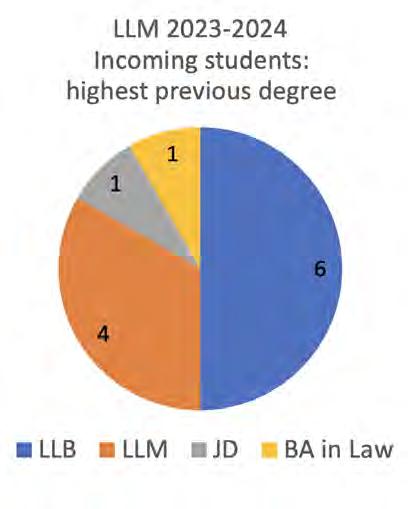
Institute for European Studies Annual Report 2023 54
LLM IN INTERNATIONAL AND EUROPEAN LAW

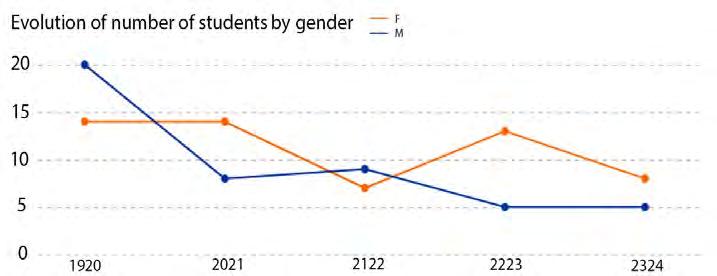
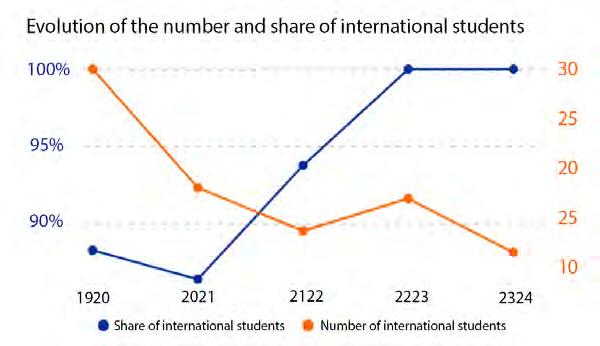
Institute for European Studies Annual Report 2023 55
MSC IN EUROPEAN INTEGRATION (EUROMASTER)
PROGRAMME
Our EuroMaster programme has been tailored to give international postgraduate students and professionals the opportunity to combine a demanding and rewarding study programme on European Integration with their professional activities. Lectures are organised in the evenings and the programme can be completed over either one or two years.
The programme comprises 60 ECTS and starts with a common core of courses on the essential features of European Integration and research skill development. After this, students can choose two options out of five specialisation streams, in Economics, Environment, Migration, Security, and Digitalisation. The digitalisation specialisation is a new offering, provided from academic year 2023-2024 onwards. The programme ends with a 15,000-word thesis worth 15 ECTS, allowing the students to engage in an exciting intellectual journey on the topic of their choice, with a supervisor from the VUB. In 20222023, students wrote theses about a wide range of topics on a number of aspects of contemporary European policymaking.
EUROMASTER: CONSOLIDATION AND DEVELOPMENT
The EuroMaster programme saw a slight drop in student numbers for academic year 2022-2023, which we attributed to a post-COVID environment, where professional students felt less inclined to take on additional activities in their evenings.
In the recruitment period for 2023-2024, however, the figures show an upwards trend again, with 30 new students registered for the programme.
Our students were able to continue to benefit from an excellent learning environment, facilitated by trained teachers and a solid learning platform. As during the COVID situation, we continued to fine-tune our online education infrastructure and services, so that students were able to flexibly get the most out of their ‘Euromaster’ experience. Although in 2023, we reverted to a fully onsite experience, lecturers continued to provide online engagement opportunities for students who required it. In 2023, our Programme Administrator, Sarah Konaté, also established stronger connections to the VUB’s REFLEX team, which provides support and study advice for students with special needs, such as long-term illnesses. Whilst the EuroMaster programme has always been able to take advantage of its modest size to provide for the wellbeing of our students, we have made efforts to improve our offering in this area in 2023.
Despite Brexit, the EuroMaster programme continues to participate in a double degree partnership with the University of Warwick, which allows students to combine the Warwick Master programme in Politics with our Euromaster programme. Students who follow the double degree track only need to submit one thesis for both degrees. In order to facilitate possibilities for students at the VUB, a similar opportunity has been negotiated for VUB students on the MA programme in European and International Governance, where students can continue to study at the VUB in the EuroMaster programme, and are only required to submit one thesis for both degrees.
Institute for European Studies Annual Report 2023 56
MSC IN EUROPEAN INTEGRATION (EUROMASTER)
As per the reviewers’ comments on the previous annual report, we took action to follow up on the careers of our student body. 2023 saw the establishment of a number of different initiatives for professional engagement.
First of all, the EuroMaster team has instigated a trial for the establishment of an ‘excellence programme’ which is intended to provide opportunities for current students to engage with a committed team of former graduates, who have become experts in their chosen fields. Students who have received excellent grades in the first semester, are given the opportunity to interact with former students who have expertise in specific topics. This may be in the form of additional mini-projects that will provide the current students with expertise and experience in a professional setting. A EuroMaster ‘employment committee’ has been established with a group of alumni helping link up current and former students.
Secondly, in collaboration with our marketing department, the IES has established an ‘Alumni Group’ that is tasked with organising an annual alumni event. The first event is scheduled to take place before the summer in 2024, and will be organised in central Brussels.
Finally, in line with recommendations from the reviewers concerning the relationship between research centres and educational offering, the EuroMaster team have developed a digitalisation specialisation that started in academic year 2023-2024. This has completed the link between research centres and post-initial Master educational offering at the IES.
In 2023, discussions also started to establish a large-scale reform process of the post-initial Master programmes at the IES, including further integration with the Postgraduate Certificate offered by the IES.
These discussions will continue into 2024, and are intended to enhance and streamline the offering at this level, increasing the attractiveness and multidisciplinarity of the programmes.
EUROMASTER REVIEW
The EuroMaster programme underwent an internal review process in 2023. This peer review is part of the VUB’s quality assurance strategy, which will conclude in 2024 with a final review from the VUB’s Quality Board. The internal peer review was a constructive and productive exercise, which helped the EuroMaster team reflect on the programme structure and build on our support for students in both their academic and professional careers. The review was useful in that it provided comments about our general communication strategy and specifically our student handbook, which will be revised for the 20242025 intake.
TUITION FEE AND ENROLLMENT POLICY
In academic year 2023-2024, the tuition fee for the EuroMaster programme was set at 6000 EUR for the full-time programme, and 7000 EUR if a student took the programme over two years. The difference in price is due to the 1000 EUR annual registration fee. Students therefore pay a 1000 EUR fixed registration fee per year, and 83.33 EUR per ECTs taken in each academic year.
In 2023, the EuroMaster programme changed the way it processed applications. We now make use of the VUB’s system for student applications, and the VUB processes the applications, with support from the admissions team at the IES. This development is intended to streamline the application process, which has often been seen by
Institute for European Studies Annual Report 2023 57
MSC IN EUROPEAN INTEGRATION (EUROMASTER)
potential applicants as overly burdensome. Enrolment requirements for the EuroMaster remain the same (a minimum of 240 ECTs or equivalent achieved prior to enrolment).
One change that has been introduced concerns the language requirements: the EuroMaster Programme Board decided to adhere to the standard VUB rules for language assessment, which helps streamline the application process.
STUDENT NUMBERS
A total of 50 students registered for the EuroMaster programme in 2023, and 20 graduated from the EuroMaster programme in 2023.
Foreign students (non-Belgian) comprised 95.8% of the total EuroMaster student body in the academic year 2022-2023, and 90% in academic year 2023-2024. The gender breakdown of incoming students in academic year 2023-2024 was 40% female and 60% male. This is in contrast to the previous academic year, where 54% of our students were female, and 46% male.
The EuroMaster Programme has always boasted a versatile, international selection of students from all around the world, and taken into account a balanced representation of geographic regions, including, when possible, support for students from developing countries. In the academic year 2023-2024, over 40% of our student cohort came from non-EEA countries.
In September 2023, 50 students were enrolled in the programme: 24 new students (10 Full time who will do the programme in one year and 14 Part time who will do it in two years) and 26 students re-enrolled from previous academic years to continue their part-time studies.
The most popular combination of specialisations in 2022-2023 was Security and Environment. The table below highlights the breakdown of the combination of our different specialisations for the 2022-2023 academic year
The digitalisation specialisation, which started in academic year 2023-2024, saw a small number of students take this on. Eight students out of the total cohort for academic year 2023-2024 have taken this specialisation.
Institute for European Studies Annual Report 2023 58
# students Specialisation Combination 9 Security & Migration 9 Economy & Environment 6 Economy & Security 2 Economy & Migration 5 Migration & Environment 19 Environment & Security
MSC IN EUROPEAN INTEGRATION (EUROMASTER)

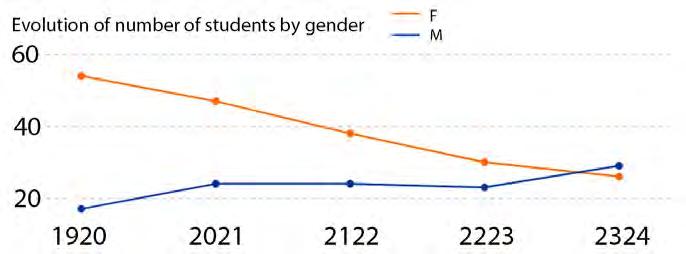
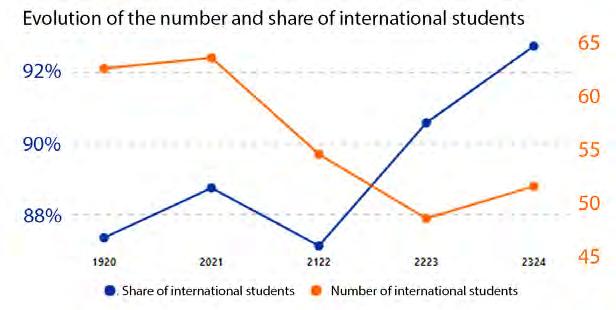
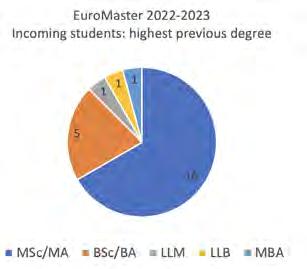
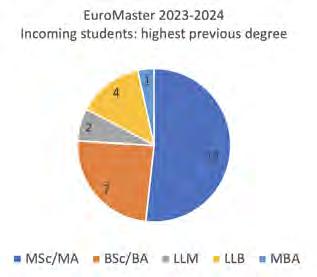
Institute for European Studies Annual Report 2023 59
POSTGRADUATE CERTIFICATE IN EU POLICY-MAKING
PROGRAMME
The Postgraduate Certificate (PGC) in EU Policy Making is a fully online programme focusing on the European integration process, the European Union, its institutions, and policies. The programme is aimed at professionals as well as students with a daytime schedule. It can be taken flexibly over one academic year or two
CURRICULUM
The PGC curriculum includes three compulsory courses: History and Theories of European Integration; EU Institutions; and EU Decision-Making and Law. Students must also take two elective courses, from a choice of four: EU Foreign Affairs; EU Justice and Home Affairs; European Public Policy Analysis; and Terrorism and Counter-Terrorism in Europe. Finally, students also take part in the Jean Monnet Summer School or Winter School on EU Policy Making organised by the BSoG, either before, during or after completing the programme’s online courses. In total, the programme is worth 25 ECTS, as students take a total of five courses, each worth 4 ECTS, and participate in the Summer or Winter School, worth 5 ECTS.
In line with the BSoG’s aim to closely align its educational portfolio and research agenda, the decision was taken in early 2023 to replace the course on Terrorism and Counter-Terrorism in Europe with a new course on EU Climate Policy, starting from 2023-2024.

STUDENTS
In 2022-2023, 28 students were enrolled in the programme. The programme had a higher proportion of female students (61%) than male students (39%). On average, students were 30 years old. Non-Belgian students represented 61% of the annual cohort. In terms of highest previous qualification, 8 PGC students already held a bachelor degree and 20 a master degree.
In 2023-2024, 21 students have been enrolled in the programme. The programme has a much higher proportion of female students (76%) than male students (24%). On average, students are 30 years old, with a median age of 28. Non-Belgian students represent 67% of the annual cohort. In terms of highest previous qualification, 6 PGC students already hold a bachelor degree, 14 a master degree and 1 a doctorate.
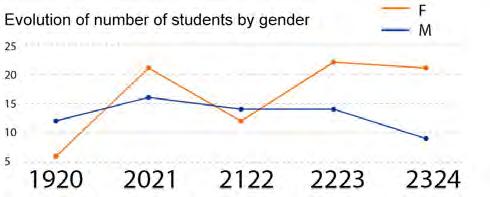
STAFF
During the academic year 2022-2023, Anne Sterckx became the new student registration officer of the programme, taking over from Marion Tomsett, who retired. In addition, Florian Trauner kindly replaced Sibel Top during her maternity leave as titular of the course on EU Justice and Home Affairs.
Institute for European Studies Annual Report 2023 60
POSTGRADUATE CERTIFICATE IN EU POLICY-MAKING
MARKETING
Thanks to the BSoG’s marketing and communications team, the PGC stepped up its efforts to attract candidates, notably with the organisation, for the first time, of an info session webinar in June 2023.
CAREER FOLLOW-UP
In 2023 we have sent out four alumni newsletters, including one with an alumni survey. We have also started preparations for an alumni event scheduled for 2024. Graduates participate in our recruitment activities.

TUITION FEE
The tuition fee for the PGC depends on whether students decide to complete the programme over the course of one academic year or two. In 2022-2023, the total tuition fee for a student completing the PGC in one year was €3.500. For a student completing the programme in two years, it was €3.900. These tuition fees applied to both EU and non-EU students. From 2023-2024, the PGC no longer offers tuition fee waivers.
ENROLMENT POLICY
Students for the PGC are selected on the basis of the merits of their qualifications, which depend on: 1) prior degrees, as well as the grades received for them; 2) English language skills; 3) motivation for following the programme.
While a formal requirement to join the PGC is an undergraduate degree of at least 180 ECTS in social, economic or political sciences, business, law and/or contemporary history, PGC students usually already hold at least a master degree.
Proof of sufficient language skills in English is required. This can be a valid language test certificate or proof that the candidate has already obtained a degree taught in English.
Finally, as the PGC is primarily aimed at working students who have to deal with competing professional or personal commitments, particular attention is paid during admissions to the motivation of prospective candidates. Candidates must thus clearly demonstrate that completing the programme would serve welldefined professional goals and/or personal interests to be selected.
In terms of process, applications are assessed by the programme director on a rolling basis throughout the academic year.
Institute for European Studies Annual Report 2023 61
SUMMER SCHOOL ON EU POLICY-MAKING
The Inter-University Summer School on EU Policy-Making is an intensive short study programme, developed and delivered by the Brussels School of Governance, the Vienna School of International Studies and the University of Vienna. Since 2013, this course is a compulsory component of the Post-Graduate Certificate for EU Policy-Making. It was also an Erasmus+ Programme Jean Monnet Module (2019-2022) and is now part of a Jean Monnet Chair (2022-2025).
The programme runs over two weeks (3-14 July 2023), the first one taking place in Brussels at the Brussels School of Governance and the second one in Vienna at the Vienna School of International Studies. Thirty-nine participants coming from all over the world completed the 2023 edition of the summer school.
The youngest participant of our 2023 Summer School was 20, the oldest was 44. The average age of all participants was 27.
The summer school curriculum consists of lectures, workshops, a simulation game, exclusive insights with EU staff and optional social interaction moments.
During the summer school, participants first receive a general introduction to EU institutions, policy-making processes and select key policy areas, before delving into the thematic focus of the programme, which was civil rights in today’s EU. The start of weeks 1 and 2 is lectureintensive in order to gain a lot of knowledge in a short period.
We then process the knowledge gained from the lecture series in workshops and the simulation game. In the 2023 simulation game, the students, as representatives of the European Commission, the European Parliament,
the Council of the European Union, civil society and media, negotiated several articles of the proposed EU directive on combating violence against women and domestic violence. This simulated structured learning allows participants to apply their knowledge of substantive policy areas and policy-making rules.
We also visited the European Commission, the European Parliament and the European Council / Council of the EU in Brussels and the European Union Agency for Fundamental Rights in Vienna. During these visits, we received a guided tour, and personnel from the EU institutions shared their expertise and experience with participants. In Vienna, students also met with an expert from the Organization for Security & Co-operation in Europe.
The tuition fee for the Summer School is 1.900 EUR. This fee includes course material, access to online platform, daily lunch in Brussels and Vienna, public transport, group flight from Brussels to Vienna and study visits. Students are selected on the basis of their motivation and interest in their letter of intent, with preference given to students who are (at least) in their final year of a Bachelor degree. A good level of English is also necessary.
The Summer School is partially made possible with the support of the Erasmus+ Programme of the European Union, the Flemish Ministry of Education and Training and the Flemish Higher Education Council (VLUHR). With the subsidy from the Erasmus + Programme (Jean Monnet Module) and from VLUHR, we were able to waive the tuition fee for two students in financial need in 2023.
Institute for European Studies Annual Report 2023 62
SUMMER SCHOOL ON EU POLICY-MAKING

Summer School 2023 students
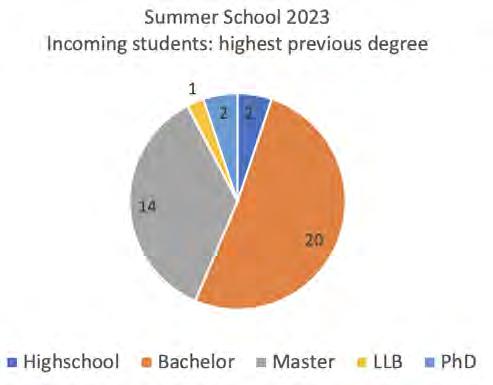
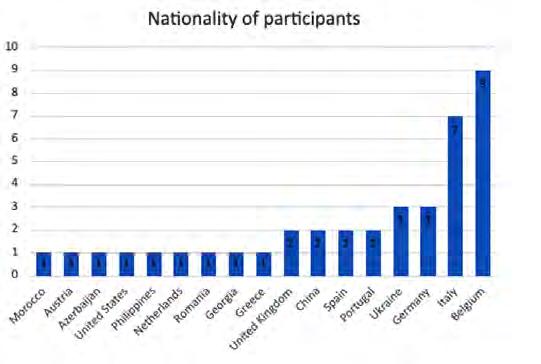

Institute for European Studies Annual Report 2023 63
WINTER SCHOOL ON EU POLICY-MAKING
From 6-17 February 2023, the Brussels School of Governance, in collaboration with the Vienna School for International Studies, organised its online Winter School on EU Policy-Making, the virtual counterpart of our longstanding Summer School on EU PolicyMaking.
Twenty participants of twelve nationalities joined from locations across Europe (Albania, Austria, Belgium, Germany, Greece, Italy, Republic of North Macedonia, Romania, Slovakia, Turkey, United Kingdom) and beyond (Canada). Together, they interacted in the twoweek intensive online course to learn more about EU policy-making, governance and law, and its relation to other international organisations. The programme had a special focus on digital rights and diplomacy, touching on policy discussions related to freedom of expression, artificial intelligence, disinformation resilience, digital sovereignty and cyber security.
The youngest participant of our 2023 Winter School was 23, the oldest was 52. The average age of all participants was 33. A special feature of the Winter School during the first week was the simulation exercise. We invited students from our partner universities in the EUTOPIA alliance to join our exercise and simulated the EU ordinary legislative procedure for two days with thirty-four students online.
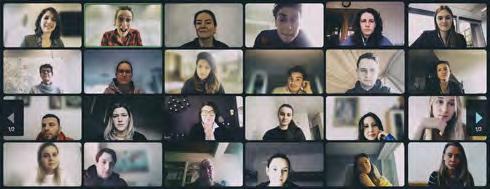
The students took on alter-ego roles as European Commissioners, national ministers, members of the European Parliament, tech executives, civil society and media and negotiated the proposed Data Act (on twin exemptions for SMEs on data-sharing obligations and for gatekeepers on data-sharing rights) for two days. In the second week, Winter School participants had the opportunity to interact with practitioners in the EU institutions, as well as follow a policy panel on dealing with algorithmic risk through EU policy.
To create (optional) social interaction moments and build online group cohesion, students were invited every day to participate in a challenge. If they completed more than five challenges, they received a surprise (book about the EU) at the end of the Winter School. Similar to previous years, playing music during the breaks proved a big hit, as well as office yoga to reenergise for the afternoon sessions.
The tuition fee for the Winter School is 1.600 EUR. This fee includes course material, access to online platform, exclusive insight sessions with EU practitioners and study visits. Students are selected on the basis of their motivation and interest in their letter of intent, with preference given to students who are (at least) in their final year of a Bachelor degree. A good level of English is necessary.
The Winter School and the EUTOPIA project are partially made possible with the support of the Erasmus+ Programme of the European Union. With the subsidy from the Erasmus + Programme (Jean Monnet Module), we were able to waive the tuition fee for one student in financial need in 2023.
Institute for European Studies Annual Report 2023 64
Winter School 2023 students
WINTER SCHOOL ON EU POLICY-MAKING
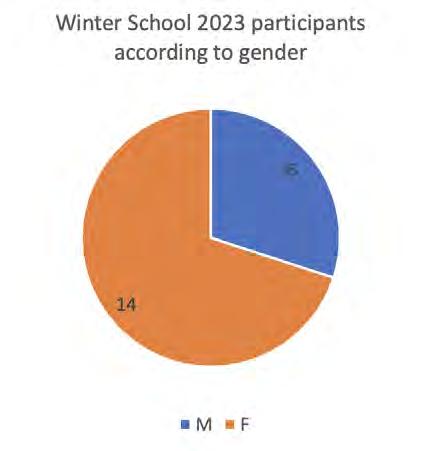
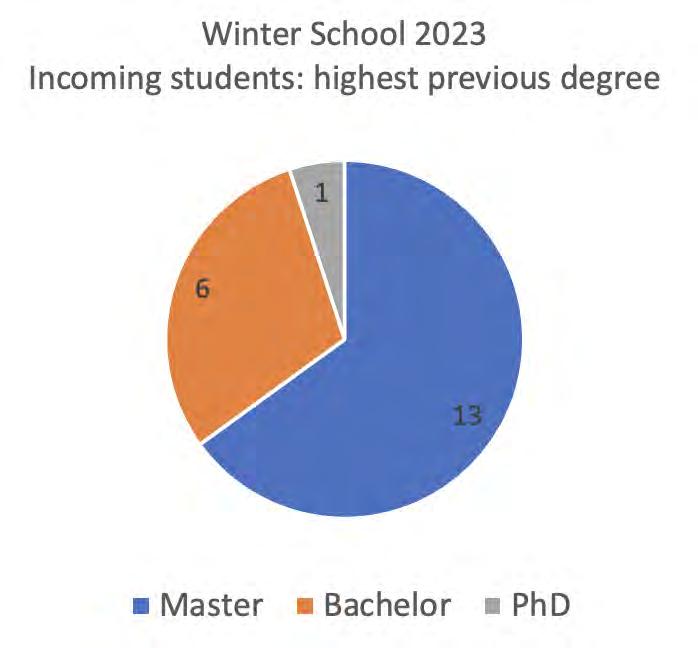

Institute for European Studies Annual Report 2023 65
OFFICE FOR TEACHING AND LEARNING INNOVATION
OTLI'S MISSION IN A NUTSHELL
The Office for Teaching and Learning Innovation (OTLI) facilitates the further development and implementation of the Brussels School of Governance’s educational strategy. It serves as a knowledge hub - with a focus on pedagogical innovation and the use of technology to enhance learning - for students, teaching staff, researchers and management in the School. OTLI’s expertise and experience range from pedagogical (policy) advice to professional development and quality assurance. In addition, the OTLI provides Canvas LMS support and is responsible for the design and management of the student information system (SIS) (PeopleSoft Campus Solutions).
PERSONNEL
The OTLI is directly supervised by the Vice Dean for Education and the Head of Secretariat, and in 2023 the team consisted of Rita Reis (Teaching & Learning Innovation Officer) and René Hermens (Senior Expert Teaching & Learning Innovation).
ACTIVITIES AND ACCOMPLISHMENTS
In 2023, after a tumultuous period for the team where it was temporarily run by a single person due to shifts in personnel, we hired Rita Reis as Teaching & Learning Innovation Officer to reinforce the team. A successful endeavour as the team of two has taken on the challenge to design and implement several new SIS features. Academic Advisement was implemented to provide students and advisors with a reliable view of student progression for a better analysis of past results and the planning of future courses. With the new Gradebooks set up, we are able to process all the grading directly in the student's record, showing valuable insights for student learning. Mid-term reporting and some other improvements make significant efficiency gains for the team and provide students, lecturers and advisors with higher-quality academic information.
In addition, OTLI has been focused on creating modern (online) reporting to different teams in BSoG to increase productivity and better decisions, not only in the Education Cluster but also in the Finance and MarCom teams.
Looking forward to 2024, we will shift our focus back to providing (policy) advice to management related to educational organisation, innovation, quality assurance and professional development.
Institute for European Studies Annual Report 2023 66
COMPLETED PhD PROJECTS
TUDOR PETRU FABIAN SUCCESSFULLY DEFENDS HIS PHD THESIS
On 24 January 2023, Tudor Petru Fabian successfully defended his PhD thesis entitled: ‘Networks of Knowledge & Hybrid Interferences: Can the European Union defend its interests in the new era of acute international competition without effective information sharing, collation & analysis capabilities?‘ Tudor’s PhD Promotor was Prof Dr Alexander Mattelaer, and the PhD jury consisted of the following members: Dr. Daniel Fiott, Dr. Elena Lazarou, Kenneth Lasoen, and Prof. Dr. Olesya Tkacheva.

Institute for European Studies Annual Report 2023 67
Tudor Petru Fabian presenting his PhD thesis
COMPLETED PhD PROJECTS
PHILIPP STUTZ SUCCESSFULLY DEFENDS HIS PHD THESIS
On 27 January 2023, Philipp Stutz successfully defended his PhD thesis entitled: ‘Unpacking EU Return Migration Policy ‘. Philipp’s PhD Promotors were Prof. Florian Trauner and Prof. Ilke Adam, who were also part of the jury which further consisted of the following members: Prof. Ingo Rohlfing, Prof. Tuba Bircan, Prof. Jean-Pierre Cassarino, Prof. Sebastian Oberthür and Prof. Jamal Shahin.
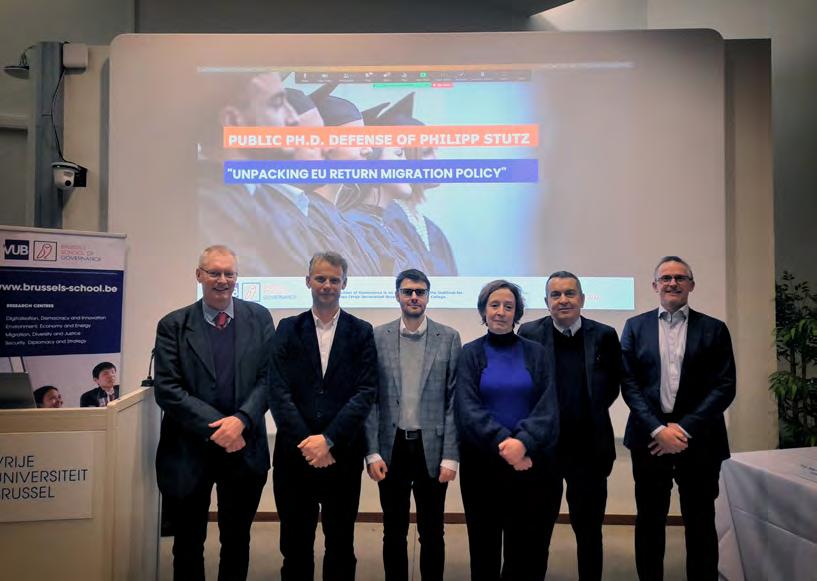
Institute for European Studies Annual Report 2023 68
Philipp Stutz with his PhD jury
COMPLETED PhD PROJECTS
MAXIMILIAN ERNST SUCCESSFULLY DEFENDS HIS PHD THESIS
On 27 April 2023, Maximilian Ernst successfully defended his PhD thesis entitled ‘Why China Coerces Asia-Pacific Secondary States: Chinese Balancing Strategies in the Context of the Sino-American Competition’. The committee consisted of Professors Luis Simon, Ramon Pacheco Pardo, Toshi Yoshihara. The Chair was Professor Tongfi Kim, and the two additional jury members were Professors Cind Du Bois and Vjosa Musliu.

Institute for European Studies Annual Report 2023 69
Maximilian Ernst with his PhD jury
COMPLETED PhD PROJECTS
ASMA AKBAR SUCCESSFULLY DEFENDS HER THESIS
On Friday 7 July 2023, Asma Akbar successfully defended her PhD thesis on ‘Pakistan’s national security paradigm: a human security analysis’. The defence took place online. The committee consisted of PhD co-promoters Prof. Dr. Luk Van Langenhove and Prof. Dr. Khawaja Alqama, while the jury members were the following: Prof. Dr. Alexander Mattelaer, who served as a Chairperson, Prof. Dr. Shahrbanou Tadjbakhsh (Doctoral Committee member), Prof. Dr. Richard Higgott, Prof. Dr. Olesya Tkacheva, Prof. Dr. Philippe de Lombaerde, Dr. Stephen Klose (Doctoral Committee member) and Dr. Giulia Tercovich.

Institute for European Studies Annual Report 2023 70
Asma Akbar presenting her PhD thesis at the online PhD defence
COMPLETED PhD PROJECTS
JANA GHEUENS SUCCESSFULLY DEFENDS HER PHD THESIS
On 20 December 2023, Jana Gheuens successfully defended her PhD thesis entitled ‘Policymaking for the Future: Evidence from EU Climate Governance’.
Jana’s PhD promoters were Prof. dr. Sebastian Oberthür, Director of the Research Centre for Environment, Economy, and Energy, and Professor for Environment and Sustainable Development at the Brussels School of Governance, and Dr. Didier Caluwaerts, Associate Professor of Democratic Governance at the VUB. Members of her jury were Prof. Dr. Didier Caluwaerts, Prof. Dr. Karen Celis, Prof. Dr. Claire Dupont, Prof. Dr. Charlotte Burns, and Prof. Dr. Jamal Shahin, who also acted as a Chair.
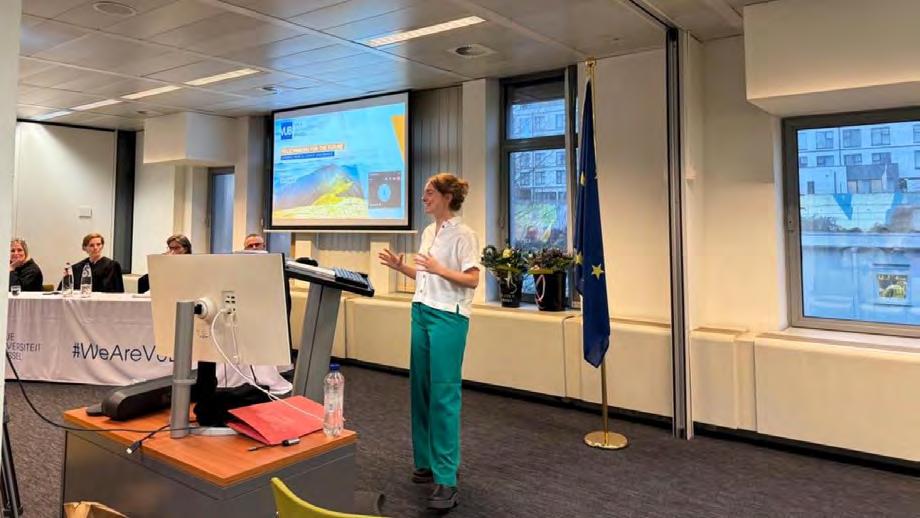
Institute for European Studies Annual Report 2023 71
Jana Gheuens presenting her PhD thesis

PUBLICATIONS
PUBLICATIONS
2023 PUBLICATIONS AT A GLANCE
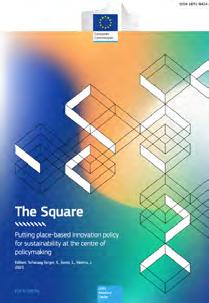
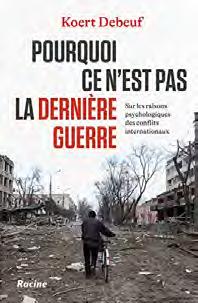

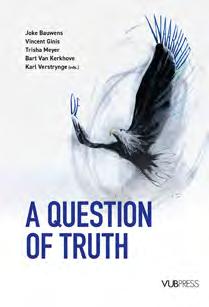

Institute for European Studies Annual Report 2023 73
Books: 13 Book chapters: 44 Journal articles: 91 Unpublished papers: 6 Policy reports: 28 Other contributions: 4
POLICY BRIEFS
Institute for European Studies Annual Report 2023 74
Title Reference Research centre Date published Next Generation: Geoconomics, Cooperation and Japan's Defence Industry CSDS POLICY BRIEF 01/2023 By Nanae Baldauff Centre for Security, Diplomacy and Strategy 19/01/2023 Evolving Korea-NATO Relations: Global, IndoPacific and Korean Perspectives CSDS POLICY BRIEF 02/2023 By Wooyal Paik and Yoon Jung Choi Centre for Security, Diplomacy and Strategy 06/02/2023 More than just a petrol station: Norway’s contribution to European Union’s green strategic autonomy C3E - GreenDeal-NET Policy Brief 1/2023 By Kacper Szulecki Centre for Environment, Economy and Energy - GreenDeal-NET project 10/02/2023 Japan's Resilience: Toward a New tech Policy for the Age of Economic and National Security CSDS POLICY BRIEF 03/2023 By Kazuto Suzuki Centre for Security, Diplomacy and Strategy 13/02/2023 In It Together? How Russia Pushed Finland and Sweden to Join NATO CSDS POLICY BRIEF 04/2023 By Eero Suominen Centre for Security, Diplomacy and Strategy 17/02/2023 Youth Participation at the Internet Governance Forum UNU-CRIS Policy Brief 01/2023 By Nadia Tjahja Centre for Digitalisation, Democracy and Innovatiob 20/02/2023 Nuclear Signalling in Russia's War Against Ukraine CSDS POLICY BRIEF 05/2023 By Liviu Horovitz and Anna Clara Arndt Centre for Security, Diplomacy and Strategy 22/02/2023
Policy brief on the impact of narratives in potential migrants' decisions
POLICY BRIEFS
Counter-Order: Chinese Power, the West and Geo-economics
Florian Trauner, Ilke Adam, Omar N. Cham, Hannah Sattlecker, Kjersti Thorbjornsrud, Jan-Paul Brekke
By Daniel Fiott et al.
Institute for European Studies Annual Report 2023 75
Annus Horribilis: Russia's War,
CSDS POLICY BRIEF 06/2023 By
Fiott Centre for Security, Diplomacy and Strategy 24/02/2023 One Step Back, Two Steps Forward: The EU, NATO and Emerging and Disruptive Technologies CSDS POLICY BRIEF 07/2023 By Antonio Calcara Centre for Security, Diplomacy and Strategy 03/03/2023 Taking Stock: Europe's Rearmament, One Year On CSDS POLICY BRIEF 08/2023 By Lotje Boswinkel Centre for Security, Diplomacy and Strategy 15/03/2023 Japan's Zeitenwende in Defence Policy: Rationale, Challenges and Implications for Partners CSDS POLICY BRIEF 09/2023 By Celine Pajon et al. Centre for Security, Diplomacy and Strategy 20/03/2023 Look Who's Talking: Why Germany Plays the
the
of
CSDS POLICY BRIEF 10/2023 By Roderick Parkes Centre for Security, Diplomacy and Strategy 31/03/2023
01/2023
Centre for Security, Diplomacy and Strategy 20/04/2023
CSDS POLICY BRIEF 11/2023 By
et
Centre for Security, Diplomacy and Strategy 21/04/2023
CSDS
12/2023
Centre for Security, Diplomacy and
26/04/2023
Ukraine's Struggle, Europe's Future
Daniel
Strong, Silent Type in
Field
Economic Security
CMDJ POLICY BRIEF
By
Order: The Financing of Alliances and Western Power
Daniel Fiott
al.
POLICY BRIEF
Strategy
Hiroshima: The G7 Summit, Economic Security and the EUJapan Partnership
transparency or drowning in disclosure? Challenges and opportunities of the EU Corporate Sustainability Reporting Directive
et al.
POLICY BRIEFS
Institute for European Studies Annual Report 2023 76
Disorder: The War and Russia's Economic Statecraft CSDS POLICY BRIEF 13/2023 By Daniel Fiott et al. Centre for Security, Diplomacy and Strategy 02/05/2023 Bridging Alliances: Values, Interests and Strategy in Asia and Europe CSDS POLICY BRIEF 14/2023 By Luis Simón et al. Centre for Security, Diplomacy and Strategy 16/05/2023 Arms in Asia: The EU, Weapons Exports and South-East Asia CSDS POLICY BRIEF 15/2023 By Fabio Figiaconi Centre for Security, Diplomacy and Strategy 22/05/2023 Power and Perceptions: How Allies View America's Reputation and Prioritisation After Ukraine CSDS POLICY BRIEF 16/2023 By Tongfi Kim and Luis Simón Centre for Security, Diplomacy and Strategy 31/05/2023 Narratives and Interests: The EU's Position on Taiwan Before and After the War on Ukraine CSDS POLICY BRIEF 17/2023 By Giulia Tercovich Centre for Security, Diplomacy and Strategy 08/06/2023
CSDS POLICY BRIEF 18/2023
Glosserman
Centre for Security, Diplomacy and
20/06/2023
C3E - GreenDeal-NET Policy Brief 2/2023 By Laura Iozzelli Centre for Environment, Economy and Energy - GreenDeal-NET project 26/06/2023
After
By Brad
Strategy
Boosting
No Ordinary Arms Deal: Is Europe Learning Anything from AUKUS? CSDS
POLICY BRIEFS
By Lotje
and Luis
and
Purchasing Power: Towards Joint Procurement and Planning in European Defence
Shut Down: Is the United States Still a Reliable Ally? CSDS POLICY BRIEF
Institute for European Studies Annual Report 2023 77
19/2023
Boswinkel
Simón Centre for Security, Diplomacy and Strategy 28/06/2023 Votes, Vetoes, Values: Foreign Interference, QMV and
Foreign Policy in a Competitive Age CSDS POLICY BRIEF 20/2023 By Daniel Fiott and Giulia Tercovich Centre for Security, Diplomacy and Strategy 04/07/2023 In
CSDS POLICY BRIEF 21/2023
Fiott Centre for Security, Diplomacy and Strategy 07/07/2023 Principles and Commitments: What Could an Agreement to Guarantee Ukraine's Security Look Like? CSDS POLICY BRIEF 22/2023 By Elie Perot Centre for Security, Diplomacy and Strategy 29/07/2023
CSDS POLICY
23/2023
Calcara Centre for Security, Diplomacy and Strategy 04/09/2023
24/2023
Fiot Centre for Security, Diplomacy
22/09/2023
POLICY BRIEF
EU
Orbit: The European Union, Defence and Space Domain Awareness
By Daniel
Virtual Worlds: Balancing European Regulation
Industrial Policy for the Metaverse
BRIEF
By Antonio
CSDS POLICY BRIEF
By Daniel
and Strategy
25/2023 By
Centre for Security, Diplomacy
03/10/2023
Michael Williams
and Strategy
Whom a Lesson? South Korea, the Three Nos and the Limits of Chinese Statecraft
POLICY BRIEFS
Ten Years of European Defence and What Has Really Been Achieved?
Institute for European Studies Annual Report 2023 78
Lost in Translation? The Japan - NATO Rapprochement CSDS POLICY BRIEF 26/2023 By Eva Pejsova Centre for Security, Diplomacy and Strategy 26/10/2023 Global Pivotal State: What Type of Geopolitical Actor is South Korea Becoming? CSDS POLICY BRIEF 27/2023 By Ramon Pacheco Pardo Centre for Security, Diplomacy and Strategy 08/11/2023 Keeping it Together? Realpolitik and Solidarity in a Multipolar World CSDS POLICY BRIEF 28/2023 By Sven Biscop Centre for Security, Diplomacy and Strategy 14/11/2023 Market incentives for eco-design: the case of eco-modulation C3E - Policy Brief 3/2023 By Antti Jukka and Harri Kalimo Centre for Environment, Economy and Energy - GreenDeal-NET project 15/11/2023 Resilience and Reassurance: Towards a Role for the EU in Deterrence? CSDS POLICY BRIEF 29/2023 By Gesine Weber Centre for Security, Diplomacy and Strategy 24/11/2023 Who
CSDS POLICY BRIEF 30/2023 By Maximilian
Centre for Security, Diplomacy and Strategy 01/12/2023 Space and Strategy:
CSDS POLICY BRIEF 31/2023 By Nanae Baldauff Centre for Security, Diplomacy and Strategy 13/12/2023
CSDS POLICY BRIEF 32/2023 By
Fiott Centre for Security, Diplomacy and Strategy 20/12/2023
Taught
Ernst
Japan’s National Security in Space and Europe
Defence Matters:
Daniel

IES IN THE MEDIA
IES IN THE MEDIA IN 2023
Our scholars frequently appear in both local and international media outlets. They are featured in a variety of contexts, to provide expert commentary on policy related matters in our areas of expertise (migration and diversity, the digital transformation of society, climate change and green transitions in the economy, as well as diplomacy, strategy and geopolitical competition). Outlets where our scholars appeared in 2023, include VRT, RTBF, De Standaard, De Morgen, De Tijd, Het Nieuwsblad, Le Soir, Arte-TV, Knack, Bruzz, EU Observer, Euractiv, Euronews, Politico, Le Monde, TV5 Monde, Die Welt, ORF, El Confidencial, TRT World, The Wall Street Journal, CBS News, The Straits Times, Japan Times, Arirang News, etc.
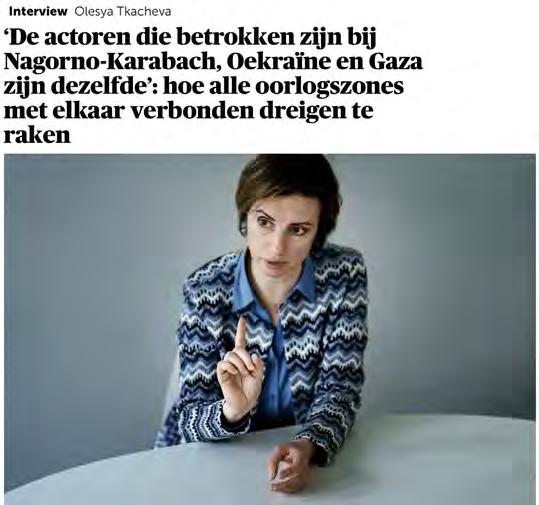
Olesya Tkacheva - De Morgen
October 2023

Koert Debeuf - Het Nieuwsblad
October 2023
Institute for European Studies Annual Report 2023 80
IES IN THE MEDIA IN 2023

Gaia Romeo - ARTE TV
September 2023
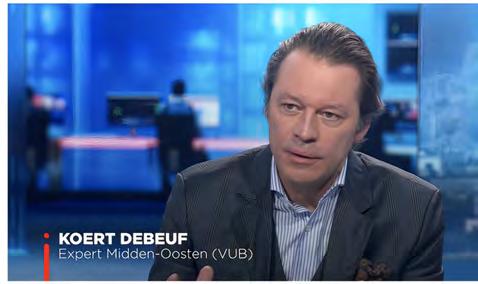
Koert Debeuf - VTM Nieuws
November 2023

Ramon Pacheco Pardo - Arirang News
November 2023

Karel De Gucht - VRT Canvas De Afspraak
October 2023
Institute for European Studies Annual Report 2023 81
IES IN THE MEDIA IN 2023

Luk Van Langenhove - Frontiers
March 2023
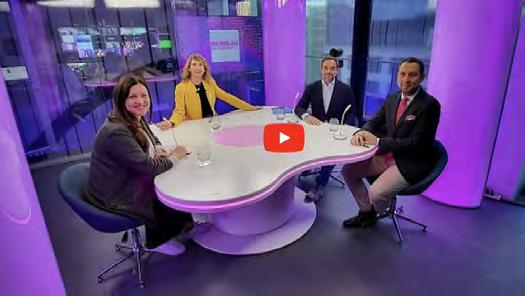
Demir Murat Seyrek - Euronews
May 2023
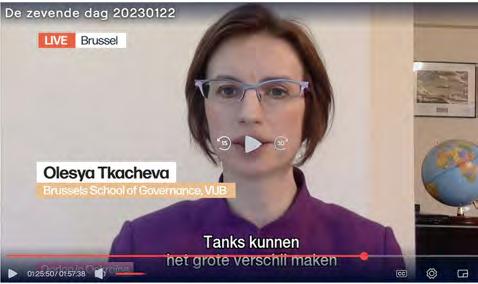
Olesya Tkacheva - VRT1 De Zevende Dag
January 2023
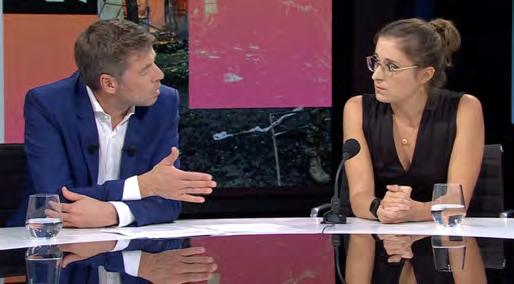
Laura Vansina - VRT Canvas De Afspraak
September 2023
Institute for European Studies Annual Report 2023 82 82

ACADEMIC SERVICES
IES PUBLIC EVENTS IN 2023
13/01/2023 BIRMM Research day
17/01/2023 SUSTAEN Lecture: Trade and Sustainability: An idea whose time has come
24/01/2023 Public PhD Defence of Tudor Petru Fabian: Networks of Knowledge & Hybrid Interferences: Can the European Union defend its interests in the new era of acute international competition without effective information sharing, collation & analysis capabilities?
26/01/2023 A conversation with Australian Foreign Minister Penny Wong and EEAS Secretary General Stefano Sannino
27/01/2023 Public Ph.D. Defense of Philipp Stutz: "Unpacking EU Return Migration Policy"
30/01/2023 The Sahel Conflict and its Underpinning Relevance to Africa- EU Relations
31/01/2023 A conversation with Australian Foreign Minister Penny Wong and EEAS Secretary General Stefano Sannino
08/02/2023 Digital Market Integration in East Africa: Why So Reluctant?
09/02/2023 The Integration of Biodiversity in Preferential Trade Agreements: A text-as-data approach to the adaptability of trade governance
09-10/02/2023 Order, Counter-Order, Disorder? Regional and Global Security Orders in the Shadow of SinoAmerican Competition.
13/02/2023 An ugly word. Rethinking race in Italy and the United States.
16/02/2023 Jean Monnet Winter School online panel discussion: Dealing with algorithmic risks through EU policy
21/02/2023 "Successes and Drawbacks of the 2020 Black Lives Matter Protests in Germany"?
01/03/2023 De erfenis van 1947: Boekvoorstelling + panelgesprek
06/03/2023 EDMO BELUX Lunch Lectures on Online Disinformation and Polarisation.
07/03/2023 SUSTAEN Lecture: The Sustainable Development chapters in FTA's
07/03/2023 NATO’s New Force Model: Operationalising Collective Defence
16/03/2023 Online info session on 'Advanced Master in European Integration'
21-22/03/2023 Trends in China’s Posture: Implications for Japan and Beyond
22/03/2023 Online info session on 'LLM in International and European Law'
28/03/2023 The Military Balance of Power in Europe
Institute for European Studies Annual Report 2023 84
IES PUBLIC EVENTS IN 2023
31/03/2023 Samenwerken aan een participatief lokaal integratiebeleid in kleine en middelgrote steden
25/04/2023 SUSTAEN Lecture: Cecilia Malmström: Transatlantic Trade Relations
27/04/2023 Public Ph.D. Defense of Maximillian Ernst: Why China Coerces Asia-Pacific Secondary States: Chinese Balancing Strategies in the Context of the Sino-American Competition
27/04/2023 Defence and Statecraft Forum 2023
03/05/2023 #EUIA23 - The European Union in International Affairs Conference
08/05/202 Bridging Allies meeting in Australia
11/05/2023 U.S. Allies and Taiwan: Evolving Perspectives in the Indo-Pacific and Europe
11/05/2023 Bridging Allies meeting in Australia
16/05/2023 Migrant Academics’ Narratives of Precarity and Resilience in Europe
22/05/2023 Korea-EU Summit: Celebrating the 60th Anniversary
23/05/2023 Sustaen Lecture: MEP Svenja Hahn on “Value based trade: How the EU incorporates human rights and sustainability in its trade instruments”
30/05/2023 Policy Forum Series Biodiversity & Economic Policies
30/05/2023 SUSTAEN Lecture: Frans Timmermans: The external dimension of the “Green Deal”: navigating a changing world
06/06/2023 Online info session on Postgraduate Certificate in EU policy making
07/06/2023 Third CSDS-CSIS Transatlantic Dialogue on the Indo-Pacific
15/06/2023 Expert Workshop: Opening the Black Box of Transnational Ecological Conflicts: Methods, Concepts and Transformations
15/06/2023 The Greening of Trade in a Geo-economic Context? Effectiveness, Legitimacy, and Justice in the Trade-Environment-Nexus
19/06/2023 SoMe4Dem Workshop on Platform Affordances
19/06/2023 Transatlantic Defence in an Era of Strategic Competition: A Steadfast and Resilient Alliance?
27/06/2023 GreenDeal-NET Conference: Governing the EU’s Transition towards Climate Neutrality and Sustainability
03/07/2023 Jean Monnet Summer School keynote lecture: LGBTIQ+ equality policy: can the EU get it straight?
07/07/2023 Public Ph.D. defence of Asma Akbar on Pakistan’s national security paradigm: a human security analysis
Institute for European Studies Annual Report 2023 85
12/07/2023
IES PUBLIC EVENTS IN 2023
A Lecture by the UN Special Rapporteur Alexandra Xanthaki on the Right to CultureCelebrating the 30th anniversary of the International Journal on Minority and Group Rights
01/09/2023 Book Launch: “Korea: A New History of South & North”
07/09/2023 July 5, 2023(The War in Ukraine and the EU – Japan Partnership
20/09/2023 Integrating Deterrence: What Role for Allies in the Indo-Pacific?
25/09/2023 Harnessing Remittances to Build Climate Resilience: Diaspora’s Role in the Host and Country of Origin
03/10/2023 Strengthening relations between Europe and Africa in an uncertain geopolitical contextRenforcer les relations entre l’Europe et l’Afrique dans un contexte géopolitique incertain
09/10/2023
12/10/2023
19/10/2023
LLM and EuroMaster Graduation Ceremony 2023
Book Launch in Seoul: “Korea: A New History of South & North”
Brussels Korea Forum: Partners in Global Challenges and 60th Anniversary of EU-ROK Diplomatic Relations
26/10/2023 Doctor Honoris Causa Award Ceremony for Ambassador Soongu Yoon
27/10/2023
Transatlantic Defence in an Era of Strategic Competition: Is NATO Ready for an Era of Rivalry?
07/11/2023 Third edition of the joint MiGloba-CESSMIR-BIRMM Research Day
09/11/2023 TDI Yearly 2023: Key developments in the EU's trade defence policy of the year 2023
09/11/2023 Fair and Free, but How Secure? Foreign Interference and Elections
30/11/2023 Is digital sovereignty sustainable?
01/12/2023 Global Structural Changes Regarding the Ukraine War and Implications for East Asian Security
05/12/2023 Competition policy in the digital age: Balancing innovation and regulation
06/12/2023 Round Table: Crossing the Planetary Boundaries: A View from the Business and Human Rights Framework and Global EJ
12/12/2023 High-level lecture series : Aïssatou Cissé. Perspective on the effects of Afro-Belgian politicians on policymaking in Belgium
12/12/2023 Webinar: Advanced Master in European Integration
20/12/2023 Public Defense Jana Gheuens: “Policymaking for the Future: Evidence from EU Climate Governance”
Institute for European Studies Annual Report 2023 86
IES RESEARCH COLLOQUIA IN 2023
Institute for European Studies Annual Report 2023 87
09/02/2023 Simon Happersberger The Integration of Biodiversity in Preferential Trade Agreements. 21/02/2023 Folashade Ajayi Successes and Drawbacks of Black Activism in Germany 09/03/2023 Carlos Entrena Protecting human agency in social media platforms 21/03/2023 João Teixeira de Freitas Corporate Due Diligence Case-Law - An Overview 06/04/2023 Laura Vansina Putin' the
to
in
Making Discourse 18/04/2023 Aslak Veierud Busch On the outside looking in? The EU's role in the Arctic 27/04/2023 Marco Giuli Policy coherence in EU response to energy security crises 11/05/2023 Samuel Cipers Contextualising the succes of online disinformation in a historical and political framework. 23/05/2023 Gaia Romeo The safe third country
policies and practices in EU countries 30/05/2023 Lotje Boswinkel The protégé's armament dilemma: balancing between autonomy and alliance cohesion 08/06/2023 Ludovica Meacci What does China want? Technology and great power competition 27/06/2023 Fabio Figiaconi Hedging as a form of secondary state neutrality amid Great Power competition 29/06/2023 Octavian Manea Bringing parity
and the changing character of warfare
Past
Work: Historical Narratives
Russia's Policy
concept:
back: (great) power transition

MANAGEMENT
STRUCTURE AND MANAGEMENT
The IES is a ‘special university institute’ with functional autonomy within the VUB. Since its inception, the institute has been governed by its own Board, whose members are proposed by the Rector and appointed by the University Council, following the provisions written down in the IES statutes (Organiek Reglement) that were updated in 2019. The management structure of the Institute is the following:
BOARD
The IES Board is the highest authority of the Institute and is responsible, inter alia, for approving the general strategy, policy plan, budget, and annual report. The Board also decides on research strategy and gives its final approval to the appointment of senior staff (ZAP). The Board consists of 14 members: 6 external (to the VUB), 4 ZAP members with their main assignment at the VUB, the Rector (or his/her representative), a representative of the ZAP members of the IES and two students. In addition, one member of the junior academic personnel, one member of the administrative personnel, a representative of the faculty of Economics and Social Sciences and one of the faculty of Law and Criminology, the Vice-Rector for Education and Student Affairs and the Vice-Rector for Internationalisation attend the Board meetings with a consultative vote. Members of the Executive Committee are also invited. Board members are appointed for a 4-year period, which came to an end in 2023. The mandate of four members was (mostly at their own request) not extended: Eddy Bonne, Karen Donders, Sarah Engels and Sandra Gallina. They were replaced by Sven Biscop, Eva De Bleeker, Gloria Gonzalez Fuster and Wendy Van den Broeck. The outgoing student representatives were replaced by Sofie Skovborg and Wessel Miedema.
EXECUTIVE COMMITTEE
Daily management is the responsibility of the Executive Committee (ExCom): the Dean, two Vice-Deans, the Executive Director and the Head of Secretariat. The mandate of the Dean and Vice-Deans runs for four years (similar to the mandate of Board members). In spring 2023, the Board decided to extend the mandate of the Dean (Luc Soete) and to launch elections for the positions of Vice-Dean. As a result of this election process, Florian Trauner became Vice-Dean for Research to replace Alexander Mattelaer, and Sven Van Kerckhoven extended his mandate for another four years as Vice-Dean for Education. However, towards the end of 2023, Dean Luc Soete announced his resignation as of January 2024. He will be replaced by the Vice-Dean for Research Florian Trauner (who will assume the research management functions within the Deanship).
RESEARCH CENTRES
Research management at the IES is primarily done through four research centres with a certain level of autonomy and led by a centre director (a ZAP member). All members of the academic staff belong to one or more centres where they report and organise their activities. There are four centres at the Institute:
· CMDJ - The Centre for Migration, Diversity and Justice (Co-Directors Ilke Adam, Florian Trauner)
· CD2I - The Centre for Digitalisation, Democracy and Innovation (Director Trisha Meyer)
· CSDS - The Centre for Security, Diplomacy and Strategy (Director Luis Simon, Asst. Dir. Giulia Tercovich)
· C3E - The Centre for Environment, Economy and Energy (Co-Directors Harri Kalimo and Sebastian Oberthür)
Institute for European Studies Annual Report 2023 89
STRUCTURE AND MANAGEMENT
RESEARCH / EDUCATION COUNCILS
Under the auspices of the Vice-Dean for Research, a Research Council discusses all research-related issues at the IES. As a consultative body, it advises the ExCom and/or the Board on all research-related matters. It consists of all ZAP members of the IES.
Under the auspices of the Vice-Dean for Education, an Education Council discusses all education-related issues. It consists of the (teaching) programme directors of the IES and of Vesalius College. Similar to the Research Council, it advises the ExCom and/or the Board on education-related matters.
TECHNICAL POLICY AND MANAGEMENT
The Executive Committee, tasked with the daily management of the IES-BSoG, formulates and oversees the implementation of technical policy. A cornerstone of this policy since the recognition as university department in 2022, is a close collaboration with VUB’s central services. This collaboration focuses primarily on ICT and infrastructure management. VUB’s central services handle a variety of essential operations on behalf of the IES, including IT network administration, classroom maintenance, and the setup and management of student accounts, email lists, and signage. Moreover, the control of access to the premises at Pleinlaan 5 is coordinated by the VUB’s InfraDesk team. An additional aspect of the collaboration is reflected in the handling of enrolment data; prospective students for the IES programmes apply via the VUB’s CaLi application platform, with enrolment processing being shared between the VUB’s student administration and a dedicated IES student administration team.
Another aspect of its technical policy is that the IES actively follows technical market developments and encourages suggestions from staff and students. These inputs are used for shaping future plans, especially concerning infrastructure improvements, ensuring that technical policy remains responsive to the evolving needs of the community.
FINANCIAL POLICY AND MANAGEMENT
The Executive Committee, tasked with the daily management of the IES-BSoG, formulates and oversees the implementation of the financial policy. The Finance Department is supervised by the Executive Director, who in turn reports to the IES Board. The annual accounts as well as the IES’ financial policy and processes are audited and vetted annually by external independent auditors and ultimately by the Government Commissioner Additionally, all EU funded projects that require external auditing are thoroughly reviewed and audited upon completion and prior to submitting final reporting to the relevant authorities. The formulation of the annual budget is a collaborative effort led by the Executive Director, involving the Directors of the various Research Centres, the Vice-Deans for Research and Education, Programme Directors, and coordinators of the Secretariat clusters. The proposed budget is subsequently presented to the IES Board for examination and approval. Since the setup of the research centres, Centre Directors are also overseeing the Centre income and expenses. Tools for monitoring were developed in the course of 2023; the idea is to extend these tools also to the educational field, so that programme directors can also follow the income and expenses more closely.
Institute for European Studies Annual Report 2023 90
STRUCTURE AND MANAGEMENT
BOARD MEMBERS







Karel De Gucht
President
Former European Commissioner

Caroline Buts
VUB Professor

Sven Biscop
Director at Egmont Institute
Eva De Bleeker
International Officer at EU Commission (GD MARE)
Gloria Gonzalez Fuster
VUB Professor



Frank Hoffmeister
Head of Unit, DG Trade, EC

Tony Joris
VUB Professor

Trisha Meyer
VUB Professor
Wessel Miedema
Student
Sofie Skovborg
Student
Leo Van Audenhove
VUB Professor
Nic Van Craen
Algemeen Beheerder VUB
Representative of the Rector
Wendy Van den Broeck
VUB Professor
Senior researcher imec-SMIT, VUB
Freddy Van den Spiegel
Former Bank Manager
Institute for European Studies Annual Report 2023 91

OUTREACH
OUTREACH
The IES communicates with the outside world by targeting the general public, Brussels-based policymakers, academics and researchers interested in the EU, as well as potential applicants (both students and professionals) for its various educational programmes.
In 2021, the IES created an alliance with Vesalius College and as of then on promoted its activities under the joint Brussels School of Governance (BSoG) brand. In 2023, the Brussels School of Governance continued to build up its followers on social media channels, being LinkedIn, Twitter, Facebook, Instagram and YouTube. At the end of 2023, these channels attracted a substantial fan base.
The number of followers across networks has grown by 3000 followers in total, which is an impressive result. From 7,577 followers at the end of 2022, the number of followers has grown to 10,514 followers. The table below shows the number of followers across networks.
A new website (www.brussels-school.be) was created for the BSoG alliance in 2021. In 2023, this website underwent a technical and functional update. Since the autumn of 2022, our Centre for Security, Diplomacy and Strategy has its own website and social media channels (see below).
The IES/BSoG sends out monthly newsletter to a broad target audience. At the end of 2023, its newsletter mailing list comprised of 3,458 recipients. 10 newsletter editions were sent out in 2023. The average open rate for all campaigns in 2023 was 36%. In addition, some of the IES’ research centres have their dedicated social media channels, which are also very active and are building their fan base day by day. The Centre for Security, Diplomacy and Strategy is the most prominent one in this respect with a very active Twitter account that had 6,949 followers at the end of 2023. The Centre for Migration, Diversity and Justice has a Twitter account for its BIRMM project that ended 2023 with 779 followers.
Finally, an important aspect of our outreach are the multitude of events that we organise for our wide range of stakeholders.
We refer to the Public Events section of this Annual Report for more details.

Institute for European Studies Annual Report 2023 93
Year LinkedIn page X (Twitter) Facebook page Instagram page 2023 4,457 2,548 2,126 1,383 2022 2,583 2,066 1,913 1,015

COLLABORATION
ACADEMIC COLLABORATION
In the context of its academic programmes and research activities the IES collaborates daily with universities and institutions around the world. In this section we first zoom in on our unique relationship with Vesalius College within the framework of the Brussels School of Governance. Second, we turn to our longstanding partnerships with UNU-CRIS, the University of Warwick, the University of Southern California, Seoul National University, and the Vienna School of International Studies - Diplomatische Akademie Wien. Finally, we list a representative sample of operational collaboration with various partners in the framework of projects, publications, and events.
THE STRUCTURAL ALLIANCE WITH VESALIUS COLLEGE
The Brussels School of Governance constitutes an alliance between the Institute for European Studies and Vesalius College, with the former focusing on research and postgraduate education and the latter on undergraduate and graduate education. The setup of the alliance aims to foster the advantages of cooperation (and of scale) between the two largest international and European-focused organisations that are linked to the VUB. Since its inception, the IES and VeCo share the same management and secretariat. The latter are paid jointly so that a financial win is obtained with both partners. Next to these obvious administrative and logistical benefits, the most interesting part of the partnership is the unique academic collaboration, with the research activities of Vesalius College staff feeding into the research architecture offered by the IES.

LONGSTANDING PARTNERS ABROAD EUTOPIA
Within the framework of the EUTOPIA European university alliance that VUB is part of, the IES has develop a close working relationship with the Department of Politics and International Studies (PAIS) of the University of Warwick. Collaboration is built on the EUtopia cotutelle PhD programme, of which the IES hosts two junior scholars (Laura Vansina and Samuel Cipers), a double MA degree (combining the Warwick MA trajectory with the advanced MA in European Integration at the IES), a joint BA programme being developed between PAIS and Vesalius College, and the University of Warwick having acted as an important partner in the EUIA conference, of which we had an edition in 2023. Furthermore, IES professors Trisha Meyer and Sven Van Kerckhoven act as learning community members in the ‘Europe in the World’ EUtopia-module set up at the University of Gothenburg. Throughout the year, IES staff continued to monitor developments within the EUtopia alliance.
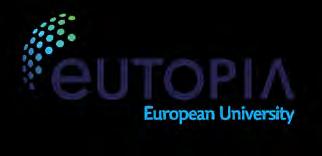
95
ACADEMIC COLLABORATION
UNU-CRIS
Together with the University of Ghent, the VUB partners with the United Nations University in operating the UNU Centre for Comparative Regional Integration Studies of the United Nations University (UNU-CRIS). Based in Bruges, UNU-CRIS conducts research and provides services in the field of regional integration in general, and on regional public goods and the role of regional organisations in globalisation more specifically. As the IES team constitutes the VUB lead element in shaping this relationship, several professors and researchers are closely involved in joint projects with UNU-CRIS staff. This includes, amongst others, the Unit on NonTraditional Diplomacy (UNTRAD) that was set-up in 2021 by IES professor Luk Van Langenhove, the joint PhD projects of Diana Potjomkina on multistakeholderism in EU trade policy and Nadia Tjahja on internet governance, and the wider GREMLIN (part 2) project investigating multistakeholderism in regional and global governance . IES Prof. Dr. Jamal Shahin is leading the digital governance cluster at UNU-CRIS, and acted as Microsoft Chair in Digital Sovereignty (shared by IES and UNU-CRIS). From November 2020 onwards, UNUCRIS director Philippe De Lombaerde joined the IES ZAP cadre as 10% research professor, hence enabling close operational collaboration between team UNU-CRIS and team IES. Executive Director Anthony Antoine acts as liaison between IES and UNU-CRIS and coordinates Brussels-based activities of the UNU centre.

DIPLOMATIC ACADEMY OF VIENNA AND UNIVERSITY OF VIENNA
The 20th edition of the on-campus IES Summer School on EU Policy Making in co-organisation with the Diplomatic Academy of Vienna and the University of Vienna, took place in 2023. The theme of the Summer School was civil rights in today’s EU. Packed with interactive seminars, the programme focused on civil rights, touching on policy discussions related to human security, migration, antidiscrimination, and diversity. Due to the great success of the Summer School format, an alternative Winter School edition was introduced for the third time in February 2023 with the same partners. At this occasion, we invited students from our partner universities in the EUTOPIA alliance to join our online simulation exercise on the EU ordinary legislative procedure.

Institute for European Studies Annual Report 2023 96
ACADEMIC COLLABORATION
UNIVERSITY OF SOUTHERN CALIFORNIA
For many years now, the IES-BSoG has organised the Brussels Programme on European Foreign Policy, a programme in collaboration with long-standing partner University of Southern California (USC). The 2023 edition of this Programme took place from 30 May until 7 July. It featured an extensive combination of academic lectures covering EU foreign and external policies, complemented by part-time internships for practical experience. As part of the 2023 curriculum, we organised field trips to key institutions such as the European Parliament, NATO headquarters, and the European External Action Service. Under the leadership of Prof. Caterina Carta, the programme was delivered by a dedicated team of CSDS and IES-BSoG professors, along with external lecturers. As part of the 2023 curriculum, we organised field trips to key institutions such as the European Parliament, NATO headquarters, and the European External Action Service. Under the leadership of Prof. Caterina Carta, the programme was delivered by a dedicated team of CSDS and IES-BSoG professors, along with external lecturers.

SEOUL NATIONAL UNIVERSITY
Due to organisational issues at Seoul National University (SNU), the SNU in the EU Brussels Programme did not take place in 2023. We are looking forward to our continued collaboration in the next year.

OPERATIONAL COLLABORATION IN PROJECTS, PUBLICATIONS AND EVENTS
IES researchers continued to engage with colleagues in a wide variety of international networks in various projects, publications, and events. Noteworthy highlights include the organisation of the Korea-EU Summit to celebrate the 60th Anniversary of EU-Korea relations in May, the honorary doctorate we awarded in October to Soongu Yoon, Ambassador of the Republic of Korea, the Transatlantic Dialogue on the Indo-Pacific in Washington (with partner CSIS) in June, , organised by our CSDS team; the GreenDeal-NET project, a Jean Monnet Network involving 12 European universities from 11 European countries and led by our C3E team; our CD2I team’s TITAN project - AI for Citizen Intelligent Coaching against Disinformation (TITAN), a Horizon Europe project carried out by a consortium of 14 partners; and finally the H2020 Bridges project in which researchers from our CMDJ team engage in the analysis of migration narratives as part of a 12-member strong consortium led by the Barcelona Centre for International Affairs (CIDOB).
Institute for European Studies Annual Report 2023 97
CENTRE FOR ENVIRONMENT, ECONOMY AND ENERGY (C3E)
Queen
Institute for European Studies Annual Report 2023 98 Name partner Country Collaboration* Comments
Germany R Decarbonisation and EU Foreign Policy
U.S. R Global Stocktake under the Paris Agreement CICERO Norway R CONNECT
City University Ireland B GreenDeal-NET Ecologic Institute Germany R Several projects, incl. 4I-TRACTION Energyville Belgium R Industrial decarbonisation European Climate Foundation Belgium/EU R Industrial decarbonisation
Nansen Institute Norway R EU/international climate policy
University Belgium R GreenDeal-NET/FWO Instituto Universitário de Lisboa Portugal B GreenDeal-NET Lund University Sweden R Circular Economy
University Netherlands B GreenDeal-NET
University Czechia B GreenDeal-NET
Adelphi
C2ES
Dublin
Fridtjof
Ghent
Maastricht
Masaryk
Mary University at London U.K. R MSC Postdoctoral grant Mother Earth
University Finland E EU law; human rights
Tampere
CENTRE FOR ENVIRONMENT, ECONOMY AND ENERGY (C3E)
Institute for European Studies Annual Report 2023 99 Name partner Country Collaboration* Comments University of East Anglia U.K. R GreenDeal-NET University of Eastern Finland Finland B Climate, trade, energy; GreenDeal-NET / NDC ASPECTS/4I-TRACTION University of Heidelberg Germany B GreenDeal-NET University of Natural Resources and Applied Life Sciences Austria B GreenDeal-NET University of Oslo Norway R GreenDeal-NET and general University of Trento Italy B GreenDeal-NET University of Turku Finland R EU and international economic law Utrecht University Netherlands B ECONDIS Wuppertal Institute Germany R NDC ASPECTS Yale University U.S. R Circular Economy; Industrial ecology
CENTRE FOR DIGITALISATION, DEMOCRACY AND INNOVATION (CD2I)
Partner in EDMO BELUX project and outreach European Commission Joint Research Centre
imec-SMIT
University of Amsterdam
UNU-CRIS
UCLouvain Saint-Louis Bruxelles
University of Vienna
University of Warwick
Vesalius College
Vienna School of International Studies
Carlos Entrena pursues PhD as part of JRC Collaborative Doctoral Fellowship agreement
Tom Willaert and Nathalie Van Raemdonck hold joint positions, partner in EDMO BELUX and Horizon Europe projects
Jamal Shahin holds assistant professor position, partner in Horizon Europe project
CD2I members are research and professorial fellows
Georgios Terzis is visiting professor, partner in EDMO BELUX project
Partner in Jean Monnet Winter/Summer School on EU Policy-Making
Samuel Cipers pursues joint PhD as EUTOPIA
Co-Tutelle PhD Fellow, PAIS hosts a double degree agreement with Euromaster
CD2I members hold professorial positions
E Partner in Jean Monnet Winter/Summer School on EU Policy-Making
for
Annual Report 2023
Belgium R
Spain R
Institute
European Studies
100 Name partner Country Collaboration* Comments EU Disinfolab
Belgium R
Belgium
B
Belgium R
Belgium R
Austria
E
U.K.
B
Belgium
B
Austria
CENTRE FOR SECURITY, DIPLOMACY AND STRATEGY (CSDS)
Name partner Country Collaboration* Comments
Asan Institute for Policy Studies
Australian Strategic Policy Institute (ASPI)
South Korea
Australia
CSIS U.S.
Egmont - Royal Institute for International Relations
Embassy of Japan in Belgium and Mission to NATO
Embassy of the Republic of Korea in Brussels
European University Institute (EUI) Florence
French Ministry of Defence
German Marshall Fund of the US
International Institute for Strategic Studies (IISS)
Konrad Adenauer Stiftung (KAS)
Belgium
Japan
South Korea
Italy
France
U.S.
U.K.
Belgium and Japan
R Private event, Korea Trilateral Forum (Seoul)
R Partner in a NATO Sciences for Peace and Security (SPS) project
R · Joint book launch events in Brussels and Seoul, Korea: A new history of South & North (Victor Cha, Ramon Pacheco Pardo);
· CSDS-CSIS Transatlantic Dialogue on the Indo-Pacific (private roundtable and public conference)
R Public event, The Military Balance of Power in Europe (28 March 2023)
R Two public conferences held in cooperation with the Embassy. Both events were followed by closeddoor experts’ meetings
R Project, ROK-EU-US Next Generation Leaders’ IndoPacific Trilateralism
R CSDS and the EUI co-hosted the kick-off meeting of the ERC project SINATRA
R Project (podcast, event tbc)
R Private event, Korea Trilateral Forum (Seoul)
R Public event, The Military Balance of Power in Europe (28 March 2023)
R
Public conference held in cooperation in Brussels with the KAS office in Brussels and Tokyo office
Annual Report 2023 101
Institute for European Studies
CENTRE FOR SECURITY, DIPLOMACY AND STRATEGY (CSDS)
Name partner Country Collaboration* Comments
Korea Economic Institute of America (KEI)
Korea Foundation
U.S.
Korea Institute for International Economic Policy (KIEP)
South Korea
South Korea
NATO Belgium
NIDS
Royal Military Academy
Taipei Representation in Brussels
Japan
Belgium
Taiwan
United States Military Academy at West Point
United States Studies Centre (University of Sydney)
U.S.
USC Australia
War on the Rocks
U.S.
Warwick – PAIS U.K.
R Public event, Potential for Trilateral Trade Cooperation among Korea, the EU, and the U.S. (Seoul) (9 November 2023)
R Project, KF-VUB Korea Chair
Brussels Korea Forum (19-20 October 2024), public and private events
R Public event, Potential for Trilateral Trade Cooperation among Korea, the EU, and the U.S. (Seoul) (9 November 2023)
R - Public Diplomacy Division (PDD) Project, Transatlantic Defence in an Era of Strategic Competition (TIDE);
- Two-year project with NATO Sciences for Peace and Security (SPS) with Japan, France and Australia partners
R Partner in a NATO Sciences for Peace and Security (SPS) project
R Public event, The Military Balance of Power in Europe (28 March 2023)
R · Public event, Fair and Free, but How Secure? Foreign Interference and Elections (9 November 2023);
· Private event, The War in Ukraine: Implications for Taiwan and Beyond (16 June 2023)
R Seminar, Order, Counter-Order, Disorder? Regional and Global Security Orders in the Shadow of SinoAmerican Competition (9-10 February 2023)
R Partner in an Australian Department of Defence funded project
E Programme on EU Foreign Policy
R Agreement on the publication of several policy papers withing the Bridging Allies initiative
B Member of EUtopia network
Report
102
Institute for European Studies Annual
2023
CENTRE FOR MIGRATION, DIVERSITY AND JUSTICE (CMDJ)
Name partner Country Collaboration* Comments
Center for Security Studies (KEMEA)
GREECE
CIDOB Spain
COLLEGIO CARLO
ALBERTO – Turin Italy
R H2020 Project INDEED
R H2020 Project BRIDGES
R H2020 Project WHOLE-COMM
College of Europe Poland E
Erasmus University of Rotterdam
Instituto Affari Internazionali (IAI)
Institute for Social Research
Migration Policy Group (MPG) & Barcelona
Centre for International Affairs (CIDOB)
Sheffield Hallam University (CENTRIC)
Netherlands
Italy
Norway
Belgium & Spain
U.K.
University of Antwerp Belgium
University of California, Santa Barbara U.S.
UGent Belgium
University of Helsinki Finland
Université de Montréal Canada
University of Liège Belgium
R WHOLE-COMM project & joint publications
R H2020 Project BRIDGES
R H2020 Project BRIDGES
R REGIN Project (reginproject.eu)
About data collection on Belgium’s regions
R H2020 Project INDEED
R Co-organisation IMISCOE PhD school and BIRMM Research Day
R Anti-Racism (jointly edited book)
R Co-organisation IMISCOE PhD school and BIRMM Research Day
R H2020 Project INDEED
R Joint publications
R Co-organisation IMISCOE PhD school & IMISCOE Network
Annual Report 2023 103
Institute for European Studies
CENTRE FOR MIGRATION, DIVERSITY AND JUSTICE (CMDJ)
* Collaboration in research (R), education (E), or both (B)
Institute for European Studies Annual Report 2023 104 Name partner Country Collaboration* Comments Vesalius College Belgium B Vienna Centre for Societal Security (VICESSE) Austria R H2020 Project INDEED Warwick – PAIS U.K. B Member of EUtopia network
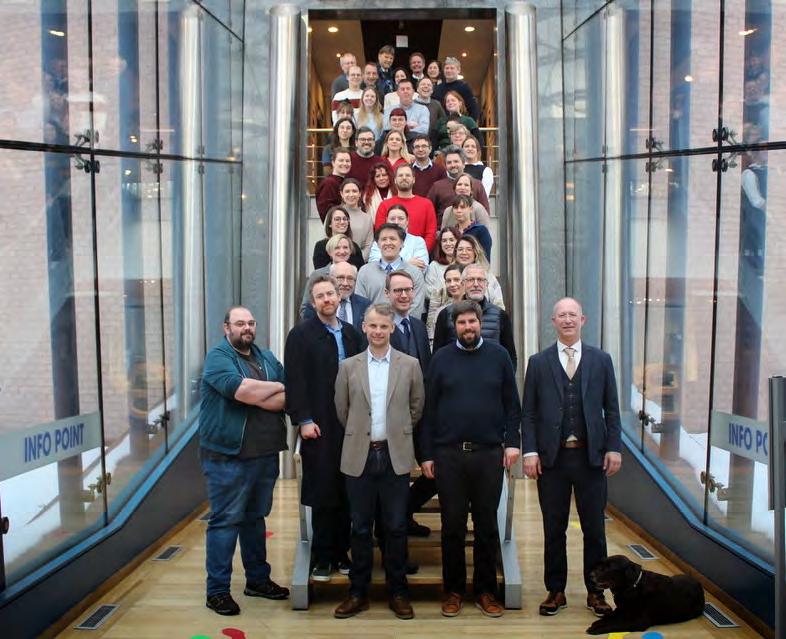
PERSONNEL
PERSONNEL MANAGEMENT
The Board is responsible for the appointment of all staff at the Institute for European Studies (IES). However, substantial ZAP appointments and tenure must be confirmed by the Academic Board of the university. Appointments of administrative staff are undertaken by daily management (the Executive CommitteeExCom).
An additional 51 people were associated with the Institute (39 as an associate fellow and 12 as a visiting fellow). 10 different job students helped with basic research tasks and administration and we welcomed 14 interns. In 2023, 4 people left the Institute, while 15 new people joined the IES staff.
The Institute is headed by a Dean, who is assisted by two vice-Deans, an Executive Director and a Head of Secretariat.
Junior academic staff members are managed by their supervisors (in the case of PhD researchers) and/or by the project coordinators (in the case of project researchers). Progress and functioning of PhD researchers on the IES budget is presented annually and scrutinised by the Board. Other PhD researchers follow the procedures of the VUB and are assessed by their respective faculties.
The management of the Secretariat falls under the authority of the Executive Director and the Head of Secretariat. Benchmarks are set for all secretariat personnel and an evaluation is conducted every year. Secretariat cluster coordinators serve as intermediaries between IES management and staff.
OVERVIEW OF PERSONNEL AT THE IES
The following people left the Institute in 2023:
• Olöf Söebech – 28 February 2023
• Sibel Top – 30 April 2023
• Serena D’Agostino – 30 September 2023
• Marie Lamensch – 30 September 2023
Three additional people became emeriti in October 2023
• Luk Van Langenhove (stays as associate)
• Tony Joris (stays as associate)
• Serge Gutwirth
Institute for European Studies Annual Report 2023 106
PERSONNEL MANAGEMENT
NEWCOMERS
• In March Sophie Hoogenboom joined the Research Centre for Digitalisation, Democracy and Innovation as a PhD Researcher.
• From April onwards, Corinna Karlsen joined the BSoG as a Project/Finance Officer
• Rita Silva Reis started in April as a Teaching and Learning Technologist.
• The Institute also welcomed Linke Marnewick as a Student Services Officer to direct and assist prospective and current students with logistical, practical and study related challenges.
• In June, the Institute welcomed Marina Sousa Ornelas as a Facility Assistant.
• In September, Mai Van Tran joined the Research Centre for Digitalisation, Democracy and Innovation as an MSCA Postdoctoral Fellow.
• Iva Dodevska joined the Migration, Diversity and Justice Researcher Centre as a Postdoctoral Researcher.
• The Centre for Security, Diplomacy and Strategy welcomed Andreea Budeanu as a Postdoctoral Researcher.
• October also saw the arrival of Marianna Lovato who joined the Centre for Security, Diplomacy and Strategy as a Postdoctoral Researcher.
• Jón Jónsson started as a PhD Researcher at the Centre for Environment, Economy and Energy.
• Max Nagel joined the BSoG as an assistant professor in the Centre for Environment, Economy and Energy as well as the Centre for Migration, Diversity and Justice. He will be co-director of the BA Global Business and Entrepreneurship programme.
The institute also attracted a number of new self-funded PhD students
• Antti Jukka
• Gabriel Heyl
• Elene Metreveli
• Lina Kirjazovaite
ADMIN STAFF
Since 2020 the IES works in close collaboration with Vesalius College (VeCo) under the name Brussels School of Governance (BSoG) as a result of which a number of synergies on secretariat level have been carried out. As such, several secretarial tasks are now done jointly. Through timesheets/functional differentiation each organisation (IES, VeCo) is built for its receptive share.
In 2023, the following people were paid on IES payroll, but shared between IES and VeCo:
• HR: Laura De Decker
• Marketing, Communication & Recruitment: Jurgen Smet, Maja Kovacevic and Charlotte
Marie Dooms
• Eduation: René Hermens, Sarah Konaté, Marleen Van Impe and Anne Sterckx
• Events: Isabelle Tenaerts
• Info: Melissa Bax
• IT: Peter Menke
• Research Project Officer: Corinna Karlsen
Conversely, the following people were paid on VeCo payroll, but worked for both institutes:
Institute for European Studies Annual Report 2023 107
PERSONNEL MANAGEMENT
• Finance: Jérôme Playoult
• Events : Marina Sousa Ornelas
• Education : Rita Silva Reis, Louise Bond*, Edgar Felix Vargas*, Vanessa Goffard, Chris Janssens*, Heidi Martin, Margherita Pace, Linke Marnewick and Xianping Su
• Marketing, Communication & Recruitment: Juan Carlos Ruiz Coll
The IES is also employing/managing the administrative staff based at UNU-CRIS in Bruges: Noël Neven, Andrew Dunn and Ajsela Masovic. Moreover, the IES admin staff also counts five coordinators embedded in one of its research centres: Jessica Callebaut, Paula Cantero Dieguez, Patrizia Cogo Morales, Tereza Maarova, Natalia Martin.
MANAGEMENT
Since 2020, management costs are also shared between the two institutes (IES/VeCo) :
• President: Karel De Gucht
• Dean: Luc Soete
• Vice Dean for Research: Alexander Mattelaer (until September 2023)
• Vice Dean for Research: Florian Trauner (since October 2023)
• Vice Dean for Education: Sven Van Kerckhoven
• Executive Director: Anthony Antoine
• Head of Secretariat: Jacintha Liem (ad interim Laura De Decker since December 2023 following maternity leave)
• Teaching programme management (LLM): Sven Van Kerckhoven
• Teaching programme management (MSc programme): Jamal Shahin
PROFESSORS AND POSTDOCTORAL RESEARCHERS
• Alexander Mattelaer
• Andreea Budeanu
• Ben Smulders
• Brendan Moore
• Caroline Buts
• Caterina Carta
• Clément Perarnaud
• Daniel Fiott
• Demir Murat Seyrek
• Dirk Arts
• Florian Trauner
• Frank Hoffmeister
• Hannah Vermaut
• Harri Kalimo
• Hielke Hijmans
• Honghui Pan
• Ilke Adam
• Ingmar Von Homeyer
• Irina Van Der Vet
• Iva Dodevska
• Jamal Shahin
• Johan Verbeke
• Jonas Lefevere
• Joris Van Hoboken
• Karel De Gucht
• Koert Debeuf
• Laura Westerveen
• Leo van Hove
• Liliana Lizarazo Rodriguez
Institute for European Studies Annual Report 2023 108
PERSONNEL MANAGEMENT
• Luis Simon
• Luk Van Langenhove
• Marianna Lovato
• Mai Van Tran
• Munira Aminova
• Marie Lamensch*
• Max Eriksson*
• Max Nagel
• Olesya Tkacheva
• Philippe De Lombaerde
• Philipp Stutz
• Raluca Csernatoni
• Sean O’Dubhghaill
• Sebastian Oberthür
• Serena D’Agostino*
• Sibel Top*
• Stefaan Van Der Jeught
• Stephan Klose
• Stijn Van der Perre
• Sven Van Kerckhoven
• Tom Willaert
• Tongfi Kim
• Tony Joris
• Trisha Meyer
• Youri Devuyst
PROJECT RESEARCHERS AND PHD STUDENTS
• Ana Fernandez Inguanzo
• Antti Jukka
• Aslak Busch
• Carlos Alejandro Entrena Serrano
• Daniel Alejo
• Elene Metreveli
• Elie Perot
• Eleanor Mateo
• Fabio Figiaconi
• Folashade Ajayi
• François Gardin
• Gabriel Heyl
• Gaia Romeo
• Gauri Khandekar
• Hanna Schneider
• Jana Gheuens
• Jihye Kang
• João Daniel Teixeira de Freitas
• Jón Jónsson
• Laura Vansina
• Lina Kirjazovaite
• Lotje Boswinkel
• Louise Hantson
• Ludmila Cieszkowsky
• Ludovica Meacci
• Maaike Verbruggen
• Marco Giuli
• Matilda Axelson
• Nadia Tjahja
• Nathalie Van Raemdonck
• Octavian Manea
• Omar Cham
• Orsolya Gulyas
• Samuel Cipers
• Samuel Johns
• Simon Happersberger
• Simon Otto
• Sophie Hoogenboom
• Tomas Wyns
• Xiu Ling Ye
Institute for European Studies Annual Report 2023 109

QUALITY ASSURANCE
QUALITY ASSURANCE
Quality control is measured ex ante as well as ex post at various levels and in different formats. In terms of attracting academic staff and administrative personnel, the IES applies the highest standards through a quality control procedure. The IES Board, the Research Council, the Education Council, and the Executive Committee safeguard the overall quality of their respective areas. In its financial management, the IES implements both internal and external control; equally in its services, the IES delivers the best possible services and tries to improve them through feedback from its clients.
QUALITY OF PERSONNEL
Quality is aimed for through competitive, open and international recruitment procedures and through a monitoring system of benchmark meetings and student feedback (for the academic staff) and performance reviews (for the administrative staff).
Selection of senior academic staff is done on the basis of interviews and selection by an independent selection committee that also includes external experts. Potential teaching staff who will be in front of a class for the first time must also give a test lecture that is assessed by both colleagues and students. Teaching staff are further assessed by the Academic Council of the university before a final appointment is made. Candidates for professorships (ZAP) also follow VUB university appointment procedures.
For research, special attention is paid to the recruitment of doctoral students. Every year, the IES makes a competitive selection in which the best projects (coupled with excellent CVs of potential researchers) are selected.
Doctoral students are primarily monitored by his/her promoter and the doctoral committee, but the (doctoral) research is also structurally embedded into one of the Institute's research centres. In addition, periodic research colloquiums are organised (mandatory for doctoral researchers), in which the researcher is subjected to peer review. In October 2023, the IES appointed Professor Caterina Carta as PhD Director, to further improve and structure the guidance provided to our PhD researchers.
In 2023, the IES launched two PhD calls: one in the field of migration and diversity policy and one in the field of the European Green Deal. After interviews with the most promising candidates by the research centre coordinators and a team of scholars and staff, eventually two PhD researchers were appointed by the IES Board and awarded a scholarship for a maximum duration of four years.
The quality of personnel is further monitored through periodical evaluations. For IES ZAP professors, individual benchmark meetings are conducted every two years with the Vice-Dean for Research. Following the appointment of a new Dean who will incorporate the functions of the vice-Dean for Research, these benchmark meetings will henceforth take place with the Dean. A new structure for these meetings is currently being processed.
PhD researchers meet their promoter and supervisory committee at least twice a year, while all other academic personnel are assessed on a yearly basis. At Secretariat level, administrative staff are evaluated through the VUB’s TEO assessment procedure. In 2023, the individual meetings took place in November.
Institute for European Studies Annual Report 2023 111
QUALITY ASSURANCE
In addition, sustainability is achieved by efforts to retain excellent staff. Attention is paid not only to the possibility of promotion, but also to flexibility alternatives (such as teleworking). In the framework of lifelong learning, a modest budget foresees support for individual or collective training sessions and/or extra courses. In addition, IES staff has access to VUB’s LRN system, which offers a variety of trainings on both soft and hard skills.
QUALITY OF RESEARCH
PhD and senior researchers are appointed after a thorough selection procedure involving an international call for applications, including external scrutiny and interviews (see above). Research progress of PhD students is monitored continuously by the promoter, the doctoral committee (twice per year), the responsible senior IES researcher, the Vice-Dean for Research, and the PhD Director, in accordance with IES PhD Guidelines (incorporated in the Guidelines for Academic Staff, which are being revised at the end of 2023). In the process of this quality control, junior researchers present a state of affairs of their findings at least once per year at research colloquiums (held biweekly). There is a close collaboration with the Doctoral School in Social Sciences, organised by the university as a whole.
QUALITY OF EDUCATION
Teaching staff are recruited through international vacancy announcements, subject to external scrutiny, interviews and trial lectures. Students annually assess the quality of the teachers / courses through feedback forms. The Dean, the Vice-Dean for Education, as well as
the Programme Directors of the respective programmes oversee the follow-up of programme questions relating to teaching, learning and the overall learning objectives of both modules and programmes. In addition, by monitoring a central database, the VUB ensures quality control when entering course descriptions, exam methodology, and student guidance.
QUALITY OF STUDENTS
The IES ensures a strict selection of students, with a high level of student intake. Student selection is monitored and analysed by Programme Directors and the respective programme boards. In addition, its educational programmes are accredited and subject to periodical VUB and student evaluations.
Students in the Advanced Master programmes, the Postgraduate programmes and in the IES Summer and Winter Schools are carefully selected, based on their study background and results, their command of English, their suitability and motivation, as well as the contact details of referees who are available for feedback on the candidate. Applicants for the Advanced Master programmes need to have a Master's degree before starting their studies at the IES. Exceptionally, highly motivated BA students are admitted, but only if they have a study background of at least 240 ECTS (which equals a Belgian Master programme).
Institute for European Studies Annual Report 2023 112
QUALITY ASSURANCE
QUALITY OF SERVICES
The IES monitors the quality of its services (events) through a combination of research centre processes, by measuring marketing efforts, and by conducting postevent evaluations. For all relevant major physical or digital activities organised at the IES, an evaluation (by form, email, or phone conversation) is done after the event to assess the quality of the service. Based on this feedback and experience, regular internal reviews are carried out where strengths and weaknesses are assessed in order to identify potential for improvement. In terms of quality and maintenance of our equipment, the technical team carries out checks prior to the event. For catering services, the IES works with ‘green’ suppliers that comply with standard hygiene and service regulations and that pay special attention to using sustainable materials. Extensive online and social media evaluations of all major activities lead to optimal analysis of the impact of events on different target groups. This monitoring process is currently assessing visibility of research, societal relevance, and knowledge transfer.
QUALITY OF FINANCES
The Finance Department is supervised by the Executive Director, who in turn reports to the IES Board. The annual accounts as well as the IES’ financial policy and processes are audited and vetted annually by external independent auditors and are ultimately also checked by the office of the Government Commissioner. Additionally, all EU funded projects that require external auditing are thoroughly reviewed and audited upon completion and prior to submitting final reporting to the relevant authorities.
Institute for European Studies Annual Report 2023 113

FINANCIAL REPORT
FINANCIAL REPORT
The Institute for European Studies is financially healthy. In 2023, its revenue increased from 5.7 million EUR to 7.2 million EUR, with a surplus of approximately 0.5 million EUR. However, this needs to be put into perspective: the accounting is presented differently than before, as advised by the auditors. While previously project surpluses were "parked" in suspense accounts, they are now recognised as income (to be subsequently recorded as project reserves). This approach required an accounting adjustment of 320K EUR, reducing the operational "profit" to 180K EUR, which is still higher than the 100K EUR forecasted in the budget.
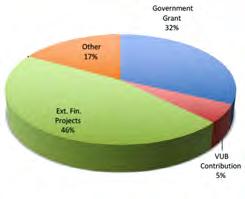
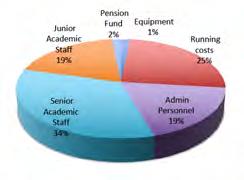
The increase in revenue is mainly due to the launch of larger projects. Compared to last year, the IES is involved in fewer projects, but they are larger in size and thus generate more financialrevenue. In 2023, the IES started a second European Research Council (ERC) project and secured a number of new Horizon Europe projects, leading to 3.2 million EUR in project revenue. This is about 1 million EUR more than last year, though it is important to note that these are "gross" figures (including overhead), while in previous years, these were presented as "net" figures in the accounts. Since 2022, a new arrangement with the Vrije Universiteit Brussel (VUB) has been in place, whereby the VUB receives a 20% overhead on externally funded projects in exchange for providing infrastructure and central services.
This change was made to clarify the amount of project funds flowing back to the VUB, a request that came from the VUB itself. Despite this, the share of external funds continues to grow, and the share of government subsidies has been reduced to 32%. In other words, for every euro invested by the government, an additional two euros are generated.
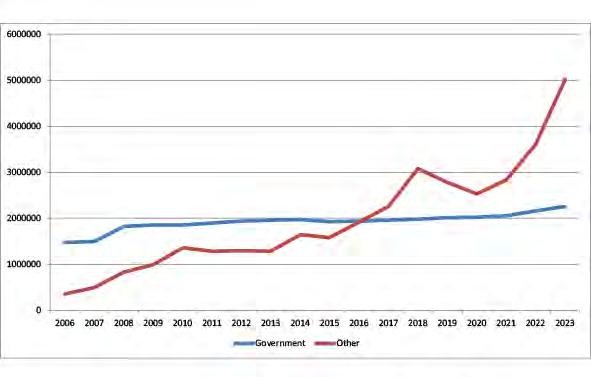
The four research centres of the IES, each receiving a portion of the subsidy, thus posted a collectively positive result. In terms of education, efforts are still aimed at achieving a break-even.
In 2023, significant efforts were made to modernize and adjust the education portfolio, aiming to attract more students in the future and potentially generate operational profit here as well. These changes will take effect in the fall of 2024, so the financial impact will not be realised until then.
Institute for European Studies Annual Report 2023 115

Institute for European Studies Annual Report 2023 116
REPORT
FINANCIAL
BOOKS
• Bauwens, J., Ginis, V., Meyer, T., Van Kerkhove, B., & Verstrynge, K. (Eds.) (2023). A Question of Truth. VUBPress.
• Bauwens, J., Ginis, V., Meyer, T., Van Kerkhove, B., & Verstrynge, K. (Eds.) (2023). Een vraag naar waarheid. ASP / VUBPRESS. https://www.aspeditions.be/en/book/een-vraag-naar-waarheid/19326
• Brekke, J-P., Trauner, F., Adam, I., Cham, O. N., Sattlecker, H., & Thorbjørnsrud, K. (2023). The role of narratives in migratory decision-making: A comparative study of Afghan transit migrants in Turkey and potential migrants in the Gambia. Barcelona Centre For International Affairs (CIDOB).
• Cha, V., & Pacheco Pardo, R. (2023). Korea: A New History of South and North. Yale University Press
• Chohan, U., & Van Kerckhoven, S. (Eds.) (2023). Activist Retail Investors and the Future of Financial Markets: Understanding YOLO Capitalism. (Routledge International Studies in Money and Banking). Routledge. https://doi.org/10.4324/9781003351085
• Coenen, J., & Soete, L. (2023). Around the Tracks: Sustainable Urban Rail Integration in Maastricht. Stichting DOC-C.
• Debeuf, K. (2023). Pourquoi ce n'est pas la dernière guerre: Sur la psychologie des conflits internationaux. Racine.
• Nagel, M. (2023). The Governance of Financialization in Latin America and East Asia: Empowering Expertise. Routlegde. https://doi.org/10.4324/9781003414858
• Pacheco Pardo, Ramon (2023). South Korea’s Grand Strategy: Making Its Own Destiny. Columbia University Press.
• Rayner, T., Szulecki, K. (Ed.), Jordan, A. J., & Oberthur, S. (2023). Handbook on European Union Climate Change Policy and Politics. Edward Elgar. https://doi.org/10.4337/9781789906981
• Schwaag Serger, S., Soete, L., & Stierna, J. (2023). The Square: Putting place-based innovation policy for sustainability at the centre of policymaking. Publications Office of the European Union. https://doi. org/10.2760/135706
• Soria Rodriguez, C. (2023). Innovación docente y renovación pedagógica en Derecho [Teaching innovation and pedagogical renewal in Law]. Especial referencia a experiencias exitosas de proyectos de innovación docente y la utilización de herramientas y metodologías colaborativas. Dykinson.
• Trauner, F., Adam, I., Cham, O. N., & Sattlecker, H. (2023). The role of narratives in migratory decisionmaking: Analysing the impact of EU-funded information campaigns in the Gambia. Barcelona Centre For International Affairs (CIDOB).
Institute for European Studies Annual Report 2023 117
PUBLICATIONS ANNEX
BOOK CHAPTERS
• Asdrubali, P., & Pasimeni, P. (2023). TRADE INTERDEPENDENCIES IN THE EU SINGLE MARKET. In The Routledge Handbook of Comparative Economic Systems (pp. 474-499). (The Routledge Handbook of Comparative Economic Systems). Taylor and Francis. https://doi.org/10.4324/9781003144366-30
• Aslan, I., Chohan, U., & Van Kerckhoven, S. (2023). Speculative Behavior and Expectations in Economic Turmoil: A Keynesian View. In Activist Retail Investors and the Future of Financial Markets: Understanding YOLO Capitalism (pp. 69-82). Routledge. https://doi.org/10.4324/9781003351085-6
• Bauwens, J., Ginis, V., Meyer, T., Van Kerkhove, B., & Verstrynge, K. (2023). A Question of Truth: Introduction. In A Question of Truth (pp. 15-18). VUBPress.
• Buts, C., & Robins, N. (2023). The Political Economy of State Aid. In The Future of EU State Aid Law: Consolidation and Expansion (pp. 19-38). EU Law Live Press.
• Cho, Y., Han, J., & Pacheco Pardo, R. (2023). Introduction: South Korean Politics after Transitions. In The Oxford Handbook of South Korean Politics (pp. 3-16). Oxford University Press
• Chohan, U., & Van Kerckhoven, S. (2023). Conclusion. In U. Chohan, & S. Van Kerckhoven (Eds.), Activist Retail Investors and the Future of Financial Markets Understanding YOLO Capitalism (pp. 215-226). Routledge.
• Chohan, U., & Van Kerckhoven, S. (2023). Introduction. In U. Chohan, & S. Van Kerckhoven (Eds.), Activist Retail Investors and the Future of Financial Markets Understanding YOLO Capitalism (pp. 1-15). Routledge.
• Cipers, S., Lefevere, J., & Meyer, T. (2023). Utilitarian truths: How much disinformation and distrust can a democracy tolerate? In A Question of Truth (pp. 138-143). ASP / VUBPRESS.
• Cipers, S., Lefevere, J., & Meyer, T. (2023). Utilitarische waarheden: hoeveel desinformatie en wantrouwen kan een democratie tolereren? In Een vraag naar waarheid (pp. 142-147). [3] ASP / VUBPRESS. https:// www.aspeditions.be/en/book/een-vraag-naar-waarheid/19326
• Erdos, K., Foray, D., & Soete, L. (2023). From innovation ecology to innovation systems: the case of clean energy innovation: past, present and possible future? . In The Square: Putting place-based innovation policy for sustainability at the centre of policymaking (pp. 152-164). Publications Office of the European Union. https://doi.org/10.2760/135706
• Fiott, D. (2023). Aftershocks: Europe after the War. In La guerra en Ucrania un año después: Impact global, europea y español (pp. 35-39). Real Instituto Elcano. https://media.realinstitutoelcano.org/wp-content/ uploads/2023/02/ruiz-molina-la-guerra-en-ucrania-un-anyo-despues.pdf
• Gardin, F., & Van Kerckhoven, S. (2023). Managing environmental threats: integrating nature-related risks into investment decisions and the financial system. In K. Balomenos, A. Fytopoulos, & P. Pardalos (Eds.), Handbook for Management of Threats: Security and Defense, Resilience and Optimal Strategies (pp. 1337). Springer.
• Gheuens, J. (2023). The European Green Deal: Shifting the EU’s gaze towards the future? In H. Dyrhauge, & K. Kurze (Eds.), Making the European Green Deal Work: EU Sustainability Policies at Home and Abroad (1 ed., pp. 15-28). Routlegde.
• Giuli, M., & Oberthur, S. (2023). The EU’s external energy governance in the age of the energy transition. In Handbook on the Geopolitics of the Energy Transition (pp. 404-419). Edward Elgar Publishing Ltd.. https:// doi.org/10.4337/9781800370432.00030
Institute for European Studies Annual Report 2023 118
ANNEX
PUBLICATIONS
• Katunga, N., Keating, C., Craffert, L., & Van Audenhove, L. (2023). Digital Inclusion Interventions for Digital Skills Education: Evaluating the Outcomes in Semi-Urban Communities in South Africa. In D. Radovanović (Ed.), Digital Literacy and Inclusion. : Stories, Platforms, Communities (pp. 177-193). Springer Nature Switzerland AG. https://doi.org/10.1007/978-3-031-30808-6
• Kleczka, M., Buts, C., & Jegers, M. (2023). Addressing the ‘Headwinds’ faced by the European Arms Industry. In T. Young (Ed.), The Economics of Defence Industry : Contemporary Prospects and Challenges (pp. 109-140). Routlegde.
• Liefferink, D., Skou Andersen, M., Gheuens, J., Tobin, P., Torney, D., & Wurzel, R. K. W. (2023). Leaders, Pioneers, and Followers in Environmental Governance. In H. Jörgens, C. Knill, & Y. Steinebach (Eds.), Routledge Handbook of Environmental Policy (1 ed., pp. 237-248). Routlegde. https://doi. org/10.4324/9781003043843-20
• Lizarazo Rodriguez, L., & Casalin, D. (Accepted/In press). Regional protection of human rights and the environment. In P. De Lombaerde (Ed.), Handbook of Regional Cooperation and Integration
• Nagel, M. (2023). Argentina. In The Governance of Financialization in Latin America and East Asia Empowering Expertise Routlegde.
https://doi.org/10.4324/9781003414858-4
• Nagel, M. (2023). Chile. In The Governance of Financialization in Latin America and East Asia Empowering Expertise Routlegde. https://doi.org/10.4324/9781003414858-3
• Nagel, M. (2023). Explaining policy divergence and policy change. In The Governance of Financialization in Latin America and East Asia Empowering Expertise Routlegde. https://doi.org/10.4324/9781003414858-2
• Nagel, M. (2023). How government–expert relations produce state agency and propel divergence. In The Governance of Financialization in Latin America and East Asia Empowering Expertise Routledge. https:// doi.org/10.4324/9781003414858-8
• Nagel, M. (2023). Japan. In The Governance of Financialization in Latin America and East Asia Empowering Expertise Routlegde. https://doi.org/10.4324/9781003414858-7
• Nagel, M. (2023). La politica dell´expertise in Asia orientale e in America Latina. Il policy-making attraverso il framing delle crisi degli economisti. In Economisti e Società: Nuove sociologie dell'expertise economica Liguori Editore.
• Nagel, M. (2023). South Korea. In The Governance of Financialization in Latin America and East Asia Empowering Expertise Routledge. https://doi.org/10.4324/9781003414858-6
• Nagel, M. (2023). State agency in times of globalization. In The Governance of Financialization in Latin America and East Asia Empowering Expertise Routledge. https://doi.org/10.4324/9781003414858-1
• Pacheco Pardo, R. (2023). EU-East Asia and EU-Korea Connectivity. In Connecting Europe and Asia: Security, Economy and Mobility (pp. 87-101). Huine.
• Pacheco Pardo, R. (2023). Foreign Policy. In The Oxford Handbook of South Korean Politics (pp. 529-545). Oxford University Press.
• Peeters, S., Willaert, T., Tuters, M., Beuls, K., Van Eecke, P., & Van Soest, J. (2023). A Fringe Mainstreamed, or Tracing Antagonistic Slang between 4chan and Breitbart before and after Trump. In R. Rogers (Ed.), How Misinformation Propagates on Social Media: A Cross-platform Analysis (pp. 165-185). Amsterdam University Press. https://www.aup.nl/en/book/9789463720762/the-propagation-of-misinformation-insocial-media
Institute for European Studies Annual Report 2023 119
ANNEX
PUBLICATIONS
• Radosevic, S., & Soete, L. (2023). Challenges of governance and the integration of the sustainability dimensions in the prioritisation and evaluation of smart specialisation strategies. In The Square: Challenges of governance and the integration of the sustainability dimensions in the prioritisation and evaluation of smart specialisation strategies (pp. 80-90). Publications Office of the European Union.
https://doi.org/10.2760/135706
• Rayner, T., Szulecki, K., Jordan, A., & Oberthur, S. (2023). The EU: towards adequate, coherent and coordinated climate action? In Handbook on European Union Climate Change Policy and Politics (pp. 384401). Edward Elgar. https://doi.org/10.4337/9781789906981.00042
• Rayner, T., Szulecki, K., Jordan, A., & Oberthür, S. (2023). The global importance of EU climate policy: An introduction. In Handbook on European Union Climate Change Policy and Politics (pp. 1-21). Edward Elgar. https://doi.org/10.4337/9781789906981.00011
• Schwaag Serger, S., Soete, L., & Stierna, J. (2023). Conclusions. In The Square: Putting place-based innovation policy for sustainability at the centre of policymaking (pp. 209-213). Publications Office of the European Union. https://doi.org/10.2760/135706
• Serger, S. S., & Soete, L. (2023). Crises as tipping points for deep transformation: time for solutions. In The Square (pp. 26-36). Publications Office of the European Union. https://doi.org/10.2760/135706
• Soete, L. (2023). Europe's higher education sustainability challenge: from prioritising mobility to creating a local sustainability ecosystem. In The Square (pp. 141-149). Publications Office of the European Union. https://doi.org/10.2760/135706
• Soria Rodriguez, C. (2023). Introducción de supuestos prácticos para la aplicación de la regulación nacional e internacional en cursos de postgrado relacionados con la seguridad alimentaria [Introduction of case studies for the application of national and international regulation in postgraduate courses related to food safety]. In Innovación docente y renovación pedagógica en Derecho. Especial referencia a experiencias exitosas de proyectos de innovación docente y la utilización de herramientas y metodologías colaborativas Dykinson.
• Soria Rodriguez, C. (2023). La determinación del tema y la formulación de la pregunta de investigación en curso de introducción a la investigación y escritura legal para trabajo de fin de máster de derecho internacional y de la Unión Europea [Determining the topic and formulating the research question in an introductory course on legal research and writing for a Master's thesis in international and European Union law]. In Nuevas herramientas metodológicas para el fortalecimiento de las competencias en Derecho. (pp. 48-61). Dykinson.
• Soria Rodriguez, C. (2023). The potential contribution of the BBNJ agreement towards a sustainable international governance of marine renewable energy technologies. In The potential contribution of the BBNJ agreement towards a sustainable international governance of marine renewable energy technologies (pp. 289-308). Brill.
• Tacea, A. (2023). The French parliamentary administration. A bureaucracy inside the Parliament? In T. CHRISRIANSEN, E. GRIGLIO, & N. LUPO (Eds.), The Routledge Handbook on Parliamentary Administrations Routlegde.
• Temizisler, S. (2023). The Mediatisation of Migration Issues During the ‘Refugee Crisis’: A Comparative Case-Study of the UK, Denmark and Germany. In M-L. Jakobson, R. King, L. Moroşanu, & R. Vetik (Eds.), Springer (pp. 207-224). (IMISCOE Research Series (IMIS)). SpringerLink. https://doi.org/10.1007/978-3031-23996-0_12
Institute for European Studies Annual Report 2023 120
PUBLICATIONS ANNEX
• Van Audenhove, L., Iordache, C., Van den Broeck, W., & Marien, I. (2023). Quick-Scan Analysis as a Method to Analyze and Compare Media Literacy Frameworks. In P. Fastrez, & N. Landry (Eds.), Media Literacy and Media Education Research Methods: A Handbook (1 ed., pp. 263-287). (Routledge Research in Media Literacy and Education). Routledge. https://doi.org/10.4324/9781003045366-17
• Van Kerckhoven, S., & O' Dubhghaill, S. (2023). Narrative Economics and YOLO Investors: r/WallStreetBets and the Gamestop Short Squeeze. In Activist Retail Investors and the Future of Financial Markets Understanding YOLO Capitalism (pp. 99-115). Routledge.
• Van Kerckhoven, S., & O' Dubhghaill, S. (2023). The last of the Britons? The impact of globalization and Brexit on the UK beer industry. In M. Patterson, & N. Hoast-Pullen (Eds.), The Geography of Beer: Policies, Perceptions, and Place (pp. 45-58). Springer.
• Willaert, T., Picone, I., & Van Raemdonck, N. (2023). Waarheid (waarheden) voorbij factchecking: de ontkrachting van misinformatie levert haar eigen wetenschappelijke beloning op. In Bauwens, Ginis, Meyer, Van Kerkhove, & Verstrynge (Eds.), Een vraag naar waarheid (pp. 154-160). VUBPress.
JOURNAL ARTICLES
• Asmar, A., Raats, T., & Van Audenhove, L. (2023). Smells Like Teen Streaming? Netflix’s Teen Originals and the Transnationalisation of a Genre. Manuscript submitted for publication.
• Asmar, A., Raats, T., & Van Audenhove, L. (2023). Storyteller to the nations? Netflix teen series and the globalization of difference. Manuscript submitted for publication.
• Asmar, A., Raats, T., & Van Audenhove, L. (2023). Streaming difference(s): Netflix and the branding of diversity . Critical Studies in Television, 18(1), 24-40. https://doi.org/10.1177/17496020221129516
• Balcaen, P., Buts, C., Du Bois, C., & Tkacheva, O. (2023). The Effect of Disinformation about COVID-19 on Consumer Confidence: Insights from a Survey Experiment. Journal of Behavioral and Experimental Economics, 102(101968), 1-10. [101968]. https://doi.org/10.1016/j.socec.2022.101968
• Balcaen, P., Du Bois, C., & Buts, C. (2023). Sharing the Burden of Hybrid Threats: Lessons from the Economics of Alliances. Defence and Peace Economics, 34(2), 142-159. https://doi.org/10.1080/1024269 4.2021.1991128
• Busch, A. V. (2023). Role Spillover: Roles’ Impacts across Contexts and the EU’s Struggle for Arctic Council Observer Status. Foreign Policy Analysis, 19(4), [orad022]. https://doi.org/10.1093/fpa/orad022
• Cham, O. N., & Adam, I. (2023). Justifying opposition and support to EU-Africa cooperation on deportation in West Africa. Governance. An International Journal of Policy, Administrations and Institutions, 1-20. https://doi.org/10.1111/gove.12846
• Cham, O. N., & Adam, I. (2023). The politicization and framing of migration in West Africa: transition to democracy as a game changer? Territory, Politics, Governance, 11(4), 638-657. https://doi.org/10.1080/21 622671.2021.1990790
• Cham, O. N., & Trauner, F. (2023). Migration information campaigns: how to analyse their impact? International Migration, 61(6), 47-57. https://doi.org/10.1111/imig.13142
• Christie, E. H., Buts, C., & Du Bois, C. (2023). Demand for Military Expenditures and Security Alignment Choices in the Indo-Pacific. Defence and Peace Economics, 34(5), 581-602. https://doi.org/10.1080/10242 694.2022.2073430
Institute for European Studies Annual Report 2023 121
ANNEX
PUBLICATIONS
• Cipers, S., Meyer, T., & Lefevere, J. (2023). Government responses to online disinformation unpacked. Internet Policy Review, 12(4). https://doi.org/10.14763/2023.4.1736
• D'Agostino, S., & Brown, N. E. (2023). Introduction: Bringing Activism Back In. Journal of Women, Politics & Policy, 44(4), 401-404. https://doi.org/10.1080/1554477X.2023.2247204Debeuf, K. (2023). To avoid war, enforce the centre. EUobserver. https://euobserver.com/opinion/156637
• D'Agostino, S., & Brown, N. E. (Eds.) (2023). SPECIAL ISSUE - Intersectional (Feminist) Activisms
Worldwide: Practices, Experiences and Critical Perspectives. Journal of Women, Politics & Policy, 44(4), 401-558. https://www.tandfonline.com/toc/wwap20/44/4
• De Cock, W., Buts, C., Cyndecka, M., & Segura, M. (2023). Review of EU Case Law on State Aid - 2022. European State Aid Law Quarterly, 22(3), 290-328. https://doi.org/10.21552/estal/2023/3/7
• De Cock, W., Kegels, G., Buts, C., & Du Bois, C. (2023). Article 346(1) TFEU and Strategic Autonomy: A Possible Loophole to Grant State Aid in the Context of Geopolitical Struggles? European State Aid Law Quarterly, 22(2), 150-160. https://doi.org/10.21552/estal/2023/2/5
• De Ville, F., Happersberger, S., & Kalimo, H. (2023). The unilateral turn in EU trade policy? The origins and characteristics of the EU’s new trade instruments. European Foreign Affairs Review, 28(Special Issue), 1534. https://kluwerlawonline.com/journalarticle/European+Foreign+Affairs+Review/28.SI/EERR2023012
• Debeuf, K. (2023). Waar blijft de bloei van de Moslimwereld? Knack Magazine. https://www.knack.be/ nieuws/geschiedenis/waarom-veel-moslimlanden-onderontwikkeld-zijn/
• Debeuf, K. (2023). What does China really want? Perhaps we could try asking. EUobserver. http://What does China really want? Perhaps we could try asking
• Debeuf, K. (2023). Why a Lack of Secularism Contributes to Underdevelopment in Many Muslim Countries. Secular Studies, 5(2), 181-186. https://doi.org/10.1163/25892525-bja10058
• Dodevska, I. (2023). Boundary integrationism and its subject: shifts and continuities in the EU framework on migrant integration. Journal of Ethnic and Migration Studies. https://doi.org/10.1080/136918 3X.2023.2247170
• Dodevska, I. (2023). The genealogy of integrationism: Ideational foundations of the politics of immigrant integration. Frontiers in Political Science, 5(2023), [1125012]. https://doi.org/10.3389/fpos.2023.1125012
• Dunne, J. P., & Becker, J. (2023). Military Spending Composition and Economic Growth. Defence and Peace Economics, 34(3), 259-271. https://doi.org/10.1080/10242694.2021.2003530
• Dupont, C., Moore, B., Boasson, E. L., Gravey, V., Jordan, A., Kivimaa, P., Kulovesi, K., Kuzemko, C., Oberthur, S., Panchuk, D., Rosamond, J., Torney, D., Tosun, J., & Von Homeyer, I. (2023). Three decades of EU climate policy: Racing toward climate neutrality? Wiley Interdisciplinary Reviews: Climate Change, 15(1), 1-12. [e863]. https://doi.org/10.1002/wcc.863
• Entsalo, H., Kalimo, H., Kautto, P., & Turunen, T. (2023). Analysing regulatory instruments in sustainability transitions: A combined ‘intervention points’ and ‘roles of law’ approach to the European Union's Ecodesign framework. Sustainable Production and Consumption, 42(November 2023), 125-137. https://doi. org/10.1016/j.spc.2023.09.013
• Ernst, M. (2023). Südkorea und die Bombe: Hintergründe der Debatte über ein indigenes Atomwaffenprogramm. SIRIUS - Zeitschrift für Strategische Analysen, 7(3), 277-284. https://doi. org/10.1515/sirius-2023-3007
• Ernst, M., & Kim, T. (2023). Smart Balancers Kill Many Birds with Few Stones: Sino-Russian Security Cooperation in the Maritime Domain. Naval War College Review, 76(2), 39-65. https://digital-commons. usnwc.edu/nwc-review/vol76/iss2/5/
Institute for European Studies Annual Report 2023 122
ANNEX
PUBLICATIONS
• Fiott, D. (2023). Cooperation in an Era of Strategic Competition: EU-NATO Relations in the Context of War and Rivalry. Norwegian Institute of International Affairs, (7).
• Fiott, D. (2023). In Every Crisis an Opportunity? European Union Integration in Defence and the War on Ukraine. Journal of European Integration, 45(3), 447-462. https://doi.org/10.1080/07036337.2023.2183395
• Fiott, D. (2023). Strategic Competition: Toward a Genuine Step-Change for Europe's Defence Industry? The Economics of Peace and Security Journal, 18(1), 7-17. https://www.epsjournal.org.uk/index.php/EPSJ/ article/view/384
• Fiott, D. (2023). The European Union and the Military Dimensions of Ukraine's Recovery. EU Military Forum, 2023(3), 25-27.
• Fiott, D. (2023). The Weight of Exceptations: The EU and the Protection of Europe. EU Military Forum, 2023(2), 22-25. https://www.eeas.europa.eu/sites/default/files/documents/2023/EUMC-Forum_3_LR.pdf
• Gheuens, J. (2023). Putting on the brakes: the shortsightedness of EU car decarbonization policies. npj Climate Action, 2(/), 1-9. [3]. https://doi.org/10.1038/s44168-023-00038-5
• Giuli, M., & Oberthur, S. (2023). Assessing the EU’s Evolving Position in Energy Geopolitics under Decarbonisation. The International Spectator, 58(3), 152-170. https://doi.org/10.1080/03932729.2023.219 9648
• Giuli, M., & Oberthur, S. (2023). Third time lucky? Reconciling EU climate and external energy policy during energy security crises. Journal of European Integration, 45(3), 395–412. https://doi.org/10.1080/07036337 .2023.2190588
• Henrard, K. (2023). Minority and Language Rights in the Eventual Peace Settlement after the RussianUkrainian War, Anniversary issue of the International Journal on Minority and Group Rights 2023, 821-853
• Henrard, K. The European Court of Human Rights and the Distribution of the Burden of Proof in Racial Discrimination Cases: The Search for Fairness Continues. ECHR Law Review 2023, Special issue: Evidence and proof in proceedings before the ECtHR: Beyond opacity, towards accountability, 426-446. https://brill. com/view/journals/eclr/aop/article-10.1163-26663236-bja10065/article-10.1163-26663236-bja10065.xml
• Huysmans, M., & Van Kerckhoven, S. (2023). The Causes and Modes of European Disintegration. Politics and Governance, 11(3), 1-94. https://doi.org/10.17645/pag.v11i3.7163
• Huysmans, M., & Van Kerckhoven, S. (2023). The Causes and Modes of European Disintegration. Politics and Governance, 11(3), 1-4. https://doi.org/10.17645/pag.v11i3.7163
• Iordache, C., Loisen, J., & Van Audenhove, L. (2023). Integrating discoverability and prominence in video-ondemand consumption choices. A qualitative user study in Belgium. International Communication Gazette. https://doi.org/10.1177/17480485231191898
• Jordan, A., & Moore, B. (2023). The durability–flexibility dialectic: The evolution of decarbonisation policies in the European Union. Journal of European Public Policy, 30(3), 425-444. https://doi.org/10.1080/1350176 3.2022.2042721
• Kim, S., & Pacheco Pardo, R. (2023). South Korea: Siding with the West and Distancing from Russia. International Politics 60, 1113-1333
• Kizilkaya, Z., Hamdi, S., & Salman, M. (2023). Has Erdoğan made Turkey a ‘subject’ in the Middle East and North Africa? Journal of Contemporary European Studies, 31(4), 1254-1273. https://doi.org/10.1080/1478 2804.2022.2153240
• Kizilkaya, Z., Hamdi, S., & Salman, M. (2023). Has Erdoğan made Turkey a ‘subject’ in the Middle East and North Africa? Journal of Contemporary European Studies, 31(4), 1254-1273. https://doi.org/10.1080/1478
2804.2022.2153240
Institute for European Studies Annual Report 2023 123
PUBLICATIONS ANNEX
• Kleczka, M., Buts, C., & Jegers, M. (2023). Six decades of consolidation in the European defence industry. Economics of Peace and Security Journal, 18(2), 5-28. http://dx.doi.org/10.15355/epsj.18.2.5
• Kleczka, M., Vandercruysse, L., Buts, C., & Du Bois, C. (2023). The Spectrum of Strategic Autonomy in EU Defence Supply Chains. Defence and Peace Economics. https://doi.org/10.1080/10242694.2023.2180588
• Klose, S., Perot, E., & Temizisler, F. S. (2023). Spot the Difference: Differentiated Co-operation and Differentiated Integration in the European Union. JCMS: Journal of Common Market Studies, 61(1), 259276. [1]. https://doi.org/10.1111/jcms.13370
• Lefevere, J. (Accepted/In press). Is there clarity in ambiguity? A literature review of party’s positional ambiguity. Party Politics, 24. https://doi.org/10.1177/13540688231151906
• Lifset, R., Kalimo, H., Jukka, A., Kautto, P., & Miettinen, M. (2023). Restoring the incentives for eco-design in extended producer responsibility: The challenges for eco-modulation. Waste Management, 168, 189-201. https://doi.org/10.1016/j.wasman.2023.05.033
• Londono van Rutten, R., Vander Vennet, N., Buts, C., & Jegers, M. (2023). Leniency Policy in Hub and Spoke Cartels. Manuscript submitted for publication.
• López Vila, E. D., Buts, C., & Jegers, M. (2023). A quantitative classification of OTC medicines regulations in 30 European countries: dispensing restrictions, distribution, pharmacy ownership, and pricing systems. Journal of pharmaceutical policy and practice, 16(1), 1-11. [19]. https://doi.org/10.1186/s40545-023-00522
• Lovato, M. (2023). Diplomats as Skilful Bricoleurs of the Digital Age: EU Foreign Policy Communications from the COREU to WhatsApp. The Hague Journal of Diplomacy, 3(1), 1-40. https://doi. org/10.1163/1871191x-bja10174
• Maes, S., Buts, C., & Jegers, M. (2023). Brewing Control: the Case of Super Bock. CoRe (Berlin. Print), 7(3), 189-192. https://doi.org/10.21552/core/2023/3/11
• Maes, S., Buts, C., & Jegers, M. (2023). Dawn Raids and Their Effect on the Stock Market. CoRe (Berlin. Print), 7(3), 145-153. https://doi.org/10.21552/core/2023/3/4
• Nikolov, P., & Pasimeni, P. (2023). Fiscal Stabilization in the United States: Lessons for Monetary Unions. Open Economies Review, 34(1), 113-153. https://doi.org/10.1007/s11079-022-09664-8
• Nzally, J. (2023). Decolonisation Discourse: Perspective on Afro-Belgians. Routed Magazine and iDiaspora, (22), 12-14. https://www.routedmagazine.com/post/decolonisation-discourse-perspective-on-afrobelgians
• O' Dubhghaill, S., & Van Kerckhoven, S. (2023). Between a Rock and a Hard Place: European disintegration, Brexit and Gibraltar, Politics and Governance, 11(3), 59-67. https://doi.org/10.17645/pag.v11i3.6777
• Oberthur, S., & Von Homeyer, I. (2023). From emissions trading to the European Green Deal: The evolution of the climate policy mix and climate policy integration in the EU. Journal of European Public Policy, 30(3), 445-468. https://doi.org/10.1080/13501763.2022.2120528
• Pacheco Pardo, R. (2023). South Korea’s Economic Security: Prospects for Greater Cooperation with India. The Journal of Indian and Asian Studies 4:2
• Pacheco Pardo, R., & Urrego Sandoval, C. (2023). Asia and Latin America Relations in the Twenty-First Century: A Review. Colombia Internacional, 3-21
• Pan, H., Qualter, P., Barreto, M., Stegen, H., & Dury, S. (2023). Loneliness in Older Migrants: Exploring the Role of Cultural Differences in Their Loneliness Experience. International Journal of Environmental Research and Public Health, 20(4), 1-21. [2785]. https://doi.org/10.3390/ijerph20042785
Institute for European Studies Annual Report 2023 124
ANNEX
PUBLICATIONS
• Perot, E. (2023). A new alliance in Europe: The September 2021 defence agreement between Greece and France as a case of embedded alliance formation. European Security , 32(4), 583-606. https://doi.org/10.1 080/09662839.2022.2162821
• Peterson, L., van Asselt, H., Hermwille, L., & Oberthur, S. (2023). What determines climate ambition? Analysing NDC enhancement with a mixed-method design. npj Climate Action, 2, 1-7. [21]. https://doi. org/10.1038/s44168-023-00051-8
• Potjomkina, D. (2023). Meta-participation in multistakeholder mechanisms: Peruvian civil society and the free trade agreement with the EU. ERLACS – European Review of Latin American and Caribbean Studies, (115), 63-84. https://doi.org/10.32992/erlacs.10832
• Radu, R., Meyer, T., Liu, J., & Levinson, N. (2023). Agency and representation in internet governance. Telecommunications Policy, 47(5), [102546]. https://doi.org/10.1016/j.telpol.2023.102546
• Roos, C., Trauner, F., & Adam, I. (2023). Bureaucratic Migration Politics in West Africa: Opportunities and Dependencies Created by EU Funding. International Migration Review, 2023, 1-23. https://doi. org/10.1177/01979183221142775
• Rothe, F-F., Audenhove, L. V., & Loisen, J. (2023). Digital development, inequalities & the Sustainable Development Goals: what does ‘Leave No-One Behind’ mean for ICT4D? Information Technology for Development, 29(1), 9-26. https://doi.org/10.1080/02681102.2022.2076640
• Shenk, M., Van Kerckhoven, S., & Weinberger, J. (2023). The Crown, the Market and the DAO. Stanford Journal of Blockchain Law & Policy, 6(2), 244-264. https://stanford-jblp.pubpub.org/pub/crown-marketand-dao/release/1
• Silvestre, S. (2023). Negotiations in the Council of the EU under a new institutional setting:the case of the asylum policy. Journal of Contemporary European Studies, 31(2), 487-499. https://doi.org/10.1080/147828 04.2021.2022463
• Simón, L., & Ernst, M. (2023). Competition with China and U.S. defence strategy: from net assessment to competitive strategies. Defence Studies, 23(3), 359-380. https://doi.org/10.1080/14702436.2023.2238616
• Soete, L. (2023). FAIR use in Artificial Intelligence? Access to data for the benefit of all. Frontiers Policy Lab. https://policylabs.frontiersin.org/content/commentary-fair-use-in-artificial-intelligence-access-to-data-forthe-benefit-of-all
• Soete, L., & Burgelman, J-C. (2023). Reconciling Open Science with Technological Sovereignty: Can the European Union do it? Journal of Open Access to Law, 11(1), 1-15. https://doi.org/10.3316/ agispt.20230926095827
• Soete, L., & Kerckhoven, S. V. (2023). Deglobalisation and competiton policy: the challenge to European economic integration. Network Law Review.
• Soete, L., & Stierna, J. (2023). Transformative industrial policy in Europe through a Schumpeterian “looking glass”: Capitalism, sustainability and democracy? . Frontiers Policy Lab. https://policylabs.frontiersin.org/ content/commentary-transformative-industrial-policy-in-europe-through-a-schumpeterian-looking-glasscapitalism-sustainability-and-democracy
• Song, H., Buts, C., & Jegers, M. (2023). The Middle-Income Trap and competition policy: an institutional analysis. Asian Journal of Law and Economics, 14(2), 135-161. https://doi.org/10.1515/ajle-2022-0102
• Soria Rodriguez, C. (2023). La evaluación del impacto ambiental en el esperado acuerdo para la gobernanza de la biodiversidad marina fuera de la jurisdicción nacional y su previsible aplicación a las tecnologías para la obtención de energía renovable marina. Colombian Yearbook of International Law, 16, 1-30. https://doi.org/10.12804/revistas.urosario.edu.co/acdi/a.11715
Institute for European Studies Annual Report 2023 125
ANNEX
PUBLICATIONS
• Stutz, P. (2023). Political opportunities, not migration flows: why the EU cooperates more broadly on migration with some neighbouring states. Journal of Ethnic and Migration Studies, 49(12), 3101-3120. https://doi.org/10.1080/1369183X.2023.2193716
• Tacea, A., & Iancu, A. (2023). LE SEMI-PRÉSIDENTIALISME DANS LES RÉGIMES POST-SOVIÉTIQUES: TRIOMPHE ET RÉGRESSION DÉMOCRATIQUE. Pouvoirs, 184(1), 107-120. https://doi.org/10.3917/ pouv.184.0107
• Tacea, A., & Trauner, F. (2023). The European and national parliaments in the Area of Freedom, Security and Justice: do more interparliamentary fora lead to stronger cooperation? Journal of Legislative Studies, 29(4), 519-537. https://doi.org/10.1080/13572334.2021.2015559
• Tuters, M., Willaert, T., & Meyer, T. (2023). How Science Gets Drawn Into Global Conspiracy Narratives. Issues in Science and Technology, 39(3), 32-36. https://doi.org/10.58875/POZR1536
• Van Der Jeught, S. (2023). Taaltoets voor Turkse gezinshereniging: het Hof verduidelijkt zijn rechtspraak. Sociaal‐Economische Wetgeving: Tijdschrift voor Europees en Economisch Recht, 2023(5), 251-255.
• Van Der Jeught, S. (2023). Wettelijke verplichting om hoger onderwijs in de officiële taal te verstrekken: het Europees Hof van Justitie slaat en zalft. Sociaal‐Economische Wetgeving: Tijdschrift voor Europees en Economisch Recht, 2023(2), 98-101.
• Van Dijk, L., & Lefevere, J. (2023). Can the use of minipublics backfire? Examining how policy adoption shapes the effect of minipublics on political support among the general public. European Journal of Political Research, 62(1), 135-155. https://doi.org/10.1111/1475-6765.12523
• Van Droogenbroeck, E., & Van Hove, L. (2023). The payments divide: a challenge for the future. Bank- en Financiewezen, 87(8), 1-14.
• Van Hove, L. (2023). Online grocery shopping in Germany: assessing the impact of COVID-19. A comment on Gruntkowski and Martinez. Journal of Theoretical and Applied Electronic Commerce Research, 18(4), 2233-2237. https://doi.org/10.3390/jtaer18040112
• Van Hove, L. (2023). Survey-based measurement of the adoption of grocery delivery services: a commentary. Transportation Research Part A: Policy and Practice, 176, [103798]. https://doi.org/10.1016/j. tra.2023.103798
• Vandercruysse, L., Du Bois, C., & Buts, C. (2023). Governing Defense Procurement: Strengthening the EU’s Defense Technological & Industrial Base. Economics of Peace and Security Journal, 18(1), 35-52. https:// doi.org/10.15355/epsj.18.1.35
• Veeckman, C., Claes, S., Van Audenhove, L., & Van Der Graaf, S. (2023). A framework for making citizen science inclusive with storytelling methods. Frontiers in Environmental Science, 11, 1-12. [1211213]. https://doi.org/10.3389/fenvs.2023.1211213
• Vermeire, L., Van den Broeck, W., Petersen, F., Van Audenhove, L., & Marien, I. (2023). Practice makes Perfect? Digital youth work in Flanders-Belgium. Youth & Policy. https://www.youthandpolicy.org/articles/ practice-makes-perfect/
• Willaert, T. (2023). A computational analysis of Telegram's narrative affordances. PLoS ONE, 18(11), 1-23. [e0293508]. https://doi.org/10.1371/journal.pone.0293508
• Wouters, R., & Lefevere, J. (Accepted/In press). Making their mark? How protest sparks, surfs and sustains media issue attention. Political Communication.
• Xu, L. (2023). The Evolution of China’s Foreign Talent Policy: the Case Study of Beijing. Chinese Political Science Review.
https://doi.org/10.1007/s41111-023-00239-7
Institute for European Studies Annual Report 2023 126
ANNEX
PUBLICATIONS
VULGARISING
• Fiott, D. (2023). Europe’s Geopolitical Coming of Age Requires Greater Defense Efforts. Internationale Politik Quarterly, 1-4. https://ip-quarterly.com/en/europes-geopolitical-coming-age-requires-greaterdefense-efforts
• Giuli, M. (2023). Verso un IRA europeo? Energia. https://rienergia.staffettaonline.com/articolo/35143/ Verso+un+IRA+europeo/Giuli
• Lumet, S., & Perot, E. (2023). Europe’s Geopolitical Necessity. Internationale Politik Quarterly. https://ipquarterly.com/en/europes-geopolitical-necessity
• Trauner, F., Adam, I., & Cham, O. N. (2023). Why information campaigns struggle to dissuade migrants from coming to Europe. BRIDGES Blog.
UNPUBLISHED PAPERS
• Cipers, S., Meyer, T., & Lefevere, J. (2023). Government responses to disinformation: a review. Paper presented at ECPR General Conference 2023, Prague, Czech Republic.
• Lefevere, J., & Meyer, T. (2023). When politicians spread disinformation on social media, do citizens believe it? Evidence from two experiments. Paper presented at ECPR General Conference 2023, Prague, Czech Republic.
• Meyer, T., & Vetulani-Cęgiel, A. (2023). Transparency as an empty signifier? Assessing the discursive use of transparency in EU and online platform initiatives on political actors and advertising. Paper presented at ECPR General Conference 2023, Prague, Czech Republic.
• Tjahja, N. (2023). YOUthDIG participation on regional and global level: The dynamics of meaningful youth participation. Unpublished. In 2023 GigaNet Annual Symposium (pp. 1-21). Global Internet Governance Academic Network. https://www.giga-net.org/wp-content/uploads/2023/10/IGF-2023_-YOUthDIGparticipation-on-regional-and-global-level-The-dynamics-of-meaningful-youth-participation.pdf
• Van Audenhove, L., Vermeire, L., Van den Broeck, W., & Demeulenaere, A. (2023). Data Literacy. How data literate is the new DigComp 2.2 framework. Paper presented at NordMedia 2023, Bergen, Norway.
• Van Eecke, P., Verheyen, L., Willaert, T., & Beuls, K. (2023). The Candide model: How narratives emerge where observations meet beliefs. In N. Akoury, E. Clark, M. Iyyer, S. Chaturvedi, F. Brahman, & K. R. Chandu (Eds.), Proceedings of the The 5th Workshop on Narrative Understanding (pp. 48-57). (Proceedings of the Annual Meeting of the Association for Computational Linguistics). Association for Computational Linguistics. https://aclanthology.org/2023.wnu-1.7.pdf
Institute for European Studies Annual Report 2023 127
PUBLICATIONS ANNEX
POLICY REPORTS
• Dixson-Declève, S., Dunlop, K., Renda, A., Charveriat, C., Balland, P-A., Isaksson, D., Martins, F., Mir Roca, M., Pedersen, G., Schwaag Serger, S., Soete, L., Stres, Š., Gołębiowska-Tataj, D., Walz, R., Curaj, A., & Huang, A. (2023). Research and Innovation to Thrive in the Poly-Crisis Age: What do we need from the next Framework Programme and the Missions? Publications Office of the European Union. https://doi. org/10.2777/92915
• Dixson-Declève, S., Renda, A., Schwaag Serger, S., Soete, L., Walz, R., Christofilopoulos, E., & Balland, P-A. (2023). Research, innovation, and technology policy in times of geopolitical competition, Publications Office of the European Union. https://doi.org/https://data.europa.eu/doi/10.2777/745596, https://doi.org/ DOI 10.2777/745596
• Fiott, D. (2023). Annus Horribilis: Russia’s War, Ukraine’s Struggle, Europe’s Future. CSDS Policy Brief, (6). https://csds.vub.be/annus-horribilis-russias-war-ukraines-struggle-europes-future
• Fiott, D. (2023). Counter-order: Chinese Power, the West and Geo-economics. CSDS Policy Brief, (12).
• Fiott, D. (2023). Defence Matters: Ten Years of European Defence and What Has Really Been Achieved? CSDS Policy Brief, 2023(32). https://csds.vub.be/publication/defence-matters-ten-years-of-europeandefence-and-what-has-really-been-achieved/
• Fiott, D. (2023). Disorder: the War and Russia’s Economic Statecraft. CSDS Policy Brief, (13). https://csds. vub.be/disorder-the-war-and-russias-economic-statecraft
• Fiott, D. (2023). In Orbit: The European Union, Defence and Space Domain Awareness. CSDS Policy Brief, 2023(22), 1-4. https://csds.vub.be/in-orbit-the-european-union-defence-and-space-domain-awareness
• Fiott, D. (2023). NATO and the Current Security Context. IDN Brief, 2023(2023), 7-8. https://www.idn.gov.pt/ pt/publicacoes/idnbrief/Paginas/IDN_Brief_julho_2023_2.aspx
• Fiott, D. (2023). Order: the Financing of Alliances and Western Power. CSDS Policy Brief, 2023(11).
• Fiott, D. (2023). Purchasing Power: Towards Joint Procurement and Planning in European Defence? CSDS Policy Brief, 2023(24), 1-5. https://csds.vub.be/purchasing-power-towards-joint-procurement-and-planningin-european-defence
• Fiott, D., & Simón, L. (2023). EU Defence After Versailles: An Agenda for the Future. (PE702.604 ed.) European Parliament.
• Fiott, D., & Tercovich, G. (2023). Qualified Majority Voting in EU Foreign Policy: A Cost of non-Europe Report. European Parliament.
• Fiott, D., & Tercovich, G. (2023). Votes, Vetoes, Values: Foreign Interference, QMV and EU Foreign Policy in a Competitive Age. CSDS Policy Brief, 2023(21), 1-4. https://csds.vub.be/votes-vetoes-values-foreigninterference-qmv-and-eu-foreign-policy-in-a-competitive-age
• Fiott, D., Fägersten, B., & Kleberg, C. (2023). Navigating the Euro-Atlantic Defence Innovation Landscape. Politea. https://media.politea.se/2023/03/Politea-Defence-Innovation-Report.pdf
• Fiott, D., Simón, L., & Manea, O. (2023). Two Fronts, One Goal: Euro-Atlantic Security in the Indo-Pacific Age. The Marathon Initiative.
• Hantson, L., Westerveen, L., & Adam, I. (2023). Country report on social relations, individual attitudes and migrant integration experiences – Belgium. Fondazione Collegio Carlo Alberto. https://whole-comm. eu/working-papers/country-report-on-social-relations-individual-attitudes-and-migrant-integrationexperiences-belgium/
Institute for European Studies Annual Report 2023 128
ANNEX
PUBLICATIONS
• Kumar, P., von Lüpke, H., Åhman, M., Otto, S., Flückiger, S., & Ekdahl, Å. (2023). Piloting the Climate Club in the Steel Sector: Focus on the Quick Wins, Create a Safe Space for Dialogue. EPICO KlimaInnovation (Energy and Climate Policy and Innovation Council e. V.).
• Lefevere, J., Meyer, T., Wiard, V., Patriarche, G., & Schmit, S. (2023). Exposure to and belief in disinformation: A comparative study of Belgium and Luxembourg. EDMO BELUX: BE-LUX Research Hub on Digital Media and Disinformation.
• Mattelaer, A. (2023). Bleak prospects for nuclear disarmament. (Egmont Policy Brief; No. 320). Egmont - Royal Institute for International Relations. https://www.egmontinstitute.be/app/uploads/2023/10/ Alexander-Mattelaer_Policy_Brief_320_vFinal.pdf?type=pdf
• Mattelaer, A. (2023). Upgrading the Belgian Contribution to NATO’s Collective Defence. (Egmont Policy Briefs; No. 312). Egmont - Royal Institute for International Relations. https://www.egmontinstitute.be/app/ uploads/2023/07/Alexander-Mattelaer_Policy_Brief_312_vFinal.pdf
• Otto, S., & Oberthur, S. (2023). Advancing international cooperation for the decarbonisation of energyintensive industries: the G7 Climate Club and beyond. NDC Aspects Policy Brief, (3). http://www.ndcaspects.eu/sites/default/files/2023-05/Global%20Governance%20of%20EIIs%20-%20Sectoral%20 Policy%20Paper%20FINAL.pdf
• Otto, S., Oberthur, S., Annika Tönjes, Lauri Peterson, Hilton Trollip, & Saritha Vishwanathan (2023). Sectoral Analysis of Energy-Intensive Industries. NDC ASPECTS. http://ndc-aspects.eu/sites/default/files/2023-10/ D4.3a%20Sectoral%20Analysis%20of%20EIIs.pdf
• Perot, E. (2023). Principles and Commitments: What Could an Agreement to Guarantee Ukraine’s Security Look Like? CSDS Policy Brief, 1-5. https://prod-b4156475194d8706-vub.paddlecms.net/sites/default/ files/2023-06/CSDS%20Policy%20brief_2320.pdf
• Rigotti, C., El Dekmak, N., Zomignani Barboza, J., & De Hert, P. (Ed.) (2023). HEROES Deliverable 4.2 Legal and ethical issues about the use of Special Investigative Methods to fight CSAM/CSEM. Universidad Complutense de Madrid.
• Tercovich, G. (2023). Narratives and Interests: the EU’s Position on Taiwan Before and After the War on Ukraine. CSDS Policy Brief, 2023(17), 1-4. https://csds.vub.be/narratives-and-interests-the-eus-position-ontaiwan-before-and-after-the-war-on-ukraine
• Verhaert, P., Van Audenhove, L., Anrijs, S., & Ponnet, K. (2023). Digitale inclusie op lokaal niveau: Inzichten uit vijf Europese landen: Wetenschappelijke monitoring en onderzoek in het kader van het actieplan ‘Iedereen Digitaal’. imec-SMIT, Vrije Universiteit Brussel.
• Verstraete, W. (2023). On the Necessity of Defending Belgian Interests in Outer Space. Egmont Policy Brief, (302). https://www.egmontinstitute.be/app/uploads/2023/04/Wannes-Verstraete_Policy_Brief_302. pdf?type=pdf
• Zomignani Barboza, J., Van Baelen, A., D'Agostino, S., Ellyne, E., Van Erdeghem, R., Van Vooren, E., Briere, C., Navasartian, A., Vrancken, M., & De Hert, P. (2023). FRANET SR77 National Contribution to the Fundamental Rights Report 2023 (Belgium). European Union Fundamental Rights Agency. https://fra. europa.eu/sites/default/files/fra_uploads/frr_2023_belgium_en.pdf
Institute for European Studies Annual Report 2023 129
PUBLICATIONS ANNEX
OTHER CONTRIBUTIONS
• Fahlbusch, M., Wood, B. (Ed.), & Lizarazo Rodriguez, L. (Ed.) (2023, Sep). IANSA and IPIS Fact Sheet: Due Diligence Responsibilities of Businesses Involved in Small Arms and Light Weapons. https://iansa. org/fact-sheet-due-diligence-responsibilities-of-businesses-involved-in-small-arms-and-light-weaponsseptember-2023/
• Perot, E., & Manea, O. (2023, Oct 30). At NATO, we are focusing once again on collective defence. Centre for Security, Diplomacy and Strategy (CSDS). https://prod-b4156475194d8706-vub.paddlecms.net/sites/ default/files/2023-10/CSDS-SWJ%20Strategic%20Debrief-Elie%2C%20Octavian-Part%202.pdf
• Perot, E., & Manea, O. (2023, Oct 30). In war, mud and blood are still there. Centre for Security, Diplomacy and Strategy (CSDS). https://prod-b4156475194d8706-vub.paddlecms.net/sites/default/files/2023-10/ CSDS-SWJ%20Strategic%20Debrief-Elie%2C%20Octavian-Part%201.pdf
• Tjahja, N., & Fonseca, C. (2023). Youth Participation at the Internet Governance Forum. United Nations University Institute on Comparative Regional Integration Studies. https://cris.unu.edu/youth-participationinternet-governance-forum
Institute for European Studies Annual Report 2023 130
PUBLICATIONS ANNEX

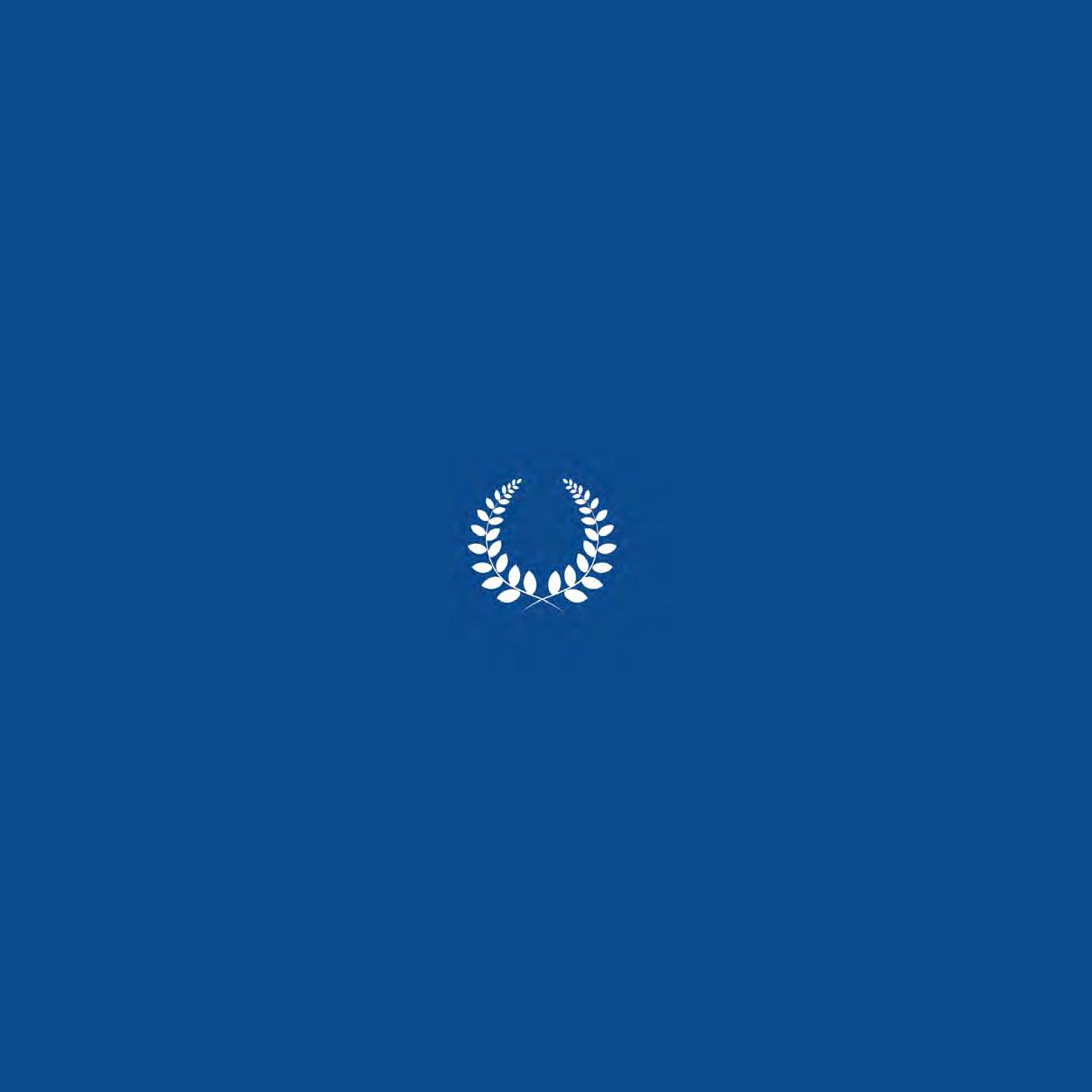
Institute for European Studies
Activity Report Published by: Prof. Karel De Gucht, IES President Compiled and edited by Anthony Antoine, Jurgen Smet and Maja Kovacevic With the kind assistance of all the researchers and secretariat staff at the IES. All pictures courtesy of IES and VUB.
2023





 Karel De Gucht President
Karel De Gucht President



























































































